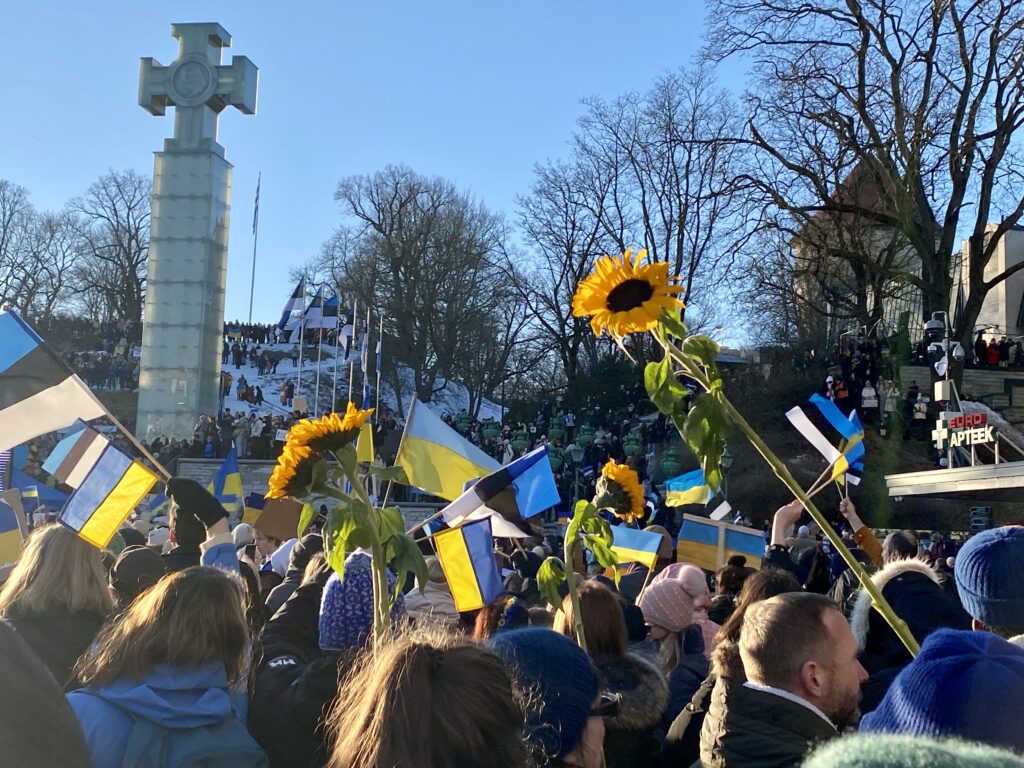28 February 2022 – Estonian military intelligence: Russian soldiers may have a morale problem
A report by the Estonian military intelligence says there are signs of possible morale problems among the Russian soldiers attacking Ukraine; the Russian military has also added Chechen forces into its ranks.
“In addition to the regulars, also the Russian National Guard, including Chechens, are taking part in the invasion,” the report says. “Even though the losses aren’t too big (about 5%), the number of the captured is signific, which points to the possible morale problems on the Russian side. Among the prisoners of war [taken by the Ukrainians], there are senior officers, parachute troops and Spetsnaz fighters [Russian special forces – editor). The situation knowledge of the regulars and junior officers is limited.”
28 February 2022 – Estonian reserve officer: Belarusian forces are moving near the Ukrainian border
A member of the Estonian parliament and a reserve officer in the Estonian Defence Forces, Leo Kunnas (EKRE) told Postimees that the Belarusian forces were moving around in the country’s western part, which raises the question whether the Belarusian military is planning to cross the Ukrainian border and start fighting.
“In the western part of the Belarusian border, near Brest, there’s been a large motorcade of trucks and armored vehicles moving towards Volyn, meaning Ukraine. I counted 45 vehicles, they all belong to the Belarusian 38th Airborne Brigade. The question is whether the Belarusian military is going to cross the Ukrainian border or not,” Kunnas told the Estonian newspaper.
He added that should Belarus fully engage in the war on the Russian side would be very dangerous as it would jeopardise the Western aid to Ukraine.
28 February 2022 – Eight EU presidents urge for Ukraine’s swift candidacy in the EU
The presidents of eight European Union states – Bulgaria, the Czech Republic, Estonia, Latvia, Lithuania, Poland, Slovakia and Slovenia have compiled an open letter where they say they “strongly believe that Ukraine deserves receiving an immediate EU accession perspective”.
“Therefore, we call on the EU member states to consolidate highest political support to Ukraine and enable the EU institutions to conduct steps to immediately grant Ukraine an EU candidate country status and open the process of negotiations.“In this critical moment, we reiterate our full solidarity with Ukraine and its people.”
28 February 2022 – Ilves: Don’t assume you know Russia better than the Baltics do
28 February 2022 – The first Ukrainian war refugees have arrived in Estonia
Nearly 100 people fleeing the war in Ukraine arrived in Estonia today, in buses organised by the Estonian Refugee Council in cooperation with private companies. Many of them came to Estonia to stay with their relatives or acquaintances, and those who have no accommodation have been accommodated in different hostels for the first nights, in cooperation with the city of Tallinn.
According to the Estonian interior minister, Kristian Jaani, the Police and Border Guard Board has been communicating and advising around 270 Ukrainian citizens who have entered Estonia in the past two days. “Among them are Ukrainians already living in Estonia, Ukrainians transiting through Estonia, as well as war refugees who want to stay here temporarily,” Jaani said in a statement.
The Estonian Social Insurance Board provides round-the-clock psychosocial support to those who arrive in Estonia from Ukraine. The accommodation of the first arrivals will be paid for by the city of Tallinn as a provider of emergency social assistance.
Estonia has automatically extended all existing work visas for Ukraine residents and entry to Estonia is also visa-free for all the Ukrainian citizens, including those without biometric passports.
28 February 2022 – Estonia’s parliament speaker: EU perspective and NATO door must remain open to Ukraine
Jüri Ratas, a former prime minister of Estonia and currently the parliament speaker, met with the speakers of Latvia, Lithuania and Sweden in Riga today. Ratas said the NATO door and the membership perspective of the European Union had to remain open to Ukraine.
“The admission decision will not be dictated by any non-member no matter how aggressive. Ukraine will be free to choose its own path,” Ratas stated. “The Ukrainians showed their resolve already back in 2014 and they have done a great job in reforming the society in the last eight years. These efforts should be taken into account in the perspective of the future membership”.
Ratas added that Russia’s aggression against a sovereign state reminded the last century, when the Soviet Union used the same tactic in November 1939, attacking Finland. “Stalin lost the war back then and Putin will also lose it,” he said.
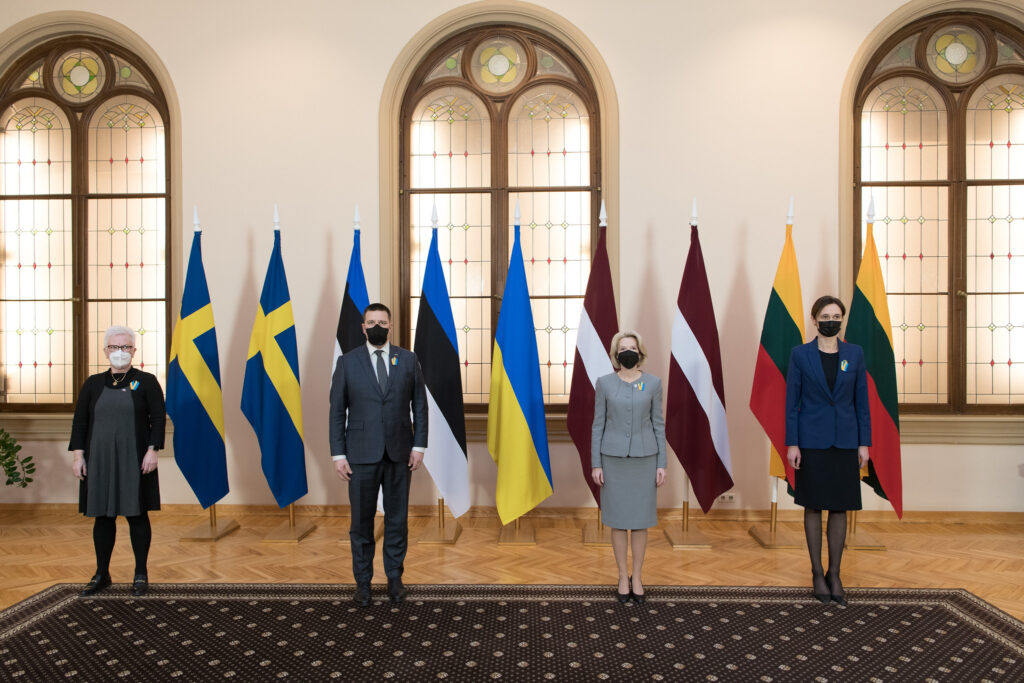
28 February 2022 – Estonia suspends cultural cooperation with Russia
The Estonian culture ministry announced it will not sign a cultural cooperation programme between Estonia and Russia for the next three years.
“Relations between Estonia and Russia have been difficult throughout the years, but cultural exchanges have been important for us. The war in Ukraine has hit cultural cooperation very hard. We understand that the entire cultural sector is suffering on both the Estonian and the Russian side, but the world community will not tolerate violations of international law, attacks on the territorial integrity and sovereignty of another state,” the Estonian culture minister, Tiit Terik, said in a statement.
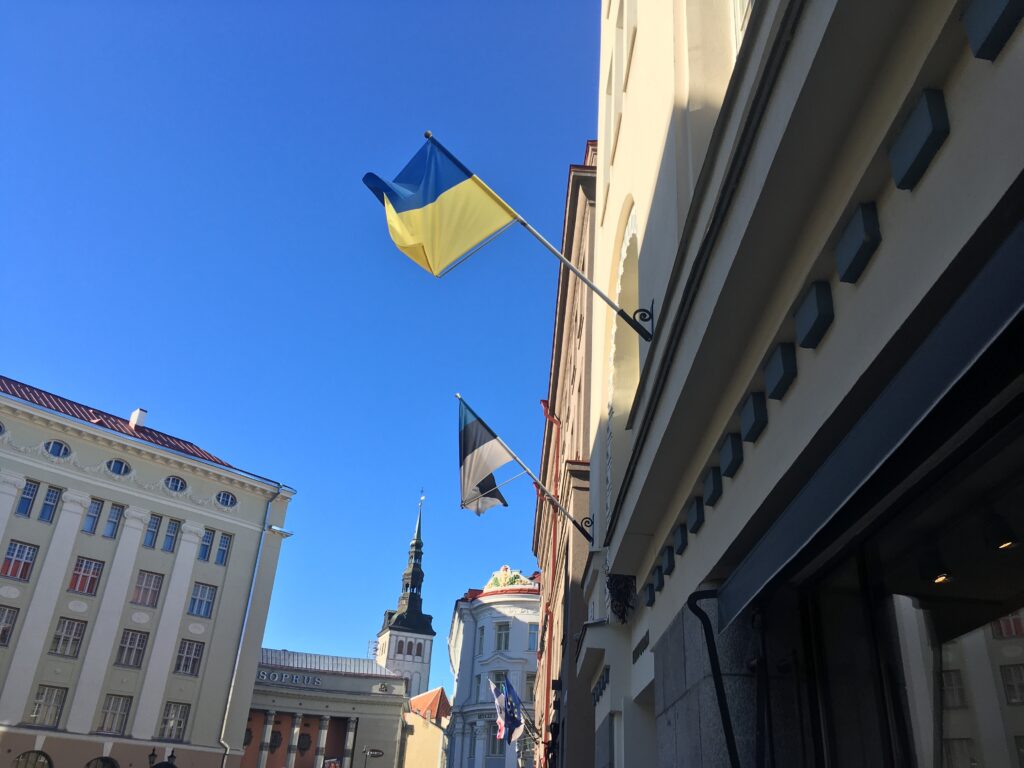
28 February 2022 – Telecom operators suspend 12 Russian TV-channels in Estonia
Estonian branches of Elisa and Telia, Finnish and Swedish telecommunications companies, respectively, will suspend transmitting the Russian-language channels PBK Eesti, Dom Kino Baltic, Karusel, Muzõka Pervogo, Vremja, Telekafe, Bobjor, Dom Kino Premium, О!, Pojehali! and REN TV, the organisations announced on Monday. Telia will also suspend the transmission of CTC Media.
The telecom operators said the suspension follows a letter of formal notice from the Estonian Financial Intelligence Unit to all TV service providers, according to which the transmission of the channels and business activities with the channel owners may be in breach of the imposed EU sanctions on Russia.
28 February 2022 – The NATO secretary general, Jens Stoltenberg, and the British prime minister, Boris Johnson, to visit Estonia on Tuesday
The NATO secretary general, Jens Stoltenberg will travel to Poland and Estonia on Tuesday, NATO announced. Stoltenberg will visit the Tapa military base in Estonia and will meet the Estonian prime minister Kaja Kallas and the country’s president, Alar Karis.
The prime minister of the UK, Boris Johnson, will also visit Poland and Estonia on Tuesday, according to the BBC. The leading country of the NATO battlegroup in Estonia is the UK that committed more troops to Estonia, following Russia’s aggression and subsequent invasion of Ukraine. A military convoy with six Challenger main battle tanks and other armoured vehicles from the Royal Welsh Regiment arrived in Tapa on 25 February.
In December 2019, Johnson made his first foreign visit as his country’s duly elected head of the government to Estonia.
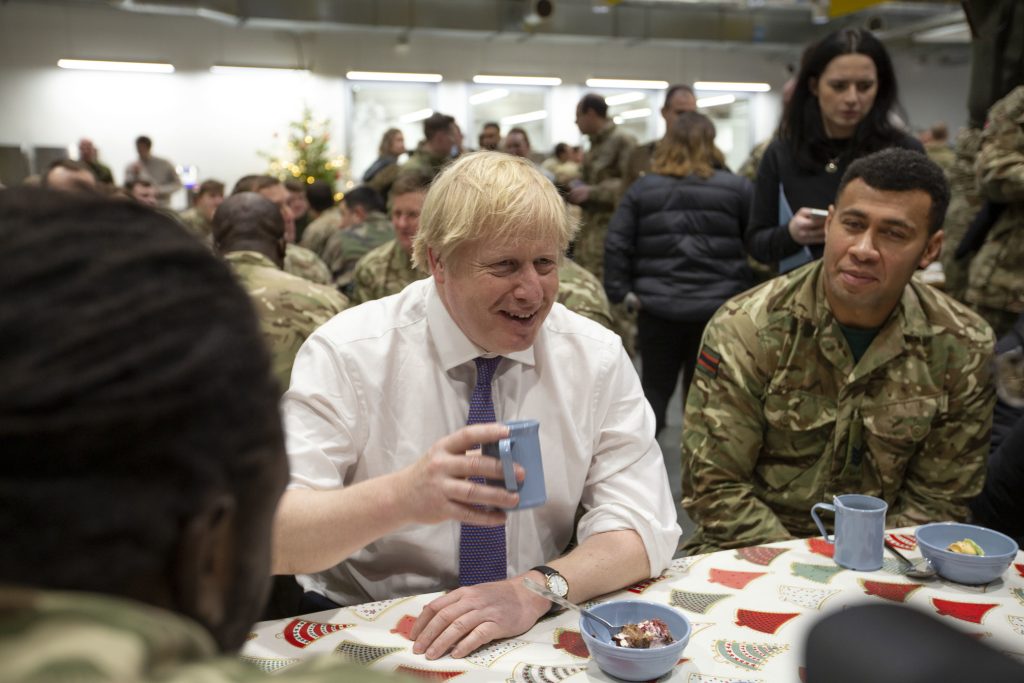
28 February 2022 – Estonian NGOs are helping Ukrainians
Several Estonian NGOs are helping the Ukrainians in the conflict areas as well as transporting the Ukrainian refugees to Estonia; Estonian World gives an overview of the organisations.
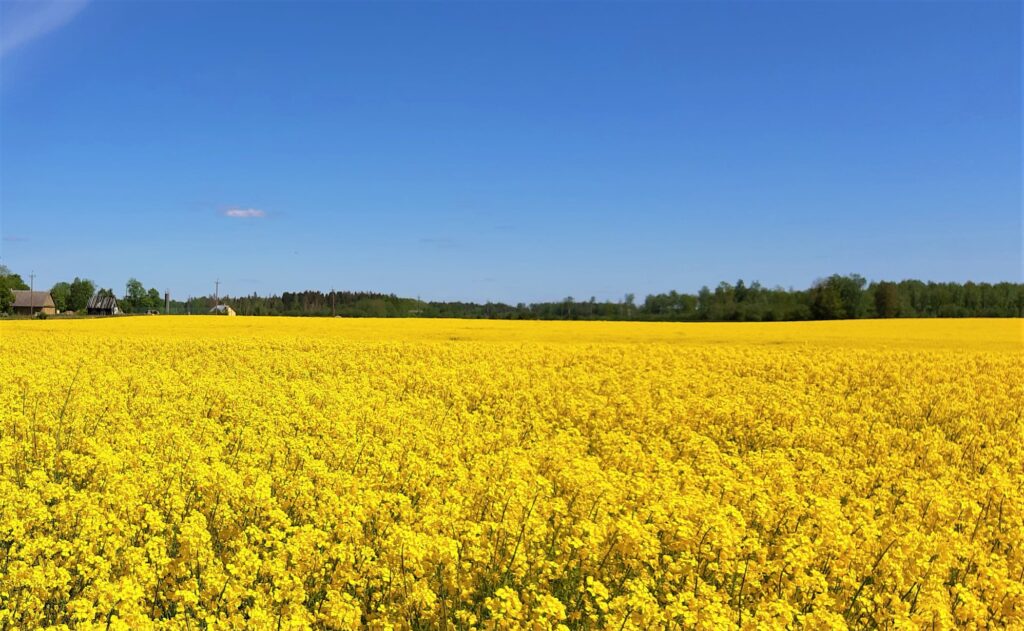
28 February 2022 – Estonia to help Ukraine with anti-tank mines
Estonia will send Ukraine anti-tank mines, to help the country’s defences against the ongoing Russian invasion, the permanent secretary of the Estonian defence ministry, Kusti Salm, said at a press briefing in Tallinn this afternoon.
Salm also noted that many Estonian enterprises had initiated private donations to Ukraine – including the country’s Red Cross as well as its armed forces. Magnum Medical, an Estonian pharmaceutical wholesaler, is donating medical supplies worth a million euros to Ukraine.
27 February 2022 – Estonian foreign intelligence chief: Putin badly miscalculated
Mikk Marran, the chief of the Estonian Foreign Intelligence Service, told Eesti Ekspress, a weekly newspaper that the Russian president, Vladimir Putin, badly miscalculated his war against Ukraine. “Putin underestimated the defensive capability of the Ukrainian nation and armed forces, and underestimated also his own nation’s reactions. I assume Putin planned a 48-hour shock-and-awe-type war after which the Ukrainian leadership would collapse,” he told the newspaper.
“Putin hasn’t fulfilled his goals and is probably in a very frustrated state. Right now they’re probably replanning, they’ll send new units to the front line and then we’ll see a new effort towards Kyiv. They’ll also continue intensive war effort towards Kharkiv and Kherson. There’s a danger that Putin, wishing to revitalise his attack, will deploy even bigger forces, including additional firepower, and will be avoiding attacking civilian objects even less than until now.”
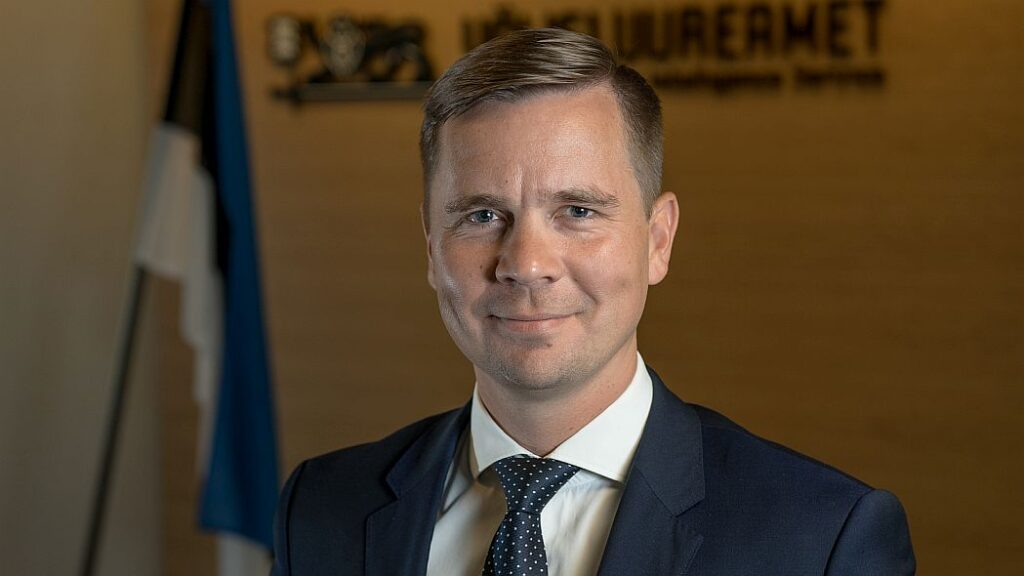
27 February 2022 – Putin orders Russia’s nuclear forces on high alert
The Russian president, Vladimir Putin, has ordered his country’s deterrence forces – which includes nuclear arms – be placed on high alert.
“Top officials in leading NATO countries have allowed themselves to make aggressive comments about our country, therefore I hereby order the minister of defense and the chief of the General Staff [of the RF Armed Forces] to place the Russian Army Deterrence Force on combat alert,” Putin said in televised meeting with defense minister Sergei Shoigu and chief of the General Staff of the Russian Armed Forces Valery Gerasimov.
In addition, Belarus is holding a referendum today on the question on whether Russia could position its nuclear weapons on the Belarusian territory.
According to Lt Col Margo Grosberg, the chief of intelligence at the Estonian Defence Forces, Putin uses nuclear weapons as a show of deterrence for the West and NATO. “I don’t think this conflict will become a nuclear war, but this playing with the nukes and emphasizing them, also positioning them in Belarus, has the purpose of deterrence,” he told Delfi.
27 February 2022 – The entire EU is closing its airspace to Russia
According to the president of the European Commission, Ursula von der Leyen, the entire European Union will close its airspace to the Russian planes – including private jets. So far, Estonia, Latvia, Lithuania, Slovenia, Romania, Poland, the Czech Republic, Bulgaria and the UK have taken this step.
Also, the EU is planning to ban broadcasting Russian state media – RT and Sputnik – in its territory.
27 February 2022 – The Finnish parliament to decide over a NATO referendum
A citizens’ initiative demanding a referendum on a Finnish application to join NATO has passed the required 50,000 signatures for consideration by parliament, the Finnish Public Broadcasting, Yle, reported. The authors of the initiative mentioned the tenser security situation in the Baltic Sea as a reason for Finland to permanently commit to security guarantees with its partners. The authors suggested that membership of NATO would significantly enhance Finland’s ability to defend itself from external threats, according to the Finnish Public Broadcasting.
However, Yle points out that it is possible this parliament might run out of time to discuss the initiative before the general election, due in 2023.
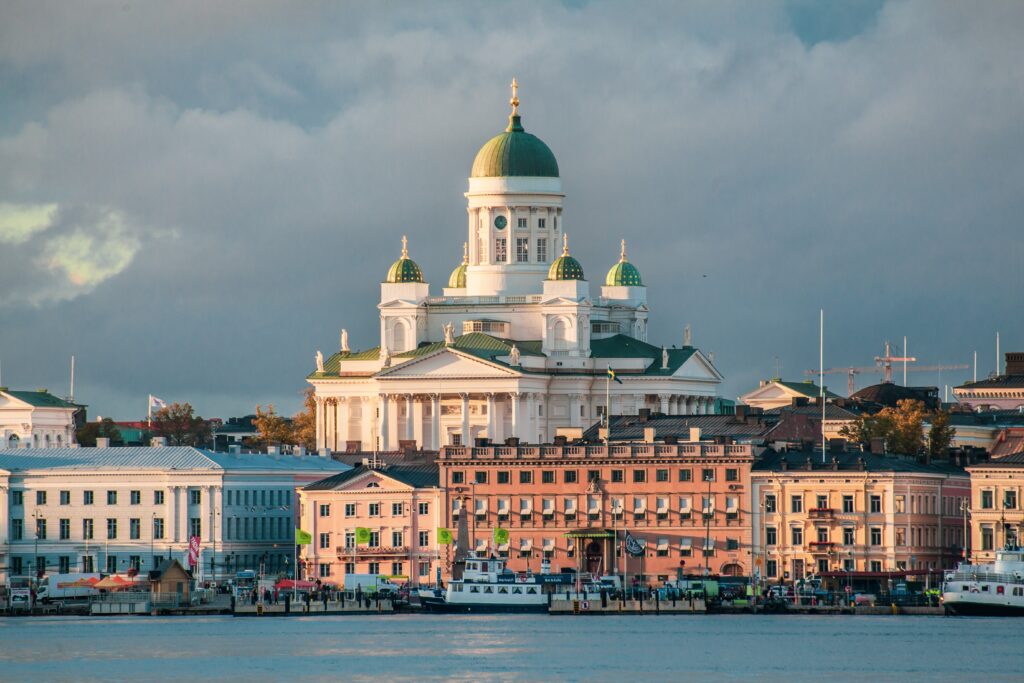
27 February 2022 – Finland allows Estonia to offer howitzers to Ukraine
Finland will allow neighbouring Estonia to offer Ukraine Soviet-origin howitzer field guns that it had previously bought from Finland but not been allowed to sell on, the Finnish defence minister, Antti Kaikkonen, told reporters on Sunday. This was tweeted by the military and intelligence correspondent at Reuters, Phil Stewart.
The Soviet-made 122-mm howitzer D-30s were originally stationed in the former East Germany, but after German unification in 1990s exported to Finland and then, in 2009, bought by Estonia. Estonia needed permission from both countries to send the weapons to Ukraine – Germany gave its approval on 26 February.
27 February 2022 – Estonia’s foreign ministry advises against travel to Russia and Belarus
The Estonian foreign ministry said that due to Russia’s military action, it advises against any non-urgent travel to Russia and Belarus. “We urge you to completely avoid regions bordering Ukraine,” the ministry said in a statement, adding that Estonian nationals currently in Russia and Belarus are advised to reconsider the need to remain there and return to Estonia if possible.
Estonian nationals in Russia and Belarus are urgently advised to register their stay on the Reisi Targalt site of the foreign ministry.
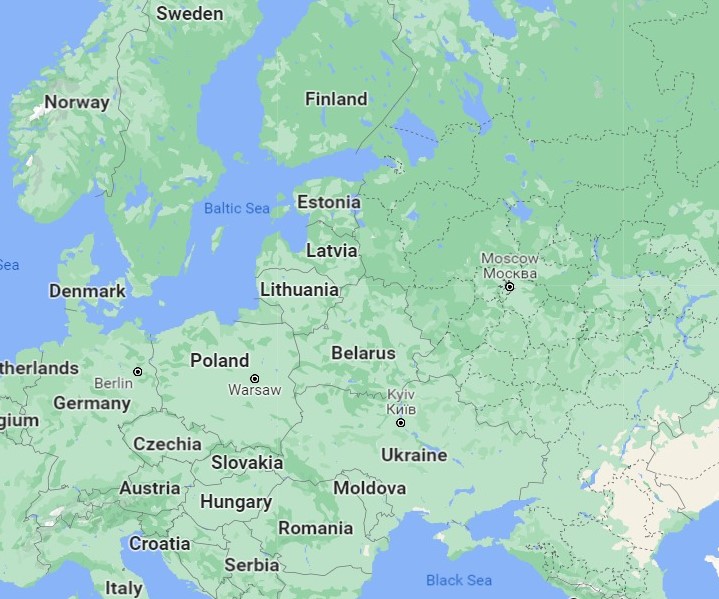
27 February 2022 – Estonian security expert: the ruble has no value and Russia has no friends
Estonian security expert Eerik-Niiles Kross is saying on Facebook that as the Russian president, Vladimir Putin, is yearning for the Soviet Union, the world is fulfilling his wish. “The ruble has no value, technological cooperation with the West is non-existent, and continuing this politics, Russia will have no friends, no foreign communication, no ability to produce anything sensible, and unfortunately, its people will have no freedom,” Kross said. “The Soviet Union got its start in war communism. They’re starting again.”
“It’s still difficult in Ukraine, very difficult. But every day, this unbelievable nation is showing the world its desire for freedom, its bravery and humanity that has taught everyone a deserved lesson. Freedom is not something that is given. Freedom is not something that doesn’t need to be stood up every day. If you give in to an aggressor in little things, then sooner or later he will come for everything.”
27 February 2022 – Estonia to help Ukraine with more Javelin missiles
Tuuli Duneton, the undersecretary for defence policy at the Estonian defence ministry, said at a press briefing this morning that Estonia will send more Javelin anti-tank missiles to help Ukraine’s defences.
The governments of Estonia, Latvia and Lithuania made a decision to donate the first batch of missiles in January, in the light of Russia’s military pressure in and around Ukraine – before Moscow made a decision to invade. Estonia provided Javelin anti-armour missiles, while Latvia and Lithuania provided Stinger anti-aircraft missiles and adjacent equipment to bolster Ukraine’s defensive military capabilities. The first batch donated by Estonia arrived in Ukraine on 18 February.
The donated Javelin missiles were originally bought by Estonia from the United States. Javelin shoulder-operated portable medium-range anti-tank missile system operates on a so-called shoot-and-forget method, which means that after launching the missile automatically guides itself to the target and allows the shooter to take cover. The missiles are capable of hitting the target directly and from above. Its effective range is around two kilometres (1.2 miles).
Several Ukrainian journalists have reported on Twitter that Javelins have been effective against the invading Russian tanks.
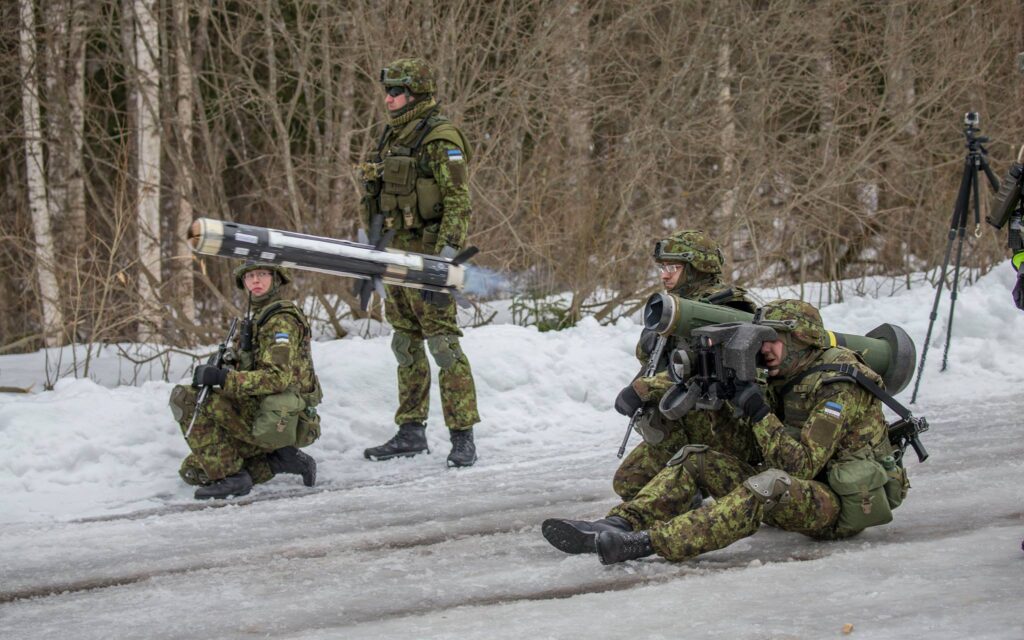
27 February 2022 – Zelensky thanks Estonia and its president
The Ukrainian president, Volodymyr Zelensky, thanked the Estonian people and the country’s president, Alar Karis, for their support after a large demonstration held in Tallinn.
27 February 2022 – Ex-president of Ukraine: We’re also fighting for Estonia’s future
The former president of Ukraine, Petro Poroshenko, told Postimees in a video interview that the Ukrainian people are not only fighting for its own country, but also for Estonia’s future.
“The whole world are our friends. We should demonstrate unity – both unity within the country and unity in the world, to defend our lives and countries, to defend the global security,” Poroshenko said. “I don’t think any Estonian has doubts that we don’t only fight here for our country and soil, but also for Estonia’s future. We very much respect the Estonian people’s strong and trustworthy position on the Ukrainian sovereignty.”
26 February 2022 – Estonia receives Germany’s permission to send howitzers to Ukraine
Germany announced on Saturday that it had decided to send 1,000 anti-tank guns and 500 Stinger surface-to-surface missiles to Ukraine, while also authorising other countries to send weapons to Ukraine. The German government had previously said that it would not allow the export of weapons to conflict areas. “In the current situation, it is our duty to support Ukraine to the best of our abilities against Vladimir Putin’s invading army,” the German chancellor, Olaf Scholz, said, according to Die Zeit, a German weekly newspaper.
Germany’s decision means that Estonia is now allowed to send Ukraine 42 howitzers. The Soviet-made 122-mm howitzer D-30s were originally stationed in the former East Germany, but after German unification in 1990s exported to Finland and then, in 2009, bought by Estonia. Estonia needs permission from both countries to send the weapons to Ukraine – and after Germany’s approval, Finland is likely to follow suit within days.
Estonia made the decision to help Ukraine with the howitzers in January, but couldn’t proceed, due to Germany’s hesitation that received a fair amount of criticism – both in Estonia and abroad. Ukraine reportedly already has about 150 of the same type of howitzers that first entered service in 1960.
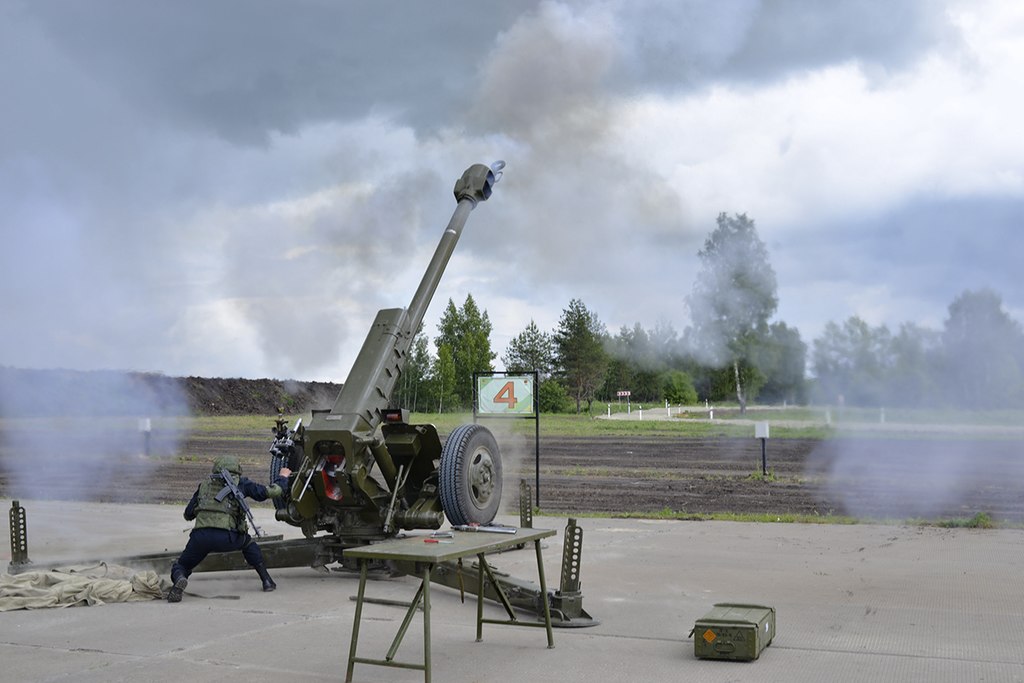
26 February 2022 – 30,000 people protest in Tallinn against the Russian invasion of Ukraine
Almost 30,000 people gathered at Freedom Square in Tallinn to express their support to Ukraine and protest against the Russian war. Here’s our picture gallery of the demonstration.
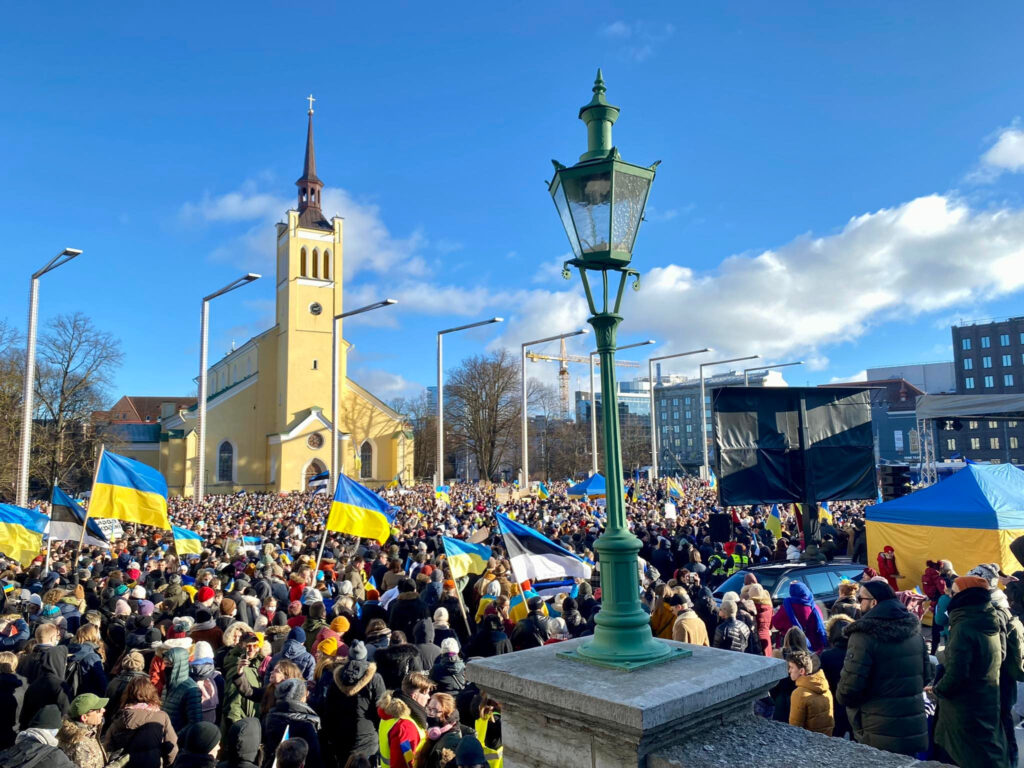
26 February 2022 – Estonian MEP: If Ukraine holds off Russia for 10 days, Russia will have to negotiate
The official Facebook page of the European People’s Party’s European Parliament group posted “intel” from Riho Terras, an Estonian MEP and the former Commander of the Estonian Defence Forces, who’s saying that he received information from a Ukrainian officer about a a meeting in Russian president Vladimir Putin’s lair in the Urals. “Oligarchs convened there so no one would flee. Putin is furious, he thought that the whole war would be easy and everything would be done in 1-4 days.”
“Russians didn’t have a tactical plan. The war costs about $20 bln/day. There are rockets for 3-4 days at most, they use them sparingly. They lack weapons, the Tula and 2 Rotenberg plants can’t physically fulfil the orders for weapons. Rifles and ammo are the most they can do.
The next Russian weapons can be produced in 3-4 months – if even that. They have no raw materials. What was previously supplied mainly from Slovenia, Finland and Germany is now cut off.”
“If Ukraine manages to hold the Russians off for 10 days, then the Russians will have to enter negotiations. Because they have no money, weapons, or resources. Nevertheless, they are indifferent about the sanctions.”“Alpha Spec Ops have been near Kyiv since the 18th February. The goal was to take Kyiv and instal a puppet regime. They are preparing provocations against innocent civilians – women and children – to sow panic. This is their trump card.”
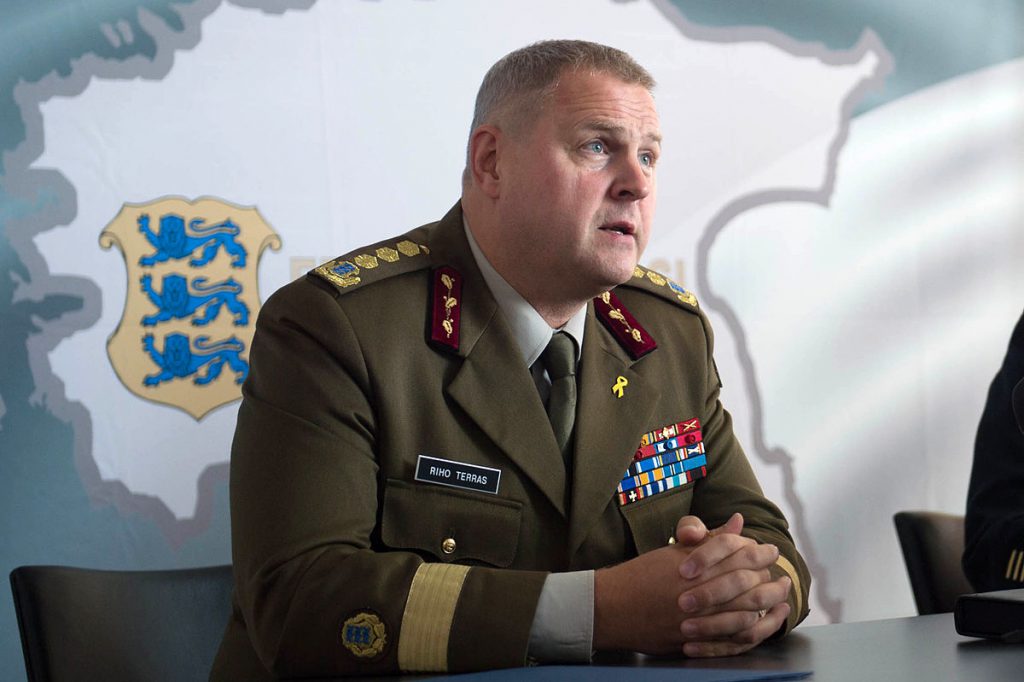
26 February 2022 – Finnish broadcasting: Estonia, Latvia, Lithuania, you were right about Russia
In an opinion article, Mika Mäkeläinen, the foreign news editor of the Finnish Public Broadcasting, Yle, writes that Estonia, Latvia and Lithuania were right about the Russian threat all along and Finland in its good faith towards its eastern neighbour was wrong.
“It’s not unclear anymore, which side of the Bay of Finland had the correct understanding of [the Russian president, Vladimir] Putin,” Mäkeläinen says. “Finland has politicians who have questioned Estonia’s, Latvia’s and Lithuania’s worry about security as Russia’s neighbours – as if Finland had known better.”
“The biggest interpretation fight came in 2008, after the war between Russia and Georgia. Estonia condemned the Russian actions quickly and strongly. Estonia also demanded stronger policy towards Russia from the EU, but the Finnish president, Tarja Halonen, defended Finland’s more careful line. Halonen said the Estonians were suffering from a post-Soviet stress – something the Estonians interpreted as mockery.”
Mäkeläinen points out that in 2017, Halonen suggested in an interview with an Estonian newspaper that Estonia shouldn’t have such a panic fear of Russia. “However, we don’t need to dig history from years ago. Until the very last moments, Finland’s attitude towards Russia was different from the Baltic countries. Two weeks ago, on a public broadcasting’s talk show, MEP Mauri Pekkarinen (Centre Party) commented on the attitude of the Baltic countries when talking about the EU in the face of the Russian threat. Pekkarinen said that ‘they’ve been agitated all along since they left the old Soviet Union’.”
“Finland has played with the thought that we’ve known the Kremlin’s thinking especially well. Now, on the third day of Russia’s attack, it’s not unclear anymore on which side of the Bay of Finland there’s been a more realistic understanding of Putin’s Russia. Estonia, Latvia and Lithuania: you were right.”
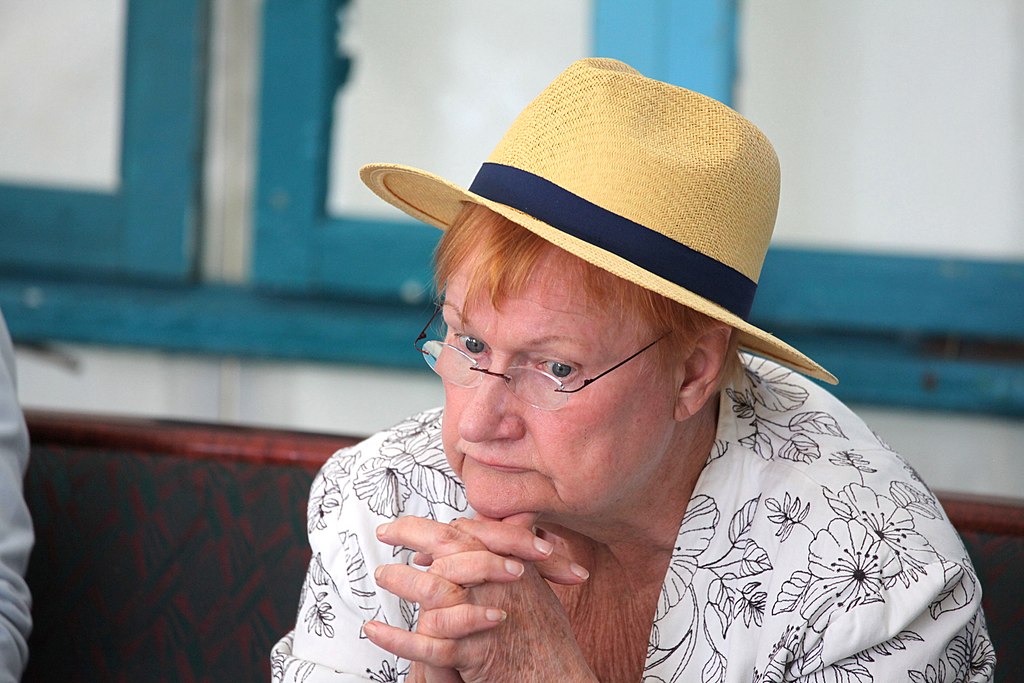
26 February 2022 – Estonia closes its airspace to Russian airlines
“Estonia joins Poland’s initiative and bans all Russian airlines from using our airspace,” the Estonian economic affairs and infrastructure, Taavi Aas, told the Estonian Public Broadcasting.
“We will prepare a proposal for a decision to this effect, after which we plan to close Estonian airspace to Russian airlines. I call on our Baltic colleagues to do the same, in order to cut Russia off from European airspace,” Aas added.
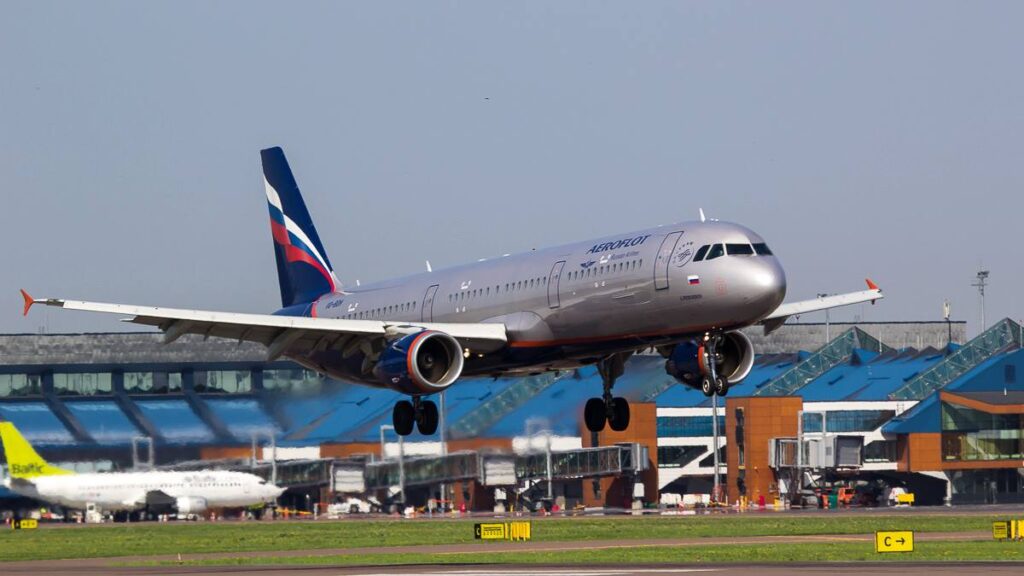
26 February 2022 – Demonstrations in support of Ukraine taking place in Estonia today
A large demonstration in support of Ukraine is due to take place at Tallinn’s Freedom Square today at 3 PM Estonian time; Estonian World will live broadcast the rally.
Smaller protests are also taking place in Tartu and Pärnu.
26 February 2022 – First additional British troops arrive in Estonia
After a few days’ journey from the Sennelager exercise area in northern Germany, a military convoy with six Challenger main battle tanks and other armoured vehicles from the UK military’s Royal Welsh Regiment arrived in Tapa, Estonia, on 25 February. The UK committed more troops to Estonia, following Russia’s aggression and subsequent invasion of Ukraine.
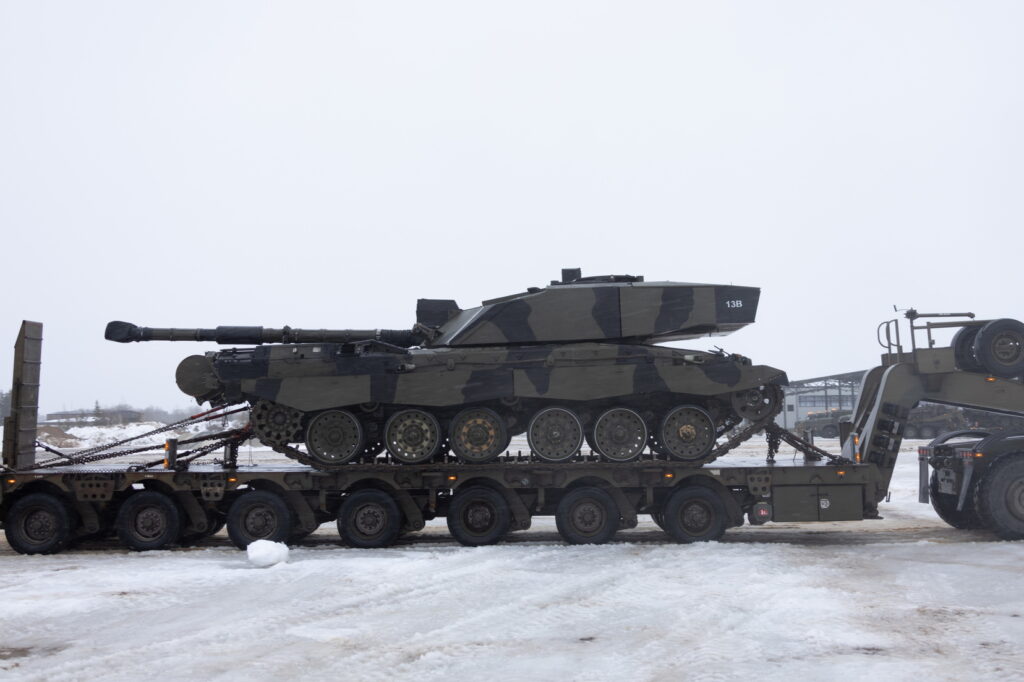
26 February 2022 – Isamaa party leader: European countries against removing Russia from SWIFT are shameful
Helir-Valdor Seeder, the leader of the Estonian Isamaa party, said the fact that some of the leaders in Europe are against removing Russia from the SWIFT banking system is “unbelievably shameful”.
“There is a wide-scale war in Europe. The state of Ukraine is being destroyed and innocent people are being killed. The leaders of the European Union are sitting around a table and declaring unity. But feeble unity is not the answer. We don’t have time for empty statements. Many Western countries lack unity to impose sanctions against Russia.”
Seeder went on to say that through the SWIFT banking system, Russia’s war against Ukraine and Russia itself is being financed. The US president, Joe Biden, said about removing Russia from the SWIFT system that many European partners were against it, Seeder pointed out. “This is outrageously shameful. The European countries are financing Russia and supporting the war in Ukraine.”
Seeder proposed removing Russia from the SWIFT system immediately. “In addition, an immediate and full trade embargo, freezing Russia’s movables and real estate, closing the EU air space to Russian airplanes; the opening of the EU and NATO perspective to Ukraine and the condemnation of the Russian aggression, and stopping [Russia’s] activities in international organisations is a mandatory minimum. Empty statements undermine trust.
26 February 2022 – Estonian diplomat: the Hague should create a special Russia tribunal
A long-time Estonian diplomat, Harri Tiido, is suggesting that the international criminal court in the Hague should create a special tribunal for Russia that is to investigate Russia’s war crimes; he’s also saying that if the Russian president, Vladimir Putin, and his inner circle has been convicted by an international court in absentia, it would be very easy to impose sanctions.
“An international court that would investigate Russian war crimes. Let’s start from the Chechen war or blowing up apartment buildings in Russia by the FSB. The next, murders abroad – the use of chemical or biological weapons internationally. Inciting terrorist acts. And then the entire Ukrainian thing. There’s enough reason. Sure, Russia may not acknowledge it, but they can be convicted in absentia. Going forward, it’s very easy to impose sanctions, when we’re dealing with a bunch of people convicted by an international court,” Tiido told the Estonian Public Broadcasting’s morning radio programme.
26 February 2022 – Estonian entrepreneur: “Russian warship, go fuck yourself” is the new rallying cry of free peoples
Today at 3PM, a demonstration in support of Ukraine is to take place at Freedom Square in Tallinn, the Estonian capital. Adam Rang, a British sauna entrepreneur, living and operating in Estonia, posted on Facebook multiple placards for people to carry at the demonstration.
“I wasn’t sure what to write on my placard so I asked the internet for suggestions. There was a very clear consensus. This is a small selection of responses all on the same theme,” he wrote on Facebook.
“’Russian warship, go fuck yourself’ is the new rallying cry of free peoples everywhere. We’ll never forget these last words of the heroes of Snake Island. Let’s live by the courage and values that they died for.”
The phrase comes from the reply of 13 Ukrainian defenders on Snake Island that was under attack by a Russian warship. The warship warned the defenders before attacking, saying, “This is a Russian warship. I propose you lay down your weapons and surrender to avoid bloodshed and unnecessary victims. Otherwise, you will be bombed.” The Ukrainians responded, “Russian warship, go fuck yourself.”
25 February 2022 – Estonian businessman: sanction everyone with contacts with Putin’s inner circle
Gunnar Kobin, an Estonian businessman, writes in the Estonian daily, Eesti Päevaleht, that instead of hopping from one foot to another and promote toothless sanctions against Russia, the European Union and the US should immediately sanction everyone, who has even little contact with the inner circle of the Russian president, Vladimir Putin.
“Not one, not two, but all fifty or hundred, who has anything to do with Putin. Also those, who don’t have a direct contact with him, like Torbjorn Tornqvist, the owner of one of the largest oil dealers in Europe, Gunvor, who became the 87-per cent owner after Putin’s friend Gennady Timchenko, quickly after the occupation of Crimea transferred his ownership in the company to Tornquist, being afraid of sanctions. Also, the Western intelligence services have hinted that Gunvor is probably Putin’s company.”
Kobin points out that the oligarchs in Putin’s inner circle are people who are not interested in growing Russia’s sphere of influence, they’re interested in “flying their private planes or sailing their yachts between London and Nice. The last thing they want to see is that they have to spend the rest of their lives freezing in Moscow or vacationing in Sochi.”
25 February 2022 – EU Delegation in Pretoria raises the Ukrainian flag
The European Union Delegation in Pretoria, South Africa, has raised the Ukrainian flag next to the flag of the EU. The Delegation is led by an Estonian diplomat, ambassador Riina Kionka.
25 February 2022 – Ex-president Ilves to the Russian foreign ministry: “How’s the Hague anxiety tonight?
25 February 2022 – NATO activates its Response Force
NATO has activated its NATO Response Force; this is the first time in the alliance’s history that it has activated the 40,000-strong force for “a deterrence and defence” role. The decision was made at the meeting of NATO ministers today in Brussels.
To be activated, the 30 members of NATO must all agree to activate the force, which is under the command of General Tod Wolters, the Supreme Allied Commander of NATO. The NATO Response Force is a high readiness force comprising land, air, sea and special forces units capable of being deployed quickly on operations wherever needed.
25 February 2022 – Estonian MP calls for EU candidate status for Ukraine
The chairman of the Foreign Affairs Committee of the Estonian parliament, Marko Mihkelson, said in his speech at the Inter-Parliamentary Conference on the Common Foreign and Security Policy and the Common Security and Defence Policy in Paris today that time had come to grant Ukraine the status of a candidate country for membership in the European Union.
Mihkelson called the EU to immediately do everything in their power that our unity and solidarity would transform into real support to Ukraine. “Each delay may be a threat to the freedom of the whole Europe,” Mihkelson said. “Ukraine is welcome to become a member of the European Union.”
He also noted that the free world had to put an end to the unpunished war crimes committed by the leadership of the Russian Federation. “No crime against humanity must remain unpunished.”
25 February 2022 – Estonian MP of the EU: You can’t tame a predator with shaking hands
Member of the Estonian parliament and a former defence and justice minister, Urmas Reinsalu, was today highly critical of the European Union’s actions towards Russia. “Damn it. The European Union has decided to freeze [Russian president Vladimir] Putin’s assets in Europe. (Officially, he doesn’t have any assets in Europe.) At the same time, with shaking hands they didn’t impose a travel ban on him as to ‘not block diplomacy’.”
“It’s like Hitler could travel the world during his invasive wars, but couldn’t keep his money on the other side of the frontline,” Reinsalu continued. “In reality, the world’s countries should declare Putin wanted for war crimes. The international community, at the level of countries, has to legally qualify Russia’s and personally Putin’s actions. You can’t tame a predator with shaking hands’ politics.”
25 February 2022 – Sten Hankewitz: Russia should be embargoed and kicked out of everything
In the wake of the unprovoked Russian war against Ukraine, Vladimir Putin-led Russia should be kicked out of every single international organisation it’s a part of, and embargoed by the entire free world like Cuba was by the United States in 1962, Sten Hankewitz, the Executive Editor of Estonian World, writes.
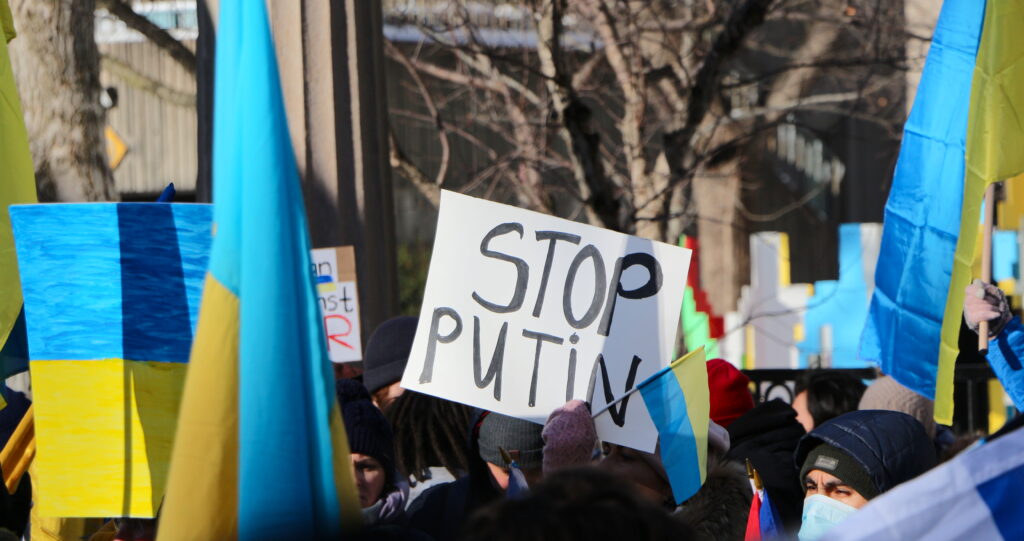
25 February 2022 – Estonian NGOs ask for donations to help Ukrainians
Three Estonian NGOs – the Estonian Refugee Council, Mondo and the Ukrainian Cultural Centre – have initiated a campaign called “For Ukraine!” and they’re asking for donations to provide humanitarian aid to the Ukrainian people.
“Around 2.9 million people continue to need humanitarian assistance in the settlements close to the front line in eastern Ukraine. Those who have nowhere to go have to survive in the area; unemployment in the settlements has created widespread poverty, with the majority of those present in need of support to cover their basic needs. There is also a critical need for psychosocial support. These people depend to a large extent on good helpers to get by.”
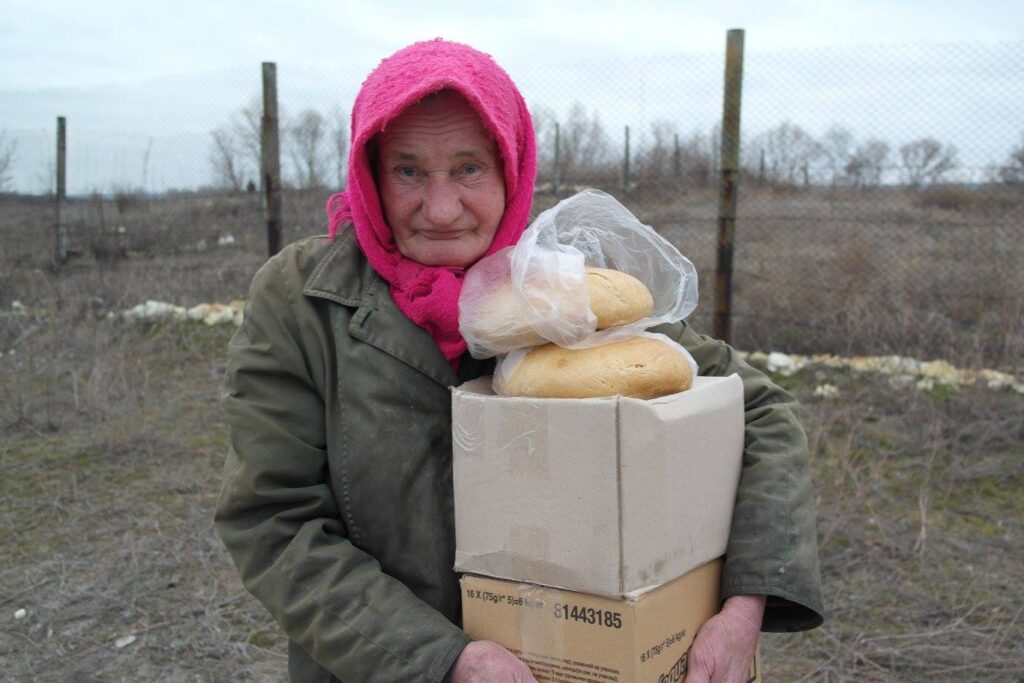
25 February 2022 – President Karis to meet the heads of state of NATO’s eastern flank
The Estonian president, Alar Karis, is travelling to Warsaw, Poland, today, to meet the other heads of state of NATO’s eastern flank, or the so-called B9 – Estonia, Latvia, Lithuania, the Czech Republic, Hungary, Poland, Romania, Slovakia and Bulgaria. The presidents are going to discuss the security of the region, strengthening the eastern flank of the alliance and assure support for Ukraine.
“After [Russian] president [Vladimir] Putin’s decision to start a war against Ukraine, the unity of the NATO eastern flank countries is even more important. The security situation in Europe has principally changed and needs decisive steps. We want to jointly support Ukraine and its pursuit towards Europe,” Karis said in a statement.
The president of the European Commission, Ursula von der Leyen, and the president of the European Council, Charles Michel, will also take part in the meeting.
25 February 2022 – Chernobyl radiation levels raise 20 times
After the Russian forces took over the territory of the infamous Chernobyl nuclear plant in northern Ukraine, the area’s radiation levels raised 20 times. In the evening of 24 February, the level of gamma radiation in the area was 65,500 nanosieverts per hour; normally, the average radiation level in Chernobyl is around 3,000 nanosieverts per hour.
Teet Koitjärv, an advisor at the Estonian Environment Board, told Postimees that the reason may be the disturbance of the upper layers of soil due to the movement of a significant amount of heavy armoured vehicles.
25 February 2022 – Special buses to take Estonians escaping Ukraine home
The Estonian foreign ministry announced there will be special buses taking home Estonians who have escaped Ukraine. The buses will be departing on 26 February at 6PM from the Polish border town of Medyka that has become one of the main crossing points for Ukrainian refugees.
Estonian citizens who have arrived in Poland from Ukraine and have no transport for returning to Estonia should contact the foreign ministry by emailing konsul@mfa.ee or calling +372 5301 9999.

25 February 2022 – Estonian MEP calls for banning Russia from Eurovision
Estonian member of the European Parliament, Urmas Paet, is calling for banning Russia from the Eurovision Song Contest in the light of the Russian war against Ukraine. “The Eurovision Song Contest has become an important, friendly and happy tradition. And for it to continue as such, it’s not possible that this year Russia could partake as if nothing had happened,” Paet said on Facebook.
“I’m calling the Estonian Eurovision team, together with other free and peaceful nations, to decide that the Russian representation cannot take part, because this country is killing the people of its neighbor, Ukraine. If somehow Russia stays in the contest, I don’t see the possibility how Estonia and other peaceful European countries could participate together with Russia. We can’t destroy the idea and tradition of Eurovision.”
The Estonian Public Broadcasting said it would decide on taking part in the song contest based on whether Russia is participating or not. “It’s obviously unthinkable that Estonia would participate in Eurovision in a situation where Russia is taking part and Ukraine isn’t,” the CEO of the public broadcasting, Erik Roose, said.
25 February 2022 – Estonian diplomat Jonatan Vseviov: the Ukrainian desire for freedom will not go away
The secretary general of the Estonian foreign ministry and the country’s former ambassador to the United States, Jonatan Vseviov said in an interview with the American National Public Radio – or NPR, as it’s colloquially known – that the Ukrainians are putting up resistance against the unprovoked Russian aggression and that their desire for freedom and democracy will not go away.
“And Ukrainians should know that the – not just Europe and NATO, but actually the wider world is with them. I refer to, for instance, the statements of the secretary-general of the United Nations. We were – Estonia was occupied for 50 years, and yet we managed to keep the flame of freedom alive. This flame will prevail in Ukraine as well.”
25 February 2022 – France to send more military to Estonia
The French president, Emmanuel Macron, announced he’s sending a new contingent of French military to Estonia. Currently, 300 French troops, 150 armored vehicles and 12 Leclerc tanks are in Estonia as part of the UK-led NATO battle group. According to the previous plans, the Danish military would have replaced this contingent in mid-March. However, France will additionally send a new, up to 200-strong mountain unit to Tapa, Estonia. Also, France will push forward its takeover of the Baltic Air Policing Mission from April to March.
Denmark, on its part, announced it will send at least 200 military and two F-16 fighter jets to Estonia, to strengthen defence capabilities on the NATO eastern flank.
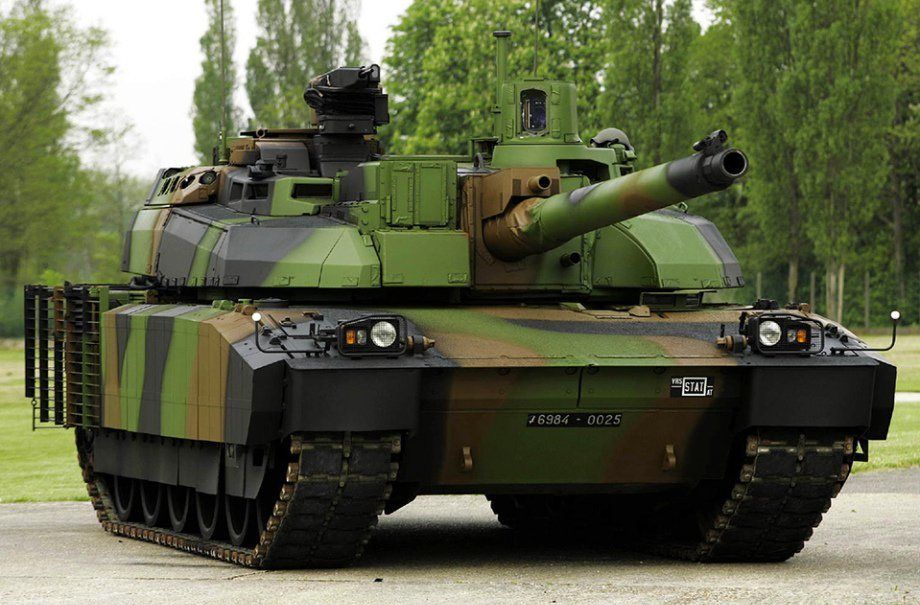
25 February 2022 – Estonia’s ambassador in Ukraine has left Kyiv
The Estonian ambassador to Ukraine, Kaimo Kuusk, has left Kyiv, to set up an embassy in a safer location. “The ambassador has left Kyiv, there is a very small team in the embassy now. The ambassador is moving to a safer place where an alternative embassy will be set up,” the Estonian defence attaché in Ukraine, Vahur Murulaid, told the Estonian Public Broadcasting.
“The situation in the centre of Kyiv is quite calm, there are a few people because many have left, the public transport is working. But in some places on the outskirts there are battles going on, there is no big war here yet,” Murulaid noted. He added that the airports near Kyiv were currently under the Ukrainian control and the Ukrainians “are putting up strong resistance and the Russian army has not made much headway”.
Kaimo Kuusk later said in a radio interview that the decision to leave Kyiv was taken on Friday morning as air raid sirens in the capital increased. The embassy staff moving in the streets had to take shelter in basement shops.
“The Russians are continuing to attack, the Ukrainians are resisting. Some Russian units are on the outskirts of Kyiv and this means the beginning of urban fighting,” the ambassador noted. “The Ukrainians are not giving up, so these battles could last for quite a long time.” He said the Russian troops were approaching from the north and there had been no breakthrough from the east of the capital.
The ambassador said that people were sheltering in the basements of the apartment buildings and also in the subway stations. “On the radio, the subway stops are read out, where to go. The underground stations are very safe here, Kyiv has the deepest subway stations in the world,” Kuusk noted.
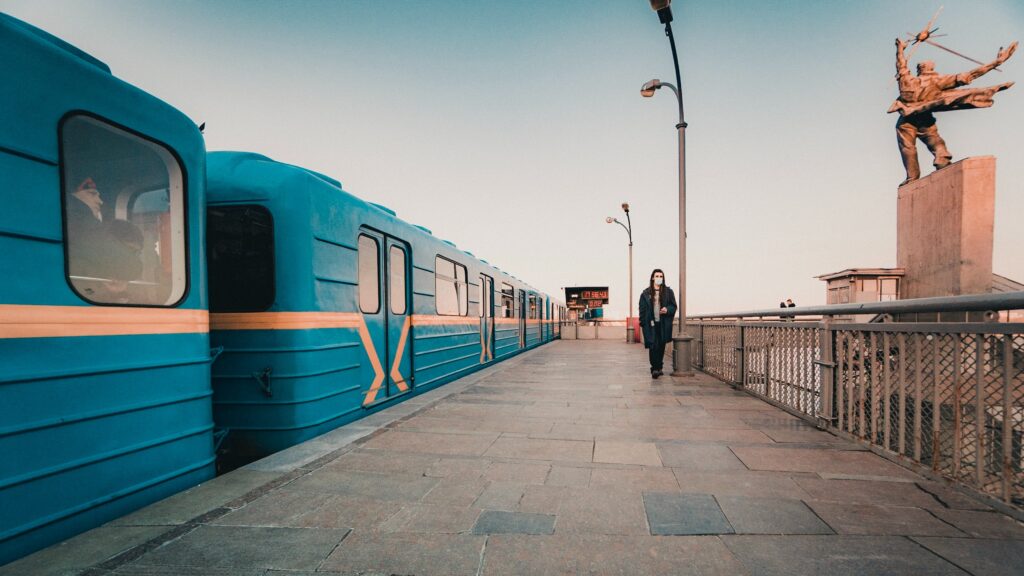
25 February 2022 – Estonia to send additional aid to Ukraine
The chief of staff of the Estonian defence ministry, Kusti Salm, said today Estonia was to send Ukraine additional aid. “First of all, about 25,000 dry food packages, medical equipment and personal protection gear – like helmets – and additional ammunition: Javelin missiles and anti-aircraft munitions,” Salm said, adding that he can’t give any additional information.
25 February 2022 – British troops arriving in Estonia
The United Kingdom is deploying about 850 additional troops to Estonia, in response to the Russia’s aggression against Ukraine. The troops will complement the 1,200-strong British-led NATO battle group already stationed in the country. First of these additional troops today arrived in Estonia, as this Sky News drone footage shows – all the way from Germany via Poland, Lithuania and Latvia.
25 February 2022 – Estonia’s PM: European leaders have been too naive about Russia
The leaders of the European Union member states – the European Council – met in Brussels this morning, agreeing to impose “strong sanctions on all those behind” the Russia’s aggression against Ukraine. “We woke up to a completely different world yesterday. The rules-based world order has been called into question by the Kremlin and we must oppose it by all means,” the Estonian prime minister Kaja Kallas said after the meeting in a statement.
In a subsequent interview with Delfi, an Estonian media outlet, Kallas said “the mood was very depressing”. “There was a feeling around the table of the EU leaders that we had been too naive about Russia”.
The EU sanctions, prepared with the US, Canada and the UK, will also affect Belarus. The sanctions include the financial sector, the energy and transport sectors, dual-use goods, export controls and export financing, visa policy, as well as the inclusion of additional Russian citizens on the sanctions list. Banking transactions with Russian banks and the financing of the Russian state and its state-owned enterprises and the movement of capital between the EU and Russia are restricted. The export of technology and spare parts to oil and refineries and aviation is banned.
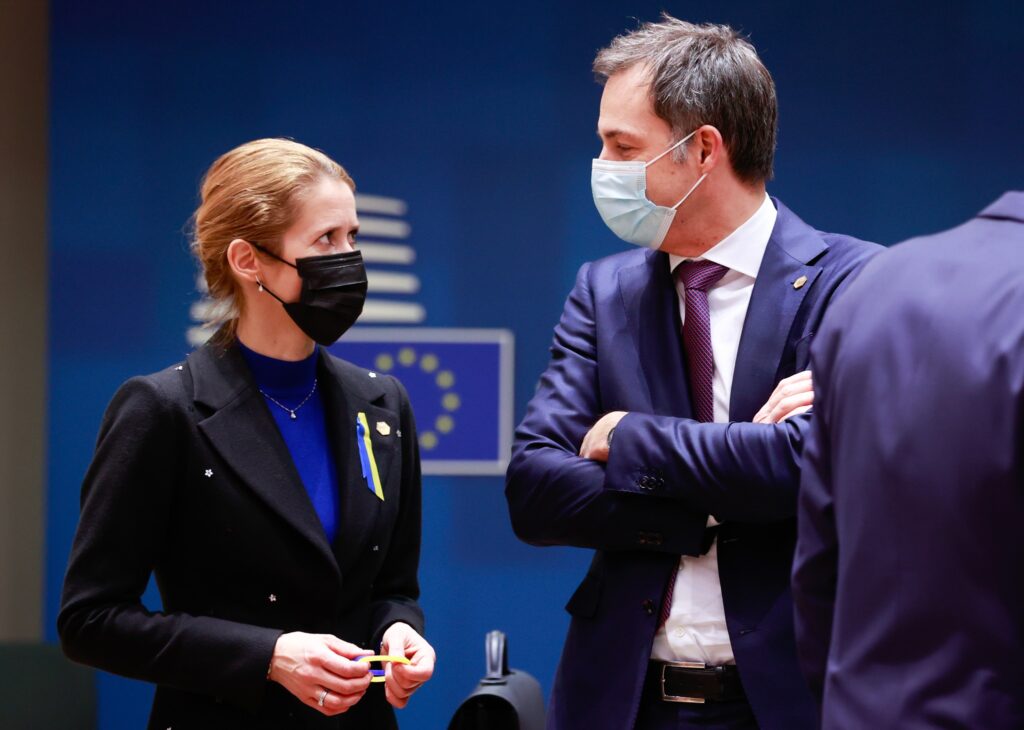
24 February 2022 – Consumer Protection bans transmitting some Russian TV channels in Estonia
The Estonian Consumer Protection and Technical Regulatory Authority has banned transmitting some Russian TV channels in Estonia. The channels banned are RTR Planeta, NTV Mir, NTV Mir Baltic, Belarus 24, Rossia 24 and TV Centre International. The reason for banning these channels is their banned content – including inciting war and disseminating false information. All Estonian TV providers must finish transmitting them as soon as possible.
24 February 2022 – How the Ukrainian air space looks like
Ukraine closed its air space to civilian flights today after Russia began a wide-scale war in the country. Moldova has also said it’s closing its air space, and Belarus has shut down part of its air space. The European Union Aviation Safety Agency warned of safety risks in flying in the air space near to Ukraine’s borders, including in Russia. Here’s a screenshot from Flightradar 24, how the Ukrainian and the European air space looked like today.
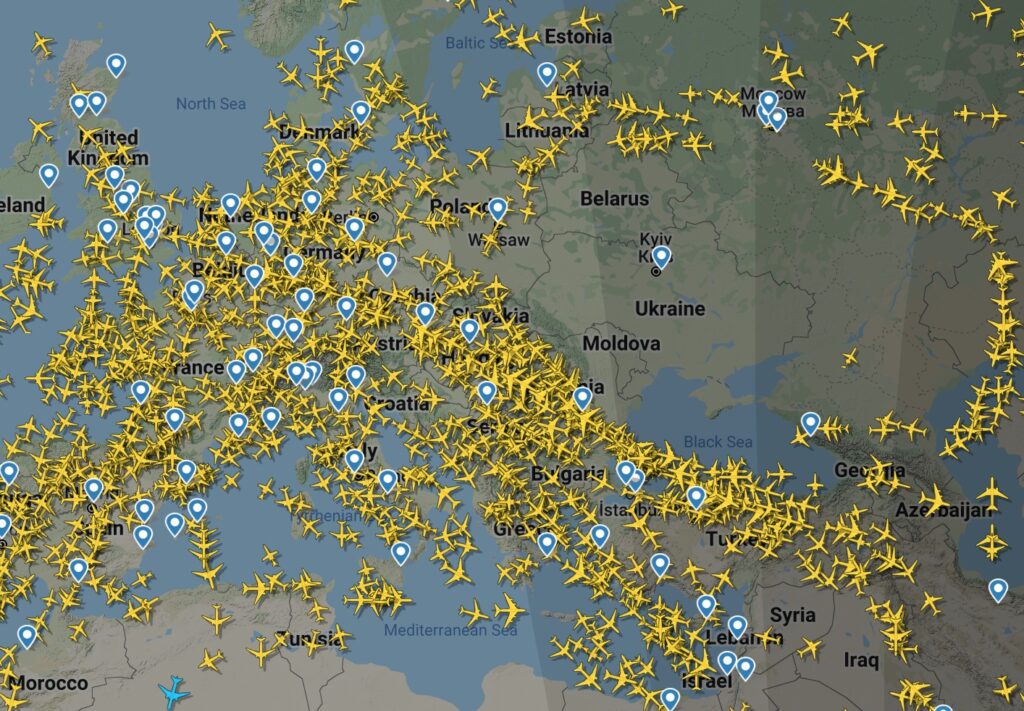
24 February 2022 – Energy prices on the rise
After Russia started its wide-scale war against Ukraine, the market price of the European natural gas rose by a third by tonight – to €120 for megawatt-hour; the Brent crude price went by ten per cent, newspaper Postimees writes. In Germany, the March electricity futures went up by a whopping 32%, also the price of coal went up.
The newspaper says Russia imports 10% of the world’s oil and 38% of the European natural gas – the latter is imported to countries like Austria, Italy and Slovakia, and through Ukraine also to Germany and Poland.
24 February 2022 – PM Kallas: Only 1,300 kilometres from Kyiv to Berlin
The Estonian prime minister, Kaja Kallas, warned the European countries that think they’re far away from Russia and maybe shouldn’t be tough with the regime of the Russian president, Vladimir Putin. “Actually, the distance from Tallinn to Kyiv is 1,300 kilometres – and it’s the same from there to Berlin,” she said, according to Delfi.
Kallas added that the entire world should condemn Russia because the UN Charter forbids attacking other countries. “Every country should say it, otherwise there could be other big countries who get an appetite for their neighbours’ territory.”
24 February 2022 – Estonia allows Ukrainians stay in the country even after their stay expires
The Estonian Police and Border Guard Board announced that the Ukrainian citizens currently in Estonia and whose allowed visa free stay (or visa) is about to expire, can remain in Estonia after that; also Ukrainians who don’t have a biometric passport can now enter Estonia without a visa.
24 February 2022 – Telia makes calling and texting Ukraine free
The Nordic telecom operator, Telia, announced that starting from today, for the next two weeks, all cell phone and landline calls and text messages from Estonia to numbers with the Ukrainian country code will be free. This applies to all post-pay customers, both private individuals and business customers.
24 February 2022 – Pictures: Protest against the Russian invasion of Ukraine in Tallinn
Hundreds of people gathered spontaneously in front of the Russian embassy in Tallinn, the Estonian capital, on 24 February, to protest against the Russian war against Ukraine.
People started to gather today around 12 PM in front of the Russian embassy in Tallinn to protest against the Russian war against Ukraine and in support of the attacked country, demanding a truce and the retreat of the Russian forces from Ukraine.
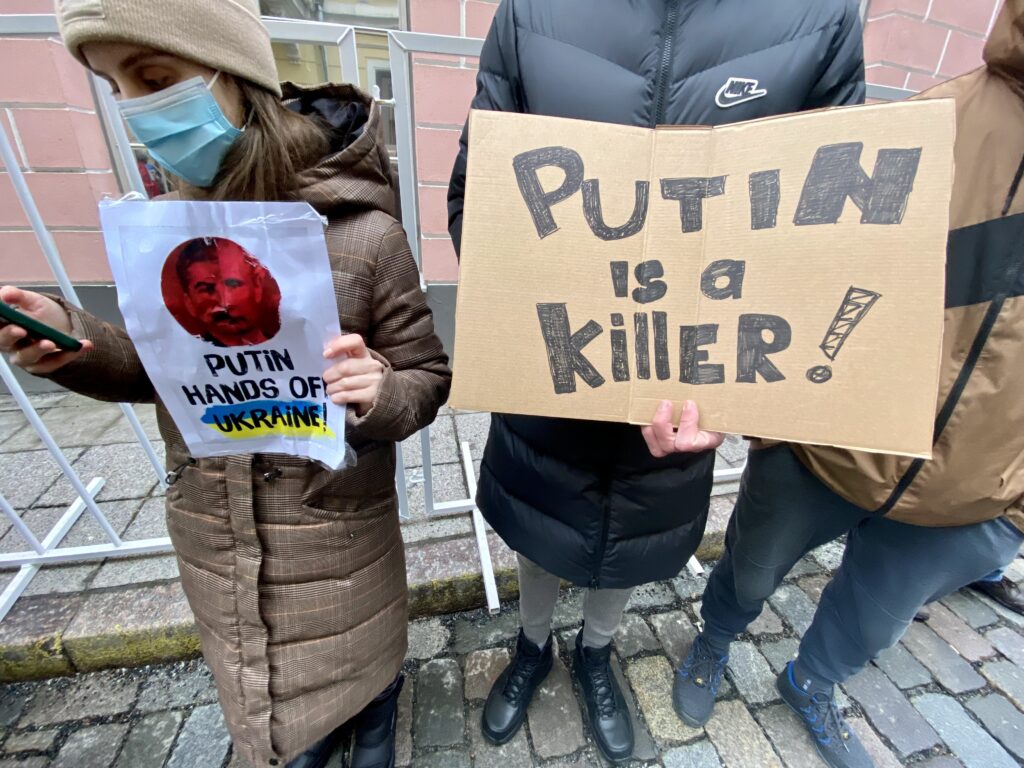
24 February 2022 – Estonia evacuates some of its Kyiv embassy staff
The Estonian ambassador in Ukraine, Kaimo Kuusk, told Postimees that they were evacuating some of its staff from Kyiv, but the embassy remained open until it becomes unsafe. All in all, about a third of the embassy personnel remain in the Ukrainian capital.
24 February 2022 – American F-35 fighter jets land in Ämari
American F-35 fighter jets, sent to Estonia as a deterrence due to the Russian aggression in Ukraine, landed today at the Ämari Air Base. The jets are some of the most expensive weapons systems that can fulfil the tasks of fighters, reconnaissance aircraft and tactical bombers.
The United States has decided to strengthen deterrence in the Baltics and Poland and will, in addition, also send AH-64 Apache helicopters and a 800-strong military unit to the region.
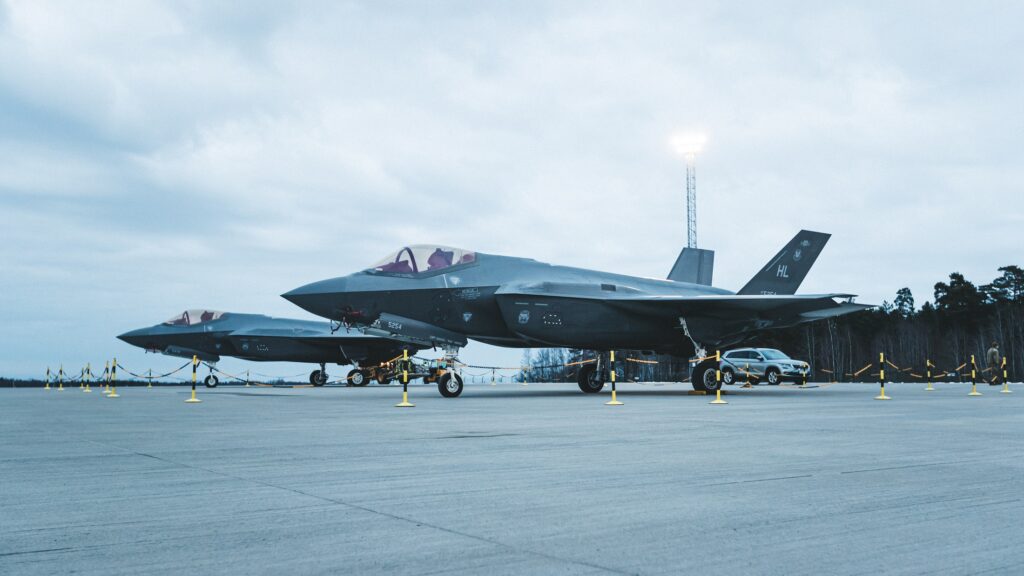
24 February 2022 – Rimi stops selling Russian goods, advertising on Russian TV
The Baltic supermarket chain, Rimi, announced it was to stop selling Russian goods in all of its stores across the Baltic states – including Estonia – and it’s also pulling back its commercials from Russian TV channels. The Rimi stores in Estonia, Latvia and Lithuania will start removing Russian goods from their shelves starting today. According to the chain, about 1% of the goods it sells are from Russia.
24 February 2022 – President Karis calls Ukraine’s Zelensky
The Estonian president, Alar Karis, today called his Ukrainian colleague, Volodymyr Zelensky, and expressed Estonia’s support to the country.
24 February 2022 – Centre Party: the cooperation protocol with United Russia is invalid and finished
According to the former prime minister and the leader of the Estonian Centre Party, Jüri Ratas, his party’s cooperation protocol with United Russia – the party of the Russian president, Vladimir Putin – is “invalid and finished”. Ratas said that to Estonian journalist Juku-Kalle Raid in a Messenger chat.
In a later phone call, Raid asked Ratas, how and when the protocol was finished. “The answer is that it all came throughout the time and the behaviour of the other side. First the attack on Georgia 2008, then the occupation of the Crimea 2014 and after that what’s been happening in Ukraine. … Today, I’m saying that it doesn’t exist anymore.”
The Estonian Centre Party signed its cooperation protocol with United Russia in 2004. And even though Ratas claims the protocol is “invalid and finished”, it was still accessible on the Centre Party’s website at the time of writing this blog post.
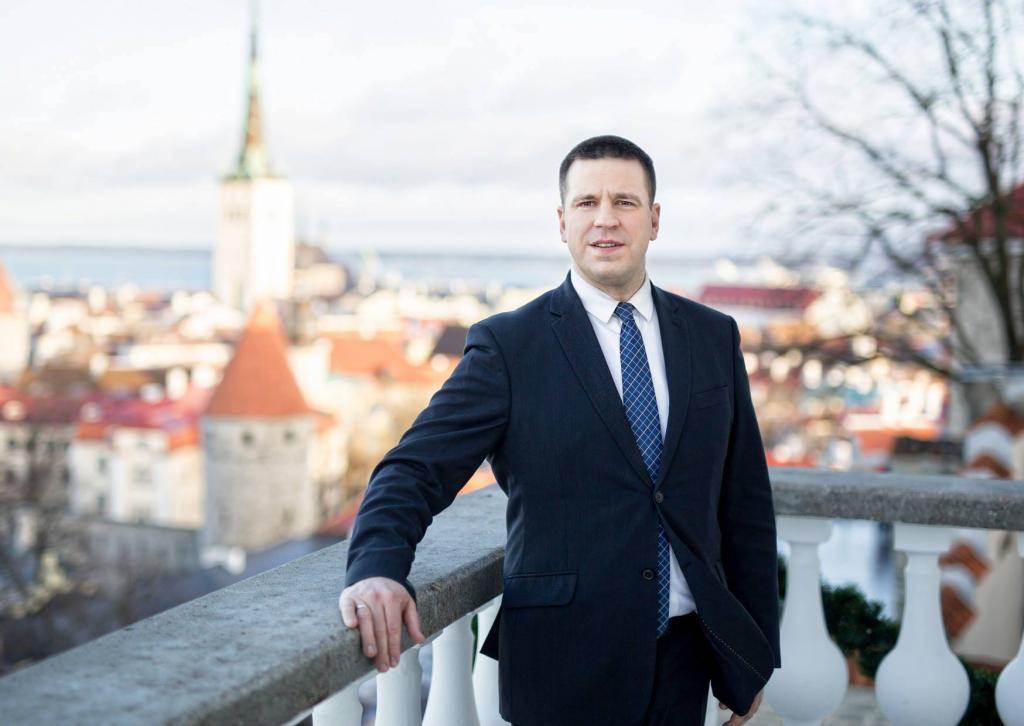
24 February 2022 – Renewed travel advice: avoid Belarus and Russia
The Estonian foreign ministry has renewed its travel advice regarding Belarus and Russia and is now saying people should avoid travelling to Belarus; Estonian citizens currently in Belarus should weigh the importance of being there and, if they can, return to Estonia.
The ministry also recommends not travelling to Russia without a significant reason, and to completely avoid travelling to the Russian areas bordering Ukraine.
24 February 2022 – Ukraine warns of nuclear dust from Chernobyl
According to Anton Gerashchenko, an advisor to the Ukrainian interior minister, the Russian troops have entered the Chernobyl nuclear plant zone, and he warns that if the nuclear waste depository there should get hit, the radioactive dust may cover Ukraine, Belarus and the territories of the European Union member states. The Ukrainian president, Volodymyr Zelensky, said on Twitter that the Ukrainian military will continue to defend the area “so that the tragedy of 1986 will not be repeated. … This is a declaration of war against the whole of Europe.”
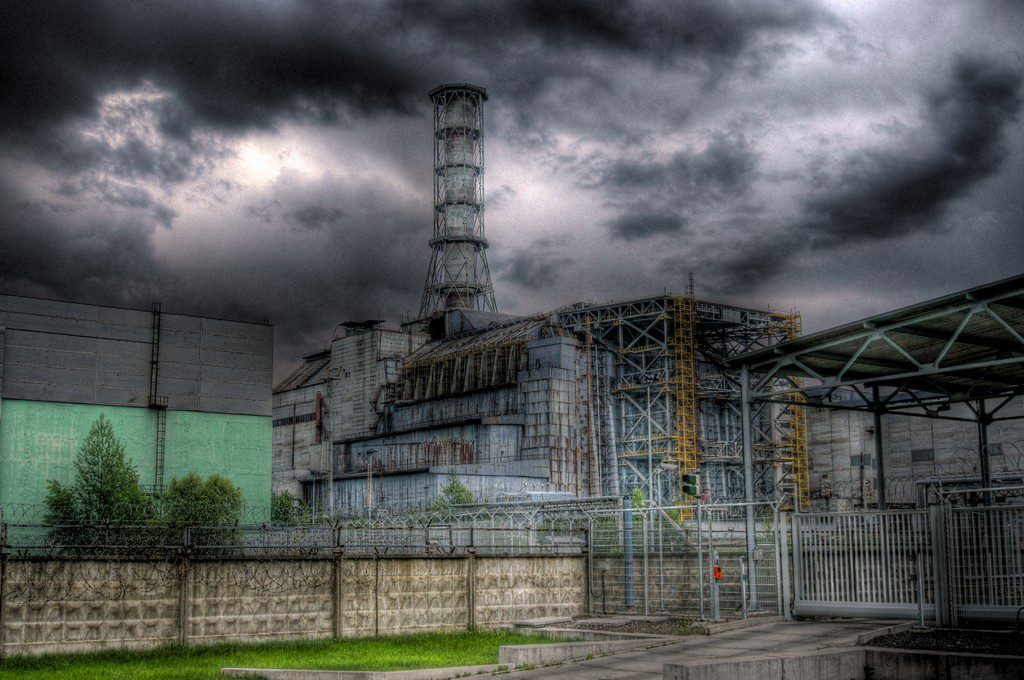
24 February 2022 – Baltic social ministers promise to accept Ukrainian refugees
The social ministers of Estonia, Latvia and Lithuania – Signe Riisalo, Gatis Eglītis and Monika Navickienė, respectively – have issued a joint statement, saying the Baltic states “are doing all in their power to activate human and financial resources that are needed to accept the Ukrainian citizens, and to provide them with the necessary assistance, including food, accommodation and psychological support”.
The ministers also “encourage all the European Union ministers responsible for social affairs to join our efforts to ensure the humanitarian support to the Ukrainian people”.
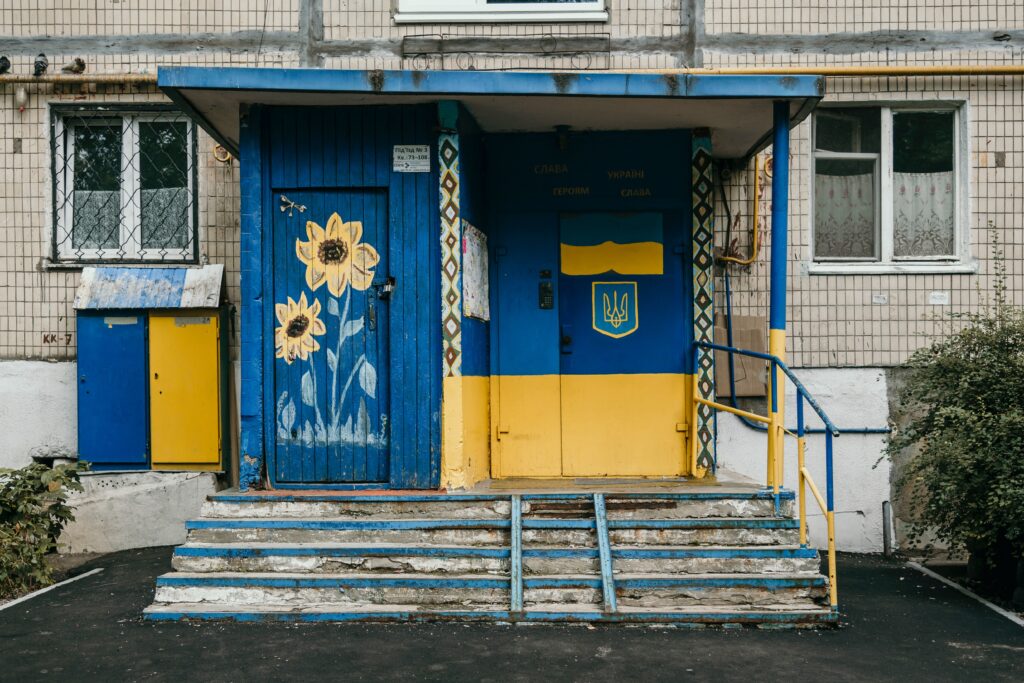
24 February 2022 – Journalist: Russia should be kicked out of international sports
According to Priit Pullerits, an Estonian journalist working at Postimees, the world’s sports organisations should cease Russia’s membership in international sports unions and indefinitely remove Russia’s athletes from all international competitions, like the Olympics, world and European championships, and world and European cups.
“It would be intolerable to see Russian athletes – be it under a neutral flag or without one at all – because already in the Soviet Union there was a banner that sports was an ambassador of peace. In the current situation, where Russia has started a war against Ukraine, sports would become, through Russian athletes, an ambassador of war,” Pullerits wrote.
24 February 2022 – Estonia’s Social Insurance Board falls victim of a cyber attack
According to CERT-EE, the Computer Emergency Response Team for Estonia, the website of the country’s Social Insurance Board had fallen victim of a cyber attack and its website wasn’t accessible this morning.
Tõnu Tammer, the chief of CERT-EE, told Delfi that, according to the preliminary research, the website received requests from different countries and the amount of these requests was a lot higher than normal. The chief of the Estonian Information System Authority, Gert Auväärt, told the news portal that they had seen higher activity in the Estonian cyber space.
24 February 2022 – NATO activates defence plans
The secretary-general of NATO, Jens Stoltenberg, said today the North Atlantic Council had decided to activate their defence plans so that they can send NATO forces to wherever they’re needed. “NATO’s core task is to protect and defend all allies. There must be no room for miscalculation or misunderstanding,” Stoltenberg said.
He added they were deploying forces “on land, at sea and in the air,” including thousands of troops, at least 120 allied ships and more than 100 jets “on high alert, protecting our air space”. “We will continue to do whatever is necessary to shield the alliance from aggression,” he noted.However, Stoltenberg assured “there are no NATO troops at all inside Ukraine” and that “we don’t have any plans to put NATO troops in Ukraine”.
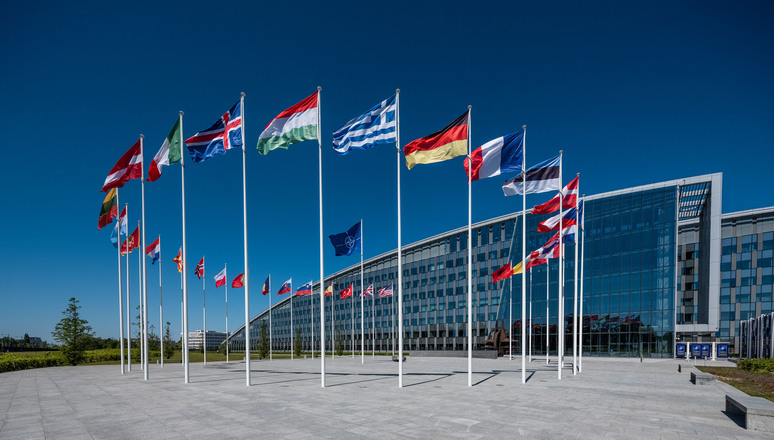
24 February 2022 – Estonia launches a special crisis page
The Estonian government has launched a special crisis page, called “Security situation in Europe”, published in Estonian, Russian and English.
24 February 2022 – Estonia’s military intelligence chief: the attack was probably decided on Monday
The chief of the intelligence centre of the Estonian Defence Forces, Margo Grosberg, told Postimees that the address by the Russian president, Vladimir Putin, that was aired shortly before the invasion started, was in high probability recorded already on Monday, 21 February, which means that Putin’s plan to start a wide-scale invasion across all of the territory of Ukraine had been prepared for a long time and is irreversible.
24 February 2022 – Ukrainian in Estonia: my mother is 82, where’s she going to escape?
Ruslana Dovha, an ethnic Ukrainian living in the southern Estonian town of Valga, said in an interview with Postimees that her relatives still lived in Ukraine and she’s very disturbed by the Russian war against her native country. “I don’t know what’s going to happen with my relatives, my mother, my sister, today, tomorrow,” she said. “This is a very painful subject, we’re very disturbed.”
“I contacted my relatives there yesterday, my mother, they’re all crying there. … They’re not planning to escape, they all said it’s their home, everything’s there. It’s very hard. … My mother is 82, where’s she going to escape? She can’t come visit me in a normal situation, although I’ve asked for years for her to come here. She doesn’t want to. She wants to be in her homeland, in her own home, she has a big house.”
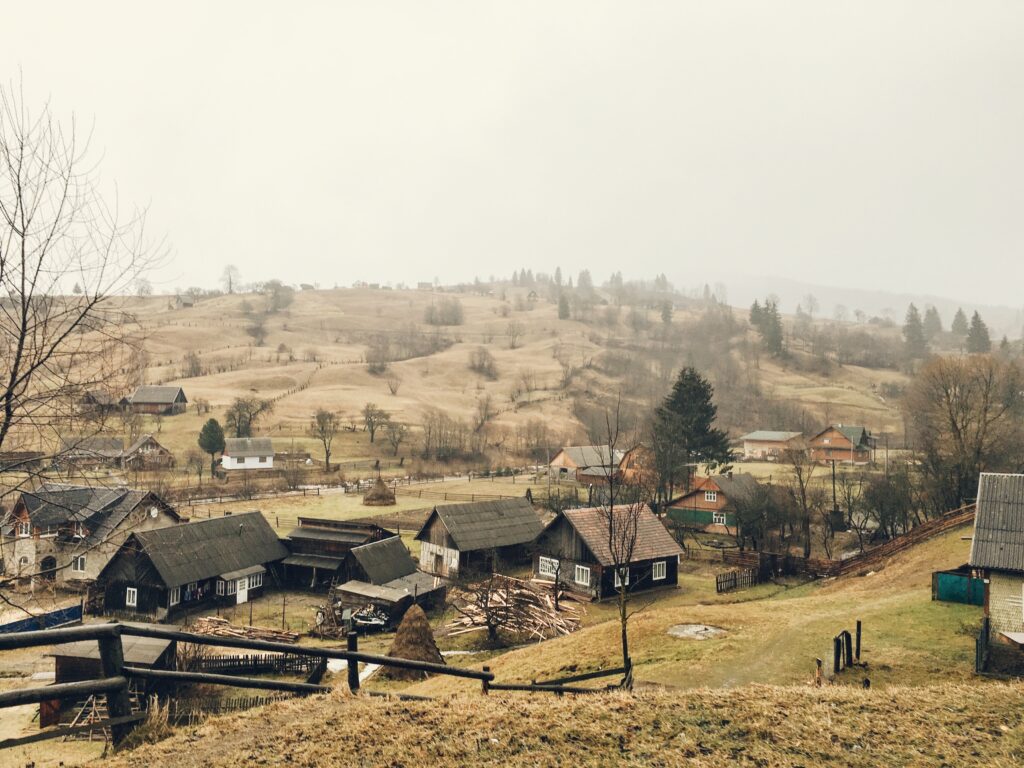
24 February 2022 – The Estonian foreign ministry summons the Russian ambassador
The Estonian foreign ministry today summoned the Russian ambassador, Vladimir Lipayev, to express the strongest possible condemnation for Russia’s attack on Ukraine. The ministry’s undersecretary, Märt Volmer, who met with the ambassador, said Russia’s attack constituted a complete disregard for not only international law but the fundamental principles of humanity.
“Estonia calls on Russia to adhere to international law and quickly end the war that only brings death and suffering. War cannot be the solution to any problem and it certainly does not resolve invented problems,” Volmer said.
24 February 2022 – People gather at the Russian embassy to protest the war
People started to gather today around 12 PM in front of the Russian embassy in Tallinn to protest against the Russian war against Ukraine and in support of the attacked country, demanding a truce and the retreat of the Russian forces from Ukraine. Hundreds of people have gathered to the protest as of 4 PM Estonian time. One Russian citizen at the protest carried a sign in Russian with the words, “I’m ashamed.”
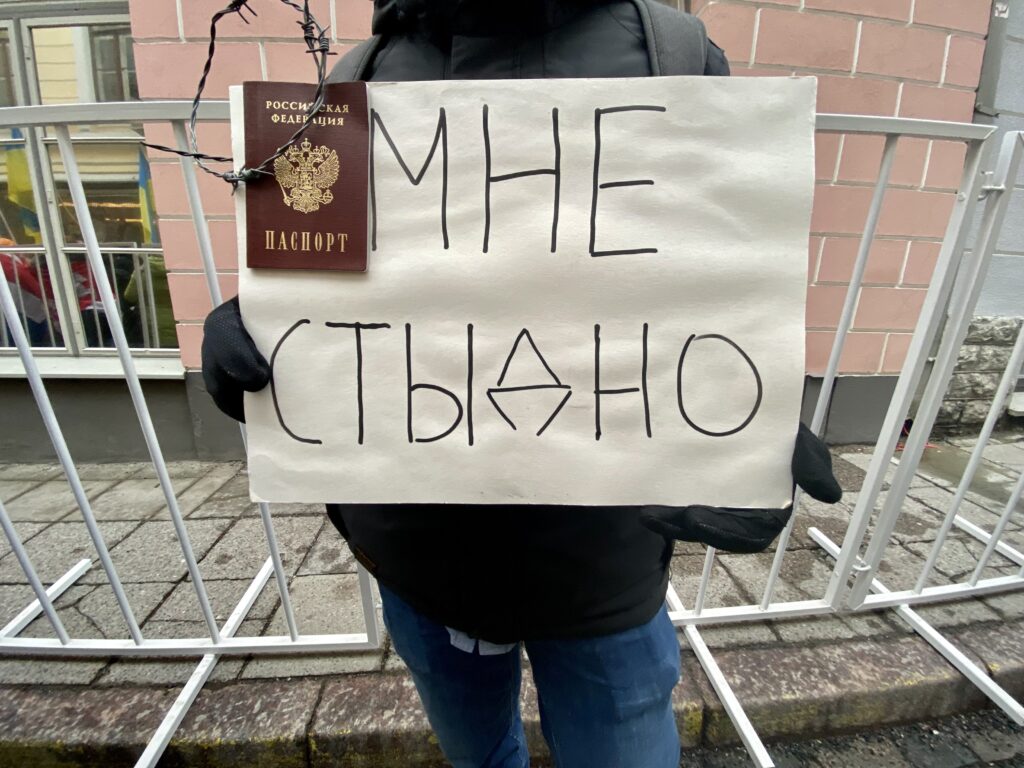
24 February 2022 – Estonia’s PM to the BBC: We’re going to help Ukraine with all the means that we can
The Estonian prime minister, Kaja Kallas, gave a short interview to the BBC this morning and said Estonia “will help Ukraine with all the means that it can”, including political support and by sending weapons. “We must do everything at EU and NATO level for this aggression not to expand,” she said. Kallas also reiterated there is no threat currently on Estonian borders.
24 February 2022 – Moscow threatens to shut down the Estonian Public Broadcasting’s site in Russia
The Russian technical oversight board has sent a letter to the Estonian Public Broadcasting, threatening to block its Russian-language portal in Russia, if the public broadcasting doesn’t take down its article where the Ukrainian foreign minister, Dmytro Kuleba, announced that Russia had started a full-scale invasion of Ukraine. The Estonian Public Broadcasting said it will not take the article down.
24 February – Demonstration in support of Ukraine to take place in Tallinn on Saturday
A large demonstration in support of Ukraine is to take place at Tallinn’s Freedom Square on Saturday, 26 February, at 3 PM Estonian time.
“We will rally to support the Ukrainian nation and condemn the aggressive war that Russia has started against Ukraine,” the organisers, including the local Ukrainian organisations as well as many Estonian NGOs, announced in Facebook. “We ask the Estonian government, the European Union and NATO to give Ukraine all the possible aid that could help them to resist the aggressor.”
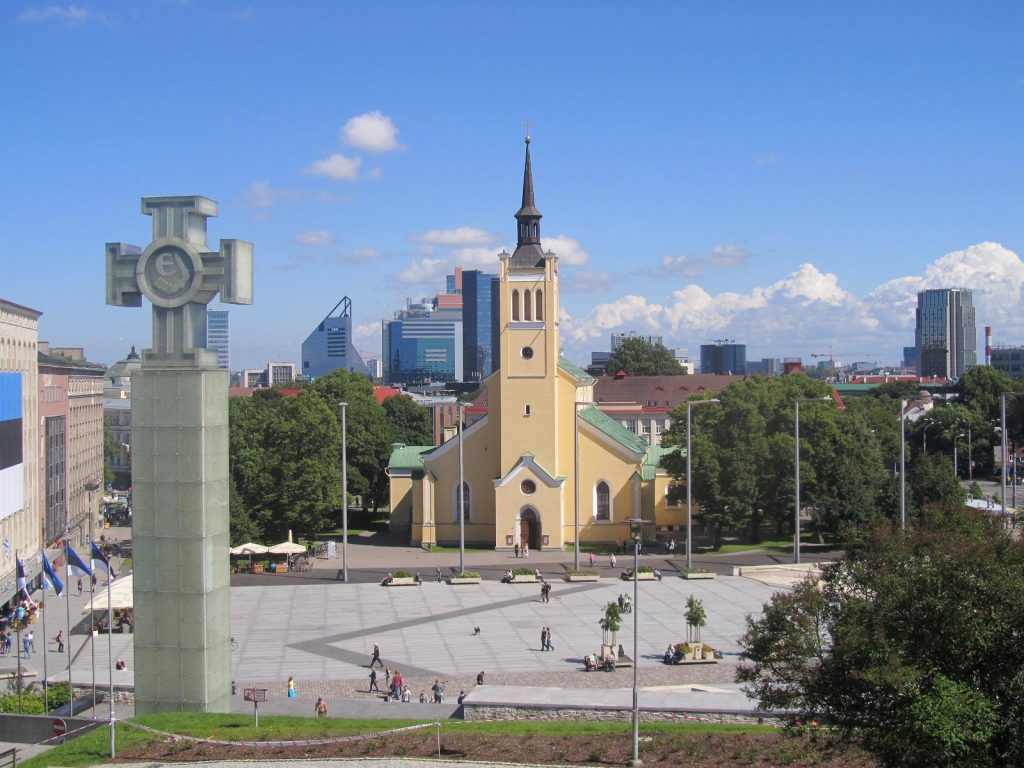
24 February 2022 – The Estonian foreign ministry allocates €200,000 in emergency aid for Ukrainian residents affected by war
The Estonian foreign ministry is allocating €200,000 in emergency aid to Ukraine to support people who have been forced to leave their homes, and to ensure an efficient cooperation between humanitarian aid organisations in mapping the needs of the people of Ukraine and providing aid.
“Now more than ever it is crucial to show Ukraine and the people of Ukraine that they are not alone and continue offering all possible assistance. Humanitarian assistance is a very important part of this, helping to reduce human suffering and protect and help residents in the crisis-hit areas of Ukraine who are the most vulnerable in the war,” Estonia’s foreign minister, Eva-Maria Liimets, said in a statement.
Half of the money will be allocated to the UNHCR, the UN Refugee Agency, that has a leading role in protecting refugees and helping internally displaced people and providing shelter and basic necessities. UNHCR is also one of the agencies responsible for protecting those in need.
The remaining half goes to the Office for the Coordination of Humanitarian Affairs (OCHA) that plays a central role in responding to humanitarian crises. OCHA is tasked with ensuring information exchange and cooperation between humanitarian aid organisations when providing humanitarian assistance. OCHA draws up assessments for humanitarian aid needs and works out joint requests for help for UN agencies in a crisis.
24 February 2022 – Lithuania declares state of emergency
Lithuania, the largest of the three Baltic states, that has a border with Belarus, has declared a state of emergency that allows a more flexible use of the state reserve and steps up state border protection. Russia has deployed 30,000 troops to Belarus that is bordering Ukraine – and at least some of the troops there are already used to attack Ukraine.
The Lithuanian prime minister, Ingrida Šimonytė, told the country’s public broadcasting that she spoke with her counterparts in Latvia and Estonia about asking NATO to evaluate the situation in Eastern Europe.

24 February 2022 – UK enforcements to start arriving in Estonia tomorrow
The United Kingdom will deploy about 850 more soldiers to Estonia, in response to the Russian aggression against Ukraine; the soldiers will complement the 1,200-strong British-led NATO battle group already stationed in the country.
The permanent secretary of the Estonian defence ministry, Kusti Salm, said at a press briefing this morning that the first additional British troops are due to arrive in Estonia on 25 February.
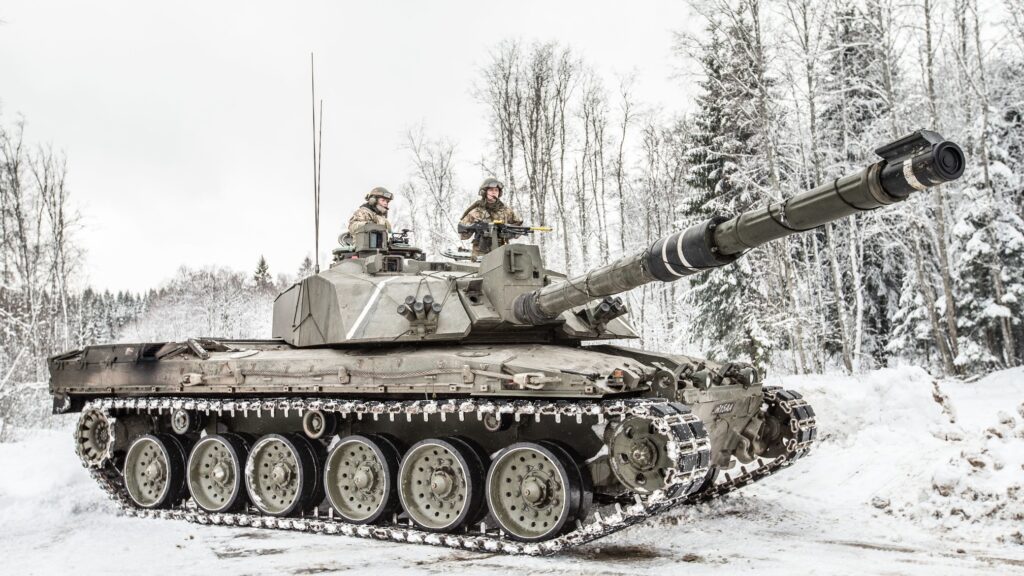
24 February 2022 – Estonians encouraged to go ahead with Independence Day celebrations
Estonia celebrates its Independence Day today – on 24 February 1918, the country was publicly proclaimed as an independent and democratic republic. Estonia won its independence from Russia and was subsequently occupied by the Soviet Russia – so Moscow’s renewed aggression is a stark reminder of the history Estonians know so well.
The Independence Day is a national holiday in Estonia and people are generally at homes and making traditional food. No doubt that many keep their eyes on what is happening in Ukraine today and many may also be somewhat nervous and concerned about the future of Estonia – but people are encouraged to go ahead with celebrating their country’s birthday.

24 February 2022 – President Karis: Russian leadership’s excuses to attack Ukraine are criminal
The Estonian president Alar Karis issued a statement this morning, saying he is “deeply shocked and disappointed”. “Moscow has demonstrated utter carelessness towards the lives of the Ukrainian people, as well as Russia’s own citizens,” Karis noted.
We publish Karis’s statement in full:
“The absurd excuses of Russia’s leadership to attack Ukraine are false, groundless and criminal. They have been dreamed up so that President Putin can justify aggression against a nation who has never threatened Russia. This is how the Soviet Union attacked Finland in 1939, Hungary in 1956, Czechoslovakia in 1968. Russia, the legal successor of the Soviet Union, is taking its cue from those attacks by initiating large-scale hostilities against Ukraine in 2022. Similarly, to how Moscow attacked Georgia in 2008 and Ukraine already in 2014.
Now we know definitively that Russia cannot tolerate a Ukrainian state which is democratic, independent in building a better future for itself, and belongs in Europe. We also know the reason: Russia is afraid of such a nation. Afraid of its neighbours’ independence to choose their own paths and their own allies. It is because of this fear that Russia decided to engage in a new war and attacked Ukraine.
Today, I wish to speak to the people of Estonia, and the Ukrainian, as well as the Russian people.
Dear Estonian people. I know that many of us are asking with some trepidation – could such events occur in Estonia? This worry, or even fear is understandable. But the answer to these questions is a resounding ’no’. Estonia is a member of NATO and the European Union, we are an inseparable part of the Euro-Atlantic family. We have strong and united Allies. The Estonian state and Estonian defence are solid. The events happening in Ukraine will no doubt affect us but there is no direct military threat to Estonia. However, we must, for example, be prepared for cyberattacks, as well as to receive refugees.
Dear friends in Ukraine. As your President Volodymyr Zelenskyy said: in the 21st century, there are no more wars that only happen to strangers. Russia’s renewed offensive is a declaration of war to all democratic nations and to the existing security order. By defending their own independence and freedom, Ukraine is fighting for all of Europe. You are not alone. We will help you with all means available to us. Our goal is to stop the aggressor and to make him retreat. Ukraine, we stand with you. And as you will not tire nor break, neither will we.
I am struck by sadness and concern when my thoughts go to the Russian people. The war that Russia’s leadership has initiated against Ukraine will bring much pain and mourning to many Russian families, from the Far East to Kaliningrad. I am sure that you did not want this war. Unfortunately, this is not much of a consolation when we think of all the potential victims of this conflict. As the President of Estonia, I can assure you that neither Estonia nor any other neighbour of Russia is a threat to it. On the contrary, we would like to see friendly relations between our countries. I deeply regret that Russia’s leaders do not share this wish.
Now that the masks have fallen, the response of democratic nations can only be: to stop Russia. This means even more forceful sanctions – both political and economic – against the aggressor and all-encompassing support to Ukraine, including giving a more concrete perspective for Ukraine’s Euro-Atlantic integration.
I have no doubts that Russia’s decision to choose war will only increase the unity and solidarity between the member states of the European Union and NATO Allies. We will act together, remain united and coordinate closely”.
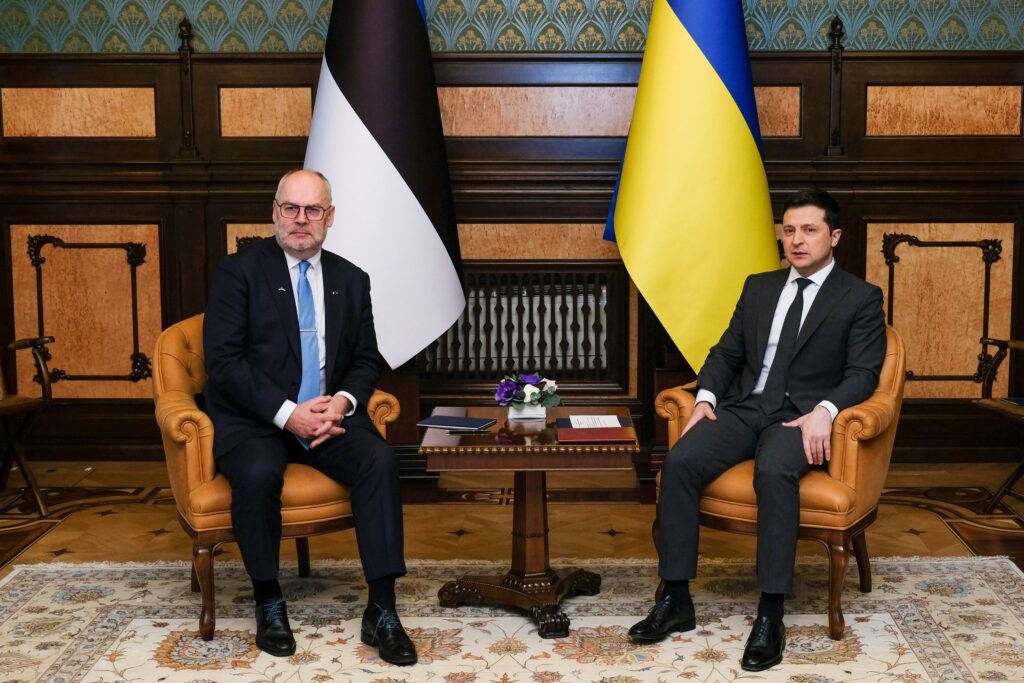
24 February 2022 – Estonian, Latvian and Lithuanian foreign ministers: Isolate Russia
Eva-Maria Liimets, Edgars Rinkēvičs and Gabrielius Landsbergis – the Estonian, Latvian and Lithuanian foreign ministers, respectively – issued a joint statement, condemning “in a strongest possible way” the open large scale Russian aggression against Ukraine. The ministers traveled to Kyiv yesterday and were due to meet their Ukrainian colleague, Dmytro Kuleba, there today – but due to the large-scale military action launched by Russia, the ministers were forced to cut their visit short and are now back home.
“This act of aggression is not acceptable, it’s a blatant violation of the international law, of all international norms and a crime against Ukrainian people that we condemn. All of us in the whole international community need to condemn it in a strongest possible way, to impose strongest possible sanctions on Russia, including disengaging Russia from SWIFT, isolating it politically and be firm in our support to the sovereignty, territorial integrity of independent Ukraine,” the ministers said.
“We would need to urgently provide Ukrainian people with weapons, ammunition and any other kind of military support to defend itself as well as economic, financial and political assistance and support, humanitarian aid. In this difficult moment we stand united with the people of Ukraine. Dear Ukrainian friends, we are in your historic capital Kyiv, we support you and do anything possible so that aggressor will pay a highest possible price. Slava Ukraini!”
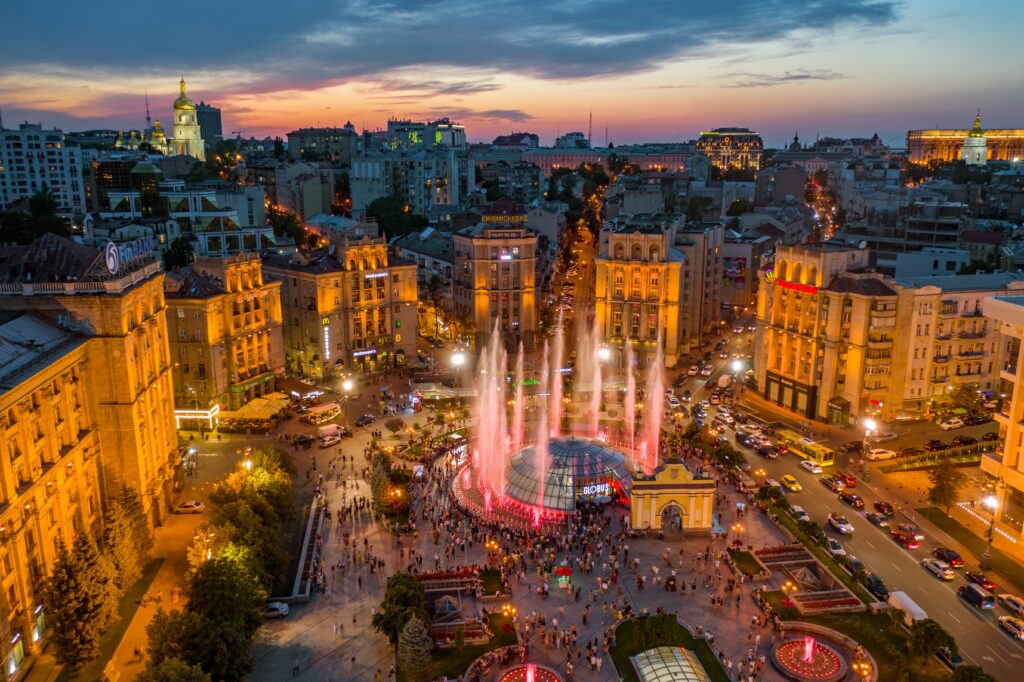
24 February 2022 – Estonian government requests consultations under Article 4 of the NATO Treaty
Following Russia’s military attack on Ukraine last night, the Estonian government decided to trigger NATO consultations under Article 4 of the North Atlantic Treaty with Latvia, Lithuania, Poland and other allied countries.
According to the country’s prime minister, Kaja Kallas, there is a “threat to the whole of Europe”, as Russia has launched a military attack against a sovereign European country. “Russia’s widespread aggression is a threat to the entire world and to all NATO countries, and NATO consultations on strengthening the security of the allies must be initiated to implement additional measures for ensuring the defence of NATO allies,” Kallas said in a statement, adding that “the most effective response to Russia’s aggression is unity”.
The government added in a statement that Russia’s military attack on Ukraine could have “direct and indirect effects on all European countries”. “We need to be prepared for possible incidents and prepare for impact management. Countries can be the target of, for example, disinformation campaigns and cyber attacks”.
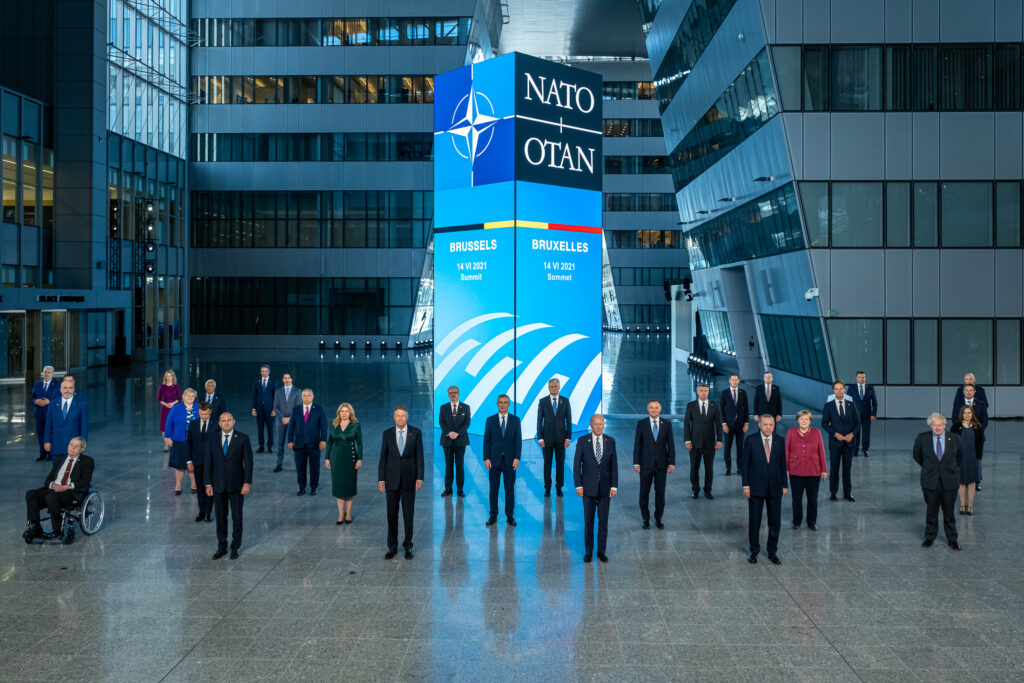
24 February 2022 – The Joint Baltic American National Committee condemns the Russian aggression, calls the Russian government “a mafia organisation”
The Joint Baltic American National Committee – an organisation that represents the American Latvian Association, the Estonian American National Council and the Lithuanian American Council – has issued a statement where it “vehemently condemns Russia’s ongoing aggression against Ukraine and its blatant breach of international law. It is not only an existential menace for Ukraine, but Moscow’s destabilising belligerency endangers the region, Europe and the global democratic order.”
“The United States and its allies must act now and seriously punish the [Russian president Vladimir] Putin regime for its invasion of Ukraine and gross violations of its national sovereignty. [The Joint Baltic American National Committee] welcomes the first steps taken by the US, its NATO partners, the European Union, Japan and other entities to enact crippling sanctions against Russia’s ruling elite and to build deterrence against Russia’s reckless military adventurism. … We strongly support additional US assets going to the Baltics to reinforce their defenses and gratefully acknowledge [US] president [Joe] Biden’s February 22 announcement of the imminent deployment of US troops and equipment to that effect.”
“For years, the world has watched Putin’s kleptocratic mafia organisation, which masquerades as the Russian government, terrorise Russia’s neighbors, and wreak increasing havoc around the world, whether by military infiltration of Belarus, creeping occupation in Georgia, bombings in Syria, energy blackmail, information warfare or cyberattacks.”
23 February 2022 – The parliament adopts a statement in support of Ukraine
The Estonian parliament today adopted a statement in support of Ukraine, strongly condemning the Russian aggression against Ukraine, its sending of troops to the country and its illegal recognition of the occupied regions. The parliament also condemned “the violation of the fundamental principles of the United Nations by the Russian Federation. By threatening to use force, the Russian Federation is brutally violating the sovereignty of Ukraine and undermining its territorial integrity by using force.”
The parliament also condemned “the provocations in East Ukraine and the spreading of lies in the global media space by the Russian Federation”, and said it considered it important “that the countries of the world support Ukrainian economy and decisively increase military assistance, as Ukraine is a victim of unprovoked aggression by the Russian Federation”.
The parliament also called on the member states to grant Ukraine the status of a candidate state of the European Union and a roadmap to membership in NATO.
However, only 72 members of the 101-strong parliament voted in favour of the statement. It’s noteworthy that ten members of the Centre Party – that has a cooperation agreement with United Russia, the party of the Russian president, Vladimir Putin – didn’t support the statement. One of them didn’t vote and nine didn’t show up for the vote.
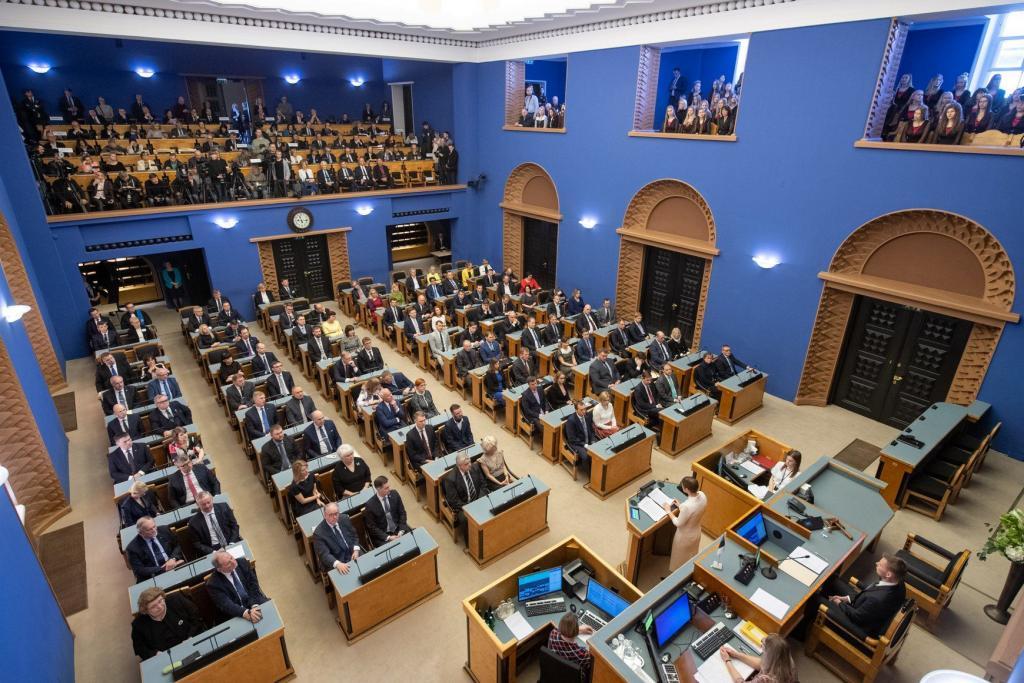
23 February 2022 – Demonstration in support of Ukraine in Tallinn
About a hundred people gathered in front of the Russian embassy in Tallinn today to rally in support of Ukraine, in the face of Russia’s military pressure. The peaceful demonstration, called “Putin Hands Off Ukraine!”, was organised by members of the Ukrainian community in Estonia.
The rally was mainly attended by local Ukrainians, but a few Estonians and members of the local Georgian community also turned up. Approximately 27,000 ethnic Ukrainians live in Estonia, comprising about two per cent of the entire population. By comparison, there are over 322,000 ethnic Russians in Estonia – or 24 per cent of the population.
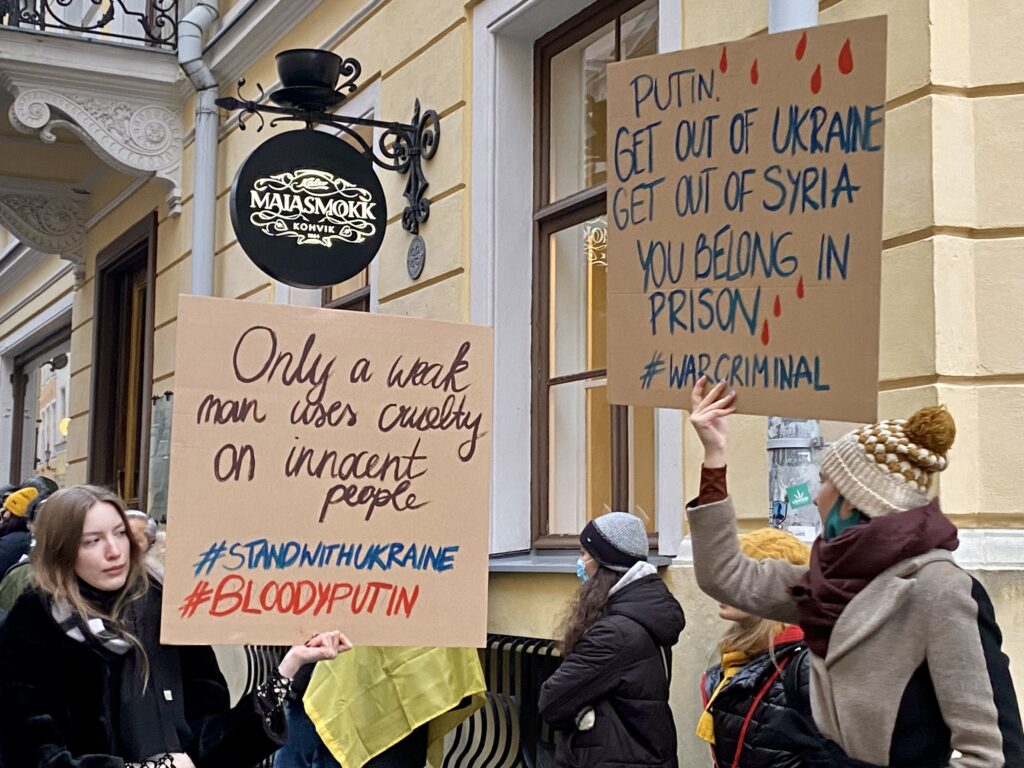
23 February 2022 – Estonian MEP: Sanctions will not stop Putin
Urmas Paet, an Estonian member of the European Parliament (Reform Party), said that if the Russian president, Vladimir Putin, had decided to start expanding the Russian separatist-controlled territory in Ukraine, sanctions will not stop him.
“I think that in fact, if Putin has decided to continue the military action on Ukrainian territory anyway, to start expanding the areas under his control, for example – then whatever the sanctions are, they will not stop him at this point,” Paet told the Estonian Public Broadcasting.
“The other side of the coin is that if the European Union and the United States do impose their maximum sanctions, the question is what else to react with if Putin takes next steps,” he noted. Paet added that sanctions were also limited in the sense that they did not involve a large part of the world.
23 February 2022 – Estonian, Latvian, Lithuanian and Ukrainian foreign ministers to meet in Kyiv
Eva-Maria Liimets, Edgars Rinkēvičs, Gabrielius Landsbergis and Dmytro Kuleba – the Estonian, Latvian, Lithuanian and Ukrainian foreign ministers, respectively – are due to meet in the Ukrainian capital, Kyiv, on 24 and 25 February. “The main purpose of the visit is to express support from the Baltic states to Ukraine in the face of Russia’s military pressure,” Liimets said in a statement ahead of the visit.
The ministers also plan to meet with the Ukrainian prime minister, Denys Shmyhal, and defence minister Oleksii Reznikov.
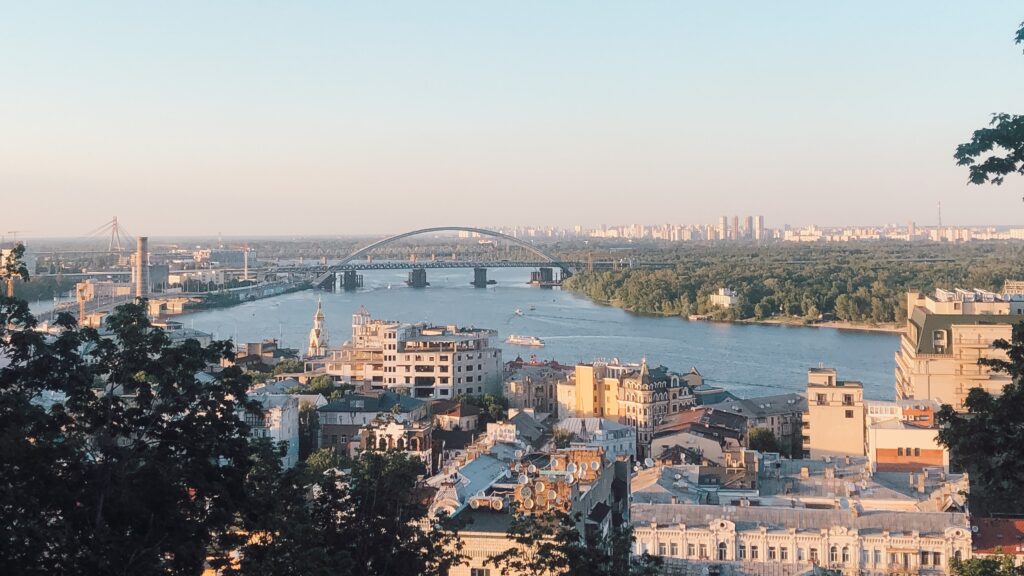
23 February 2022 – The city of Tallinn supports the Ukrainian Red Cross
The Tallinn City Government has decided to allocate €25,000 to the Estonian Red Cross to support the Ukrainian Red Cross in providing humanitarian aid to the people of Eastern Ukraine.
“The Ukrainian Red Cross approached us and asked for our help to ensure that the residents of the contact line are provided with the necessities of daily life. All kinds of hygiene items for adults and children are needed, as well as bed linen, blankets, pillows, sleeping bags, etc.,” said Harri Viik, the Estonian Red Cross’ president, adding that everyone can contribute by donating via the Red Cross website (in Estonian only).
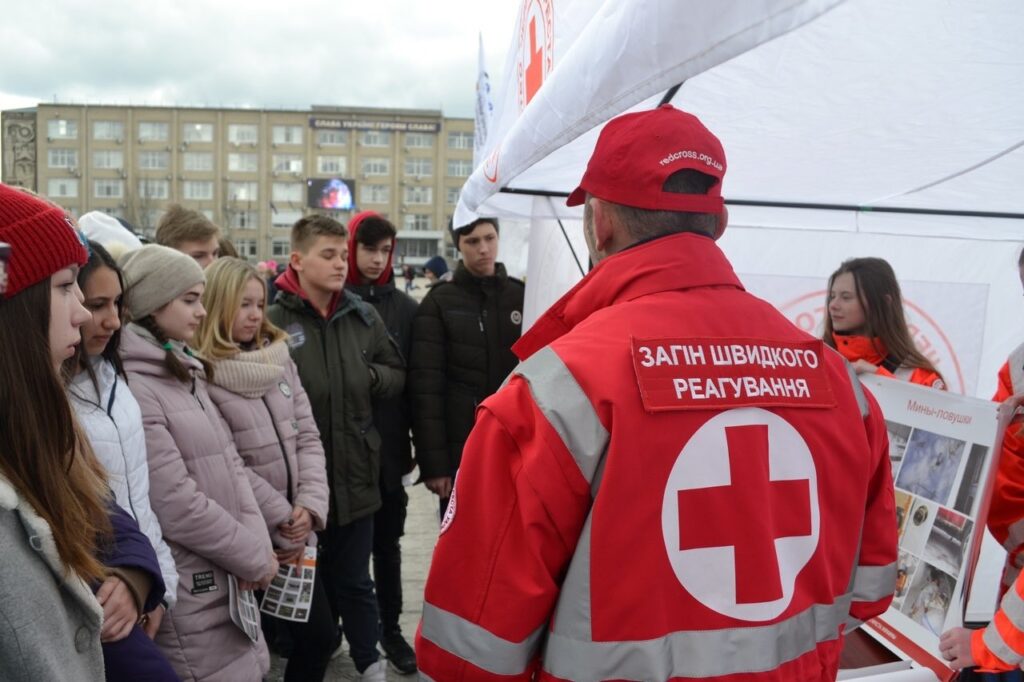
23 February 2022 – President Karis “hopeful” Russia will not invade Ukraine
The Estonian president Alar Karis gave a rather optimistic interview to Sky News, a British news channel. Russia’s invasion of Ukraine will go no further as the imposed sanctions bite, Karis told Sky News during a visit to Kyiv, the capital of Ukraine.
22 February 2022 – A rally in support of Ukraine to take place in Tallinn on Wednesday
A demonstration called “Putin – Hands Off Ukraine!” is due to take place in front of the Russian embassy in Estonia, in Pikk Street in Tallinn’s Old Town on 23 February at 5 PM Estonian time.
“Unfortunately, the events of the latest weeks and days do not show any de-escalation of the conflict from Russian Federation. From yesterday’s speech of Russian president, we understood that Russia was not willing to find ways to resolve the conflict in diplomatic way,” one of the organisers of the protest, a member of the local Ukrainian community, wrote in Estonia’s largest expat Facebook group.
“Russia denies Ukraine as an independent country, Russia denies Ukrainians as a nation. I believe many of you have friends, colleagues, neighbours or classmates who are Ukrainians. I hope Ukrainians showed you what beautiful, positive, smart and hospitable people we are, with authentic culture, own history and big hearts. We want to ask for your support and show that we are all against the war. This event is officially organised by the Ukrainian community in Estonia”.
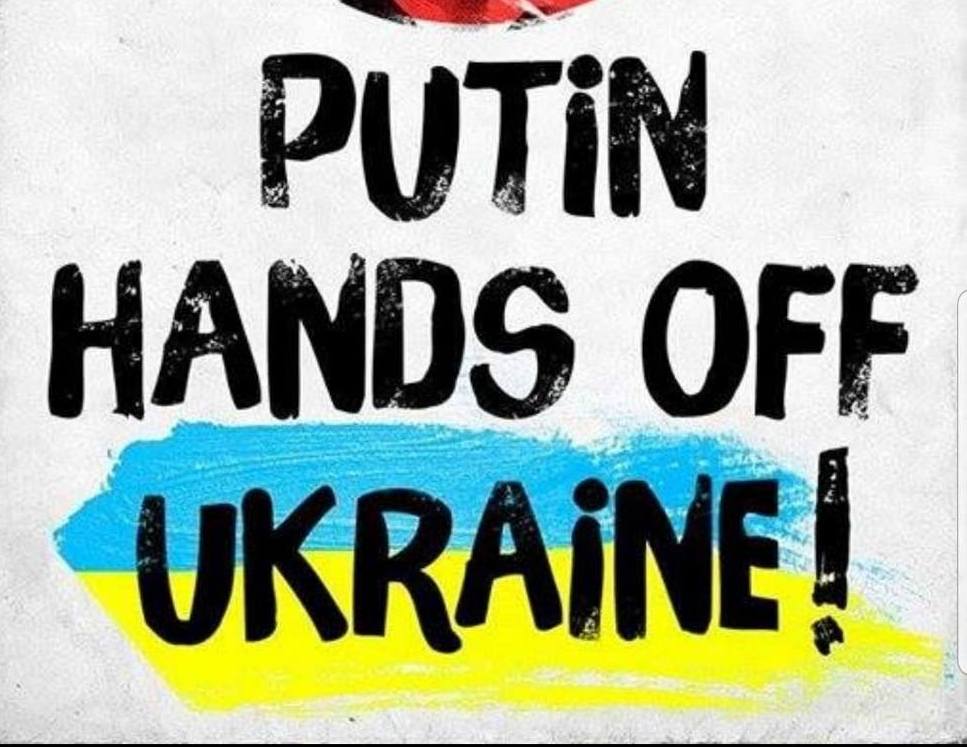
22 February 2022 – Estonia’s foreign ministry summons Russia’s chargé d’affaires
The Estonian foreign ministry today summoned the chargé d’affaires of the Russian embassy, Sergei Nalobin, in light of the “recognition” of the independence of the so-called “people’s republics” of Donetsk and Luhansk by Russian president Vladimir Putin.
Undersecretary Rein Tammsaar condemned in the strongest terms the so-called recognition and the entry of Russian military units to this part of Ukraine’s territory. He said Estonia considered this a gross violation of international law, including the UN Charter, the Helsinki Final Act, the Charter of Paris and the Budapest Memorandum.
Tammsaar also told Nalobin that Estonia, in cooperation with the European Union, would respond to Russia’s actions with new restrictive measures, including against the regions Russia recently “recognised”. In case of a continued Russian aggression, the EU is prepared to implement additional measures. Tammsaar also reaffirmed Estonia would continue to support Ukraine’s statehood and territorial integrity in every way possible.
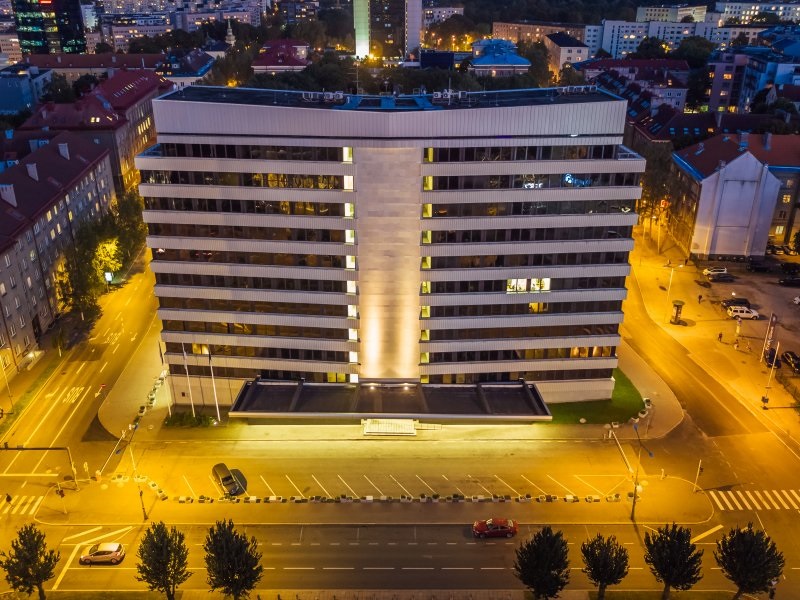
22 February 2022 – Estonian World Council calls for more assistance for Ukraine
The Estonian World Council, an umbrella organisation for Estonian communities in Canada, US, Sweden, UK, Germany, Australia, Latvia, Lithuania, Russia and Ukraine, issued a statement today, calling upon NATO, the European Union and its partners to increase military and economic assistance to Ukraine, shut down the Nord Stream 2 gas pipeline and immediately implement severe sanctions against Russia, adding that the future of a democratic, free Ukraine and Europe as a whole was at stake.
22 February 2022 – Biden to send additional troops to Estonia
The US president, Joe Biden said today that he’s authorised additional movement of US forces and equipment already stationed in Europe to support America’s Baltic allies Estonia, Latvia and Lithuania against potential Russian threats.
“Let me be clear: these are totally defensive moves on our part; we have no intention of fighting Russia,” Biden said. “We want to send an unmistakable message, though, that the United States, together with our allies, will defend every inch of NATO territory and abide by the commitments we made to NATO.”
The Estonian defence minister, Kalle Laanet, confirmed Biden’s statement, saying the US was going to provide additional support to strengthen Estonia’s air defences. Laanet told Delfi that this would mean there will be additional US fighter jets stationed at the Ämari Air Base.
The US Defense Department later announced that 800 soldiers from an Italy-based infantry battalion task force will be deployed to the Baltic states, without specifying to which country. Also, up to eight Air Force F-35 strike fighters from Germany will be sent to the Baltics, as well as an unspecified location on NATO’s southeastern flank.
In addition, an attack aviation battalion with 20 AH-64 Apache helicopters will be sent from Germany to the Baltics, and an attack aviation task force with 12 Apaches will be mobilised from Greece to Poland.
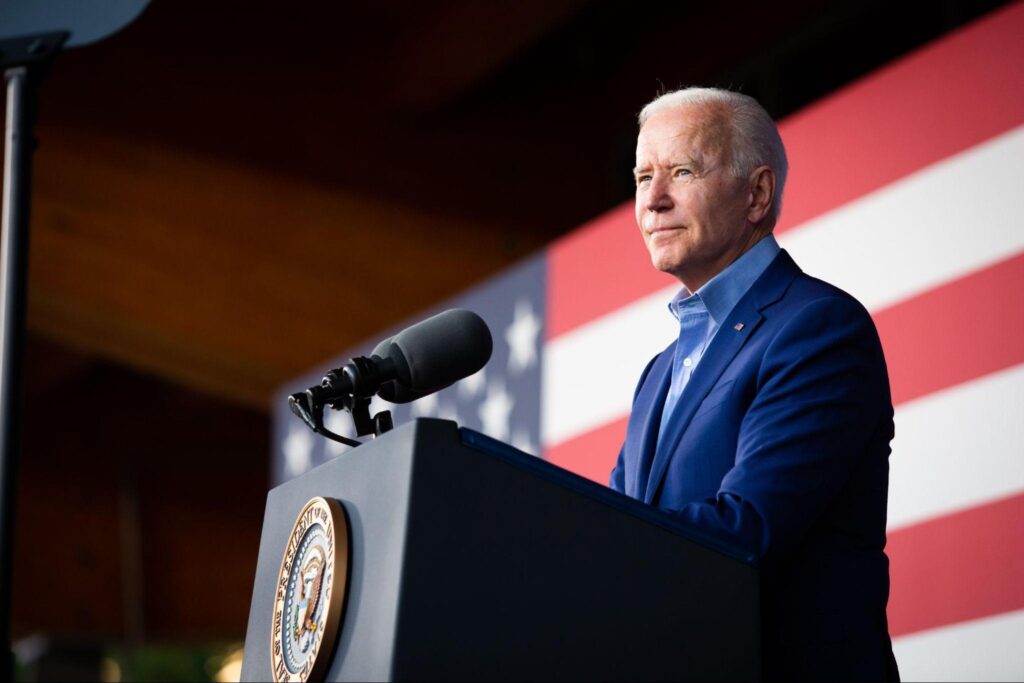
22 February 2022 – Estonian defence minister: Putin’s plan isn’t limited with a small part of Ukraine
The Estonian defence minister, Kalle Laanet (Reform) said that Russian president Vladimir Putin’s decision to recognise the self-proclaimed “people’s republics” – Donetsk and Luhansk – in their entirety (meaning also the areas that are under the Ukrainian control, so far) wasn’t surprising and shows that Putin is going forward with his plans.
“I think that Putin has a plan, according to which he moves, and that doesn’t include just a small piece of Ukraine,” Laanet told news portal Delfi. “He performs piece by piece, and we really don’t know where he wants to end.” The minister added that everything that Putin was doing was a “theatre”.
22 February 2022 – The Estonian government condemns Russia’s actions
The Estonian government today condemned the decision of Russian president Vladimir Putin to recognise the separatist “people’s republics” of Donetsk and Luhansk and to bring additional troops to the region, saying this was a grave violation of international law, which increases the possibility of large-scale hostilities and threatens the security of Europe as a whole.
“The members of the Estonian government unequivocally condemn the recognition of the separatist people’s republics of Donetsk and Lugansk. Under the guise of a peacekeeping mission, an attack is being carried out against Ukraine’s statehood, sovereignty and territorial integrity,” the Estonian prime minister, Kaja Kallas, said in a statement.
“Russia unilaterally terminated the Minsk agreements and made further diplomatic efforts very difficult. After eight years of concealing its involvement in eastern parts of Ukraine behind the separatist republics, Russia has now openly perpetuated its aggression against Ukraine. Moreover, it may be a pretext for wider aggression against Ukraine. We are working for unequivocal international condemnation and response. The EU must immediately impose strict sanctions, and NATO must express its own assessment of events. In this increasingly tense situation, Estonia will continue to support Ukraine in every way possible and to stand up for a united and swift response from democratic countries,” Kallas added.
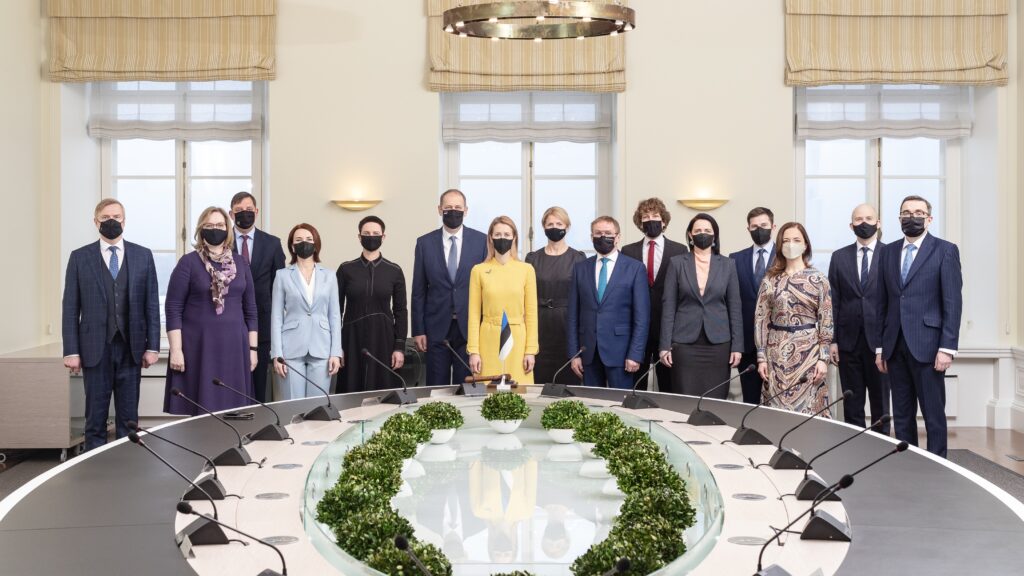
22 February 2022 – Estonia prepared to take 2,000 Ukrainian refugees
According to the Estonian foreign minister, Eva-Maria Liimets, Estonia has the capacity to accept around 2,000 war refugees from Ukraine. According to the weekly Maaleht, the state and the lodging establishments in the country have already discussed the possibility to use empty hotel rooms to accommodate the potential refugees. Liimets also said that, should the number of refugees be larger, Europe will start refugee redistribution programmes.
22 February 2022 – Russian parliament grants Putin permission to use the country’s military abroad
The Russian president, Vladimir Putin, today asked the Federation Council – the upper house of the Russian parliament – for permission to use the country’s military abroad; the Federation Council granted the permission shortly afterwards.
One of the Russian deputy defence ministers, Nikolai Pankov, said Russia was left without a choice. “The Ukrainian leadership has embarked on the path of violence and bloodshed. On the borders of the DPR and LPR, Ukraine has built up a 60,000-strong military group, which includes heavy armored vehicles, missile systems, and multiple rocket launchers,” Pankov said. The DPR and LPR stand for the self-proclaimed Donetsk and Luhansk “people’s republics”.
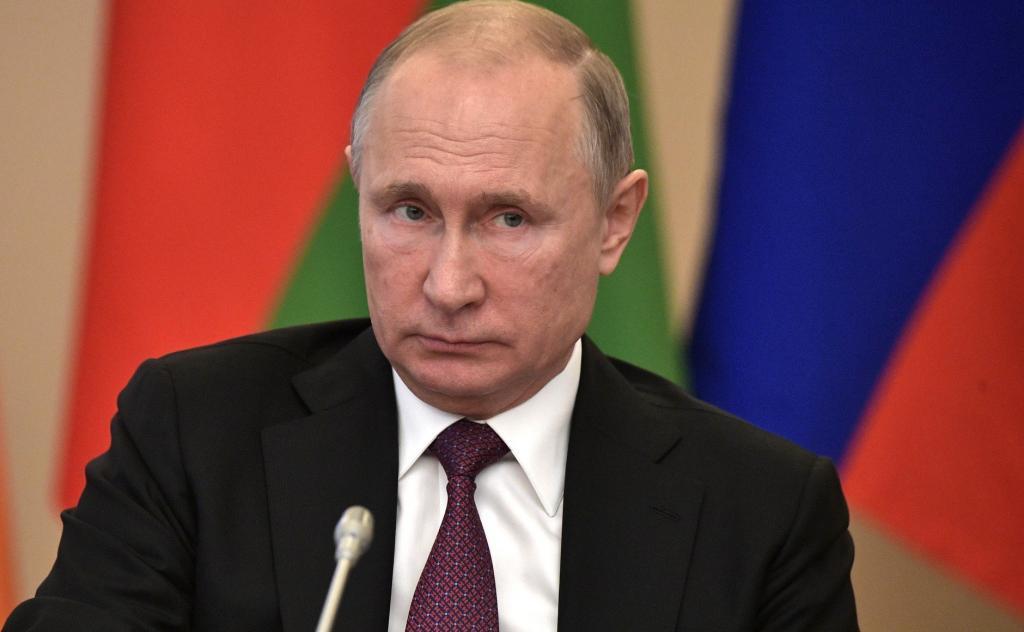
22 February 2022 – PM: Estonian ministries to prepare for a wide-scale war in Europe
The Estonian prime minister, Kaja Kallas, said on Facebook that a wide-scale war in Europe will affect not only Ukraine, but all of our lives. To that end, all government ministries have weighed the effects of an escalating war in Ukraine to Estonia.
“We’ve looked into potential developments according to every ministry’s administrative areas so that we can plan the necessary actions and resources. For example:
“The interior ministry constantly modernises its crisis plans;
“The social ministry prepares for accepting war refugees;
“The economy and communication ministry is checking the cyber security of the economically important services;
“The finance ministry has compiled plans to ensure cash flow in case of a crisis and analysed the effects of the crisis to the Estonian economy;
“The Bank of Estonia is checking the readiness of the banking system;
“According to the administrative areas, we’ve checked the status of the country’s crisis funds.“
“There is no direct military threat against Estonia and NATO members. However, in addition to the state, the local municipalities, the private sector and every person will have to prepare for unexpected crises,” Kallas added.
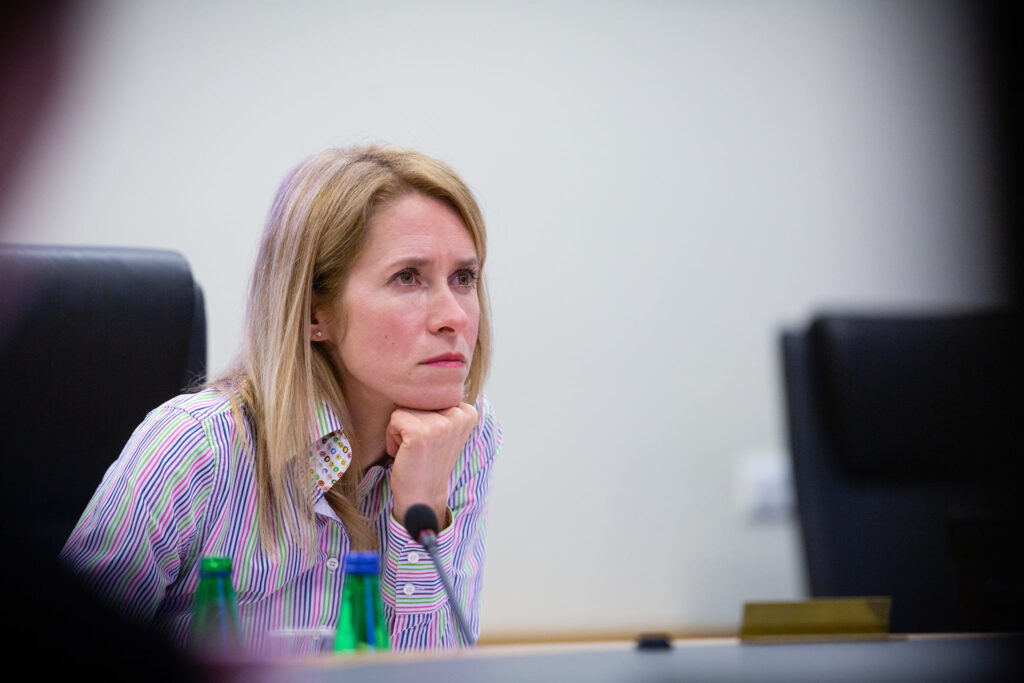
22 February 2022 – MEP Terras: Putin wants to make the government in Kyiv more favorable
General Riho Terras, an Estonian member of the European Parliament and a former commander of the Estonian Defence Forces, told the Estonian Public Broadcasting that Russia’s actions in Ukraine will not end with Donetsk and Luhansk, because the Russian president, Vladimir Putin, wants to make the government in Kyiv more favorable to him – and that can be done only by attacking Kyiv.
“Kyiv has always carried an important role in regard to the Russian Empire. It’s been the cradle of the Russian Orthodox church and the empire. Losing that would be hard for Putin. Putin doesn’t want to go into the history as a tsar who lost such an important part of the Russian cultural space,” Terras said on the public broadcasting’s morning programme.
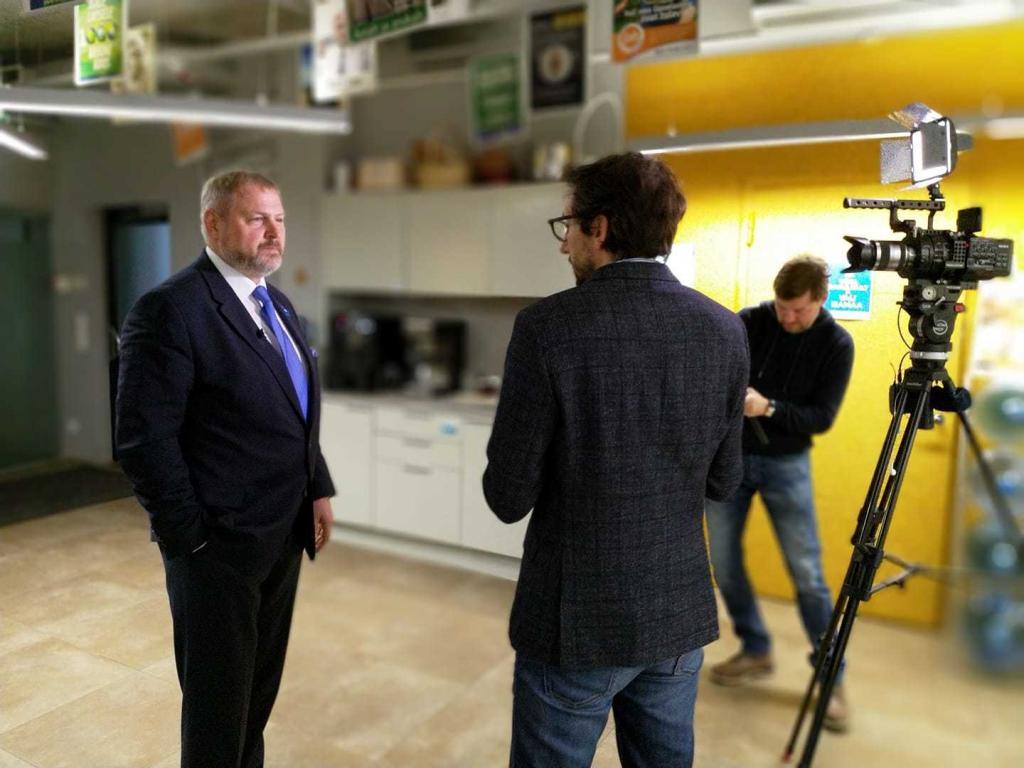
22 February 2022 – Ten European defence ministers condemn Russia’s actions
The defence ministers of the Joint Expeditionary Force – the UK, together with Denmark, Estonia, Finland, Iceland, Latvia, Lithuania, the Netherlands, Norway and Sweden – met today at Belvoir Castle in the UK and issued a statement, condemning Russia’s actions in Ukraine. “The Russian Federation has recognised Ukraine’s Donetsk and Luhansk regions as independent states, breaching Minsk agreements and international law. All ten defence ministers are united in our condemnation of that unjustified act, the build-up of Russian forces on the border with Ukraine, and further incursion in the Donbas region.”
“We strongly support the sovereignty and territorial integrity of Ukraine and reiterate the right of all sovereign nations to choose their own path, their own security arrangements and their own alliances, free from external aggression and coercion, as a fundamental principle of the European security order. We call on Russia to de-escalate and encourage them to engage in transparent dialogue, including through the OSCE and the NATO-Russia Council, in order to reduce tensions. We also condemn the instrumentalisation of migration flows and other hybrid activity towards Latvia, Lithuania, and Poland by the Belarussian regime.”
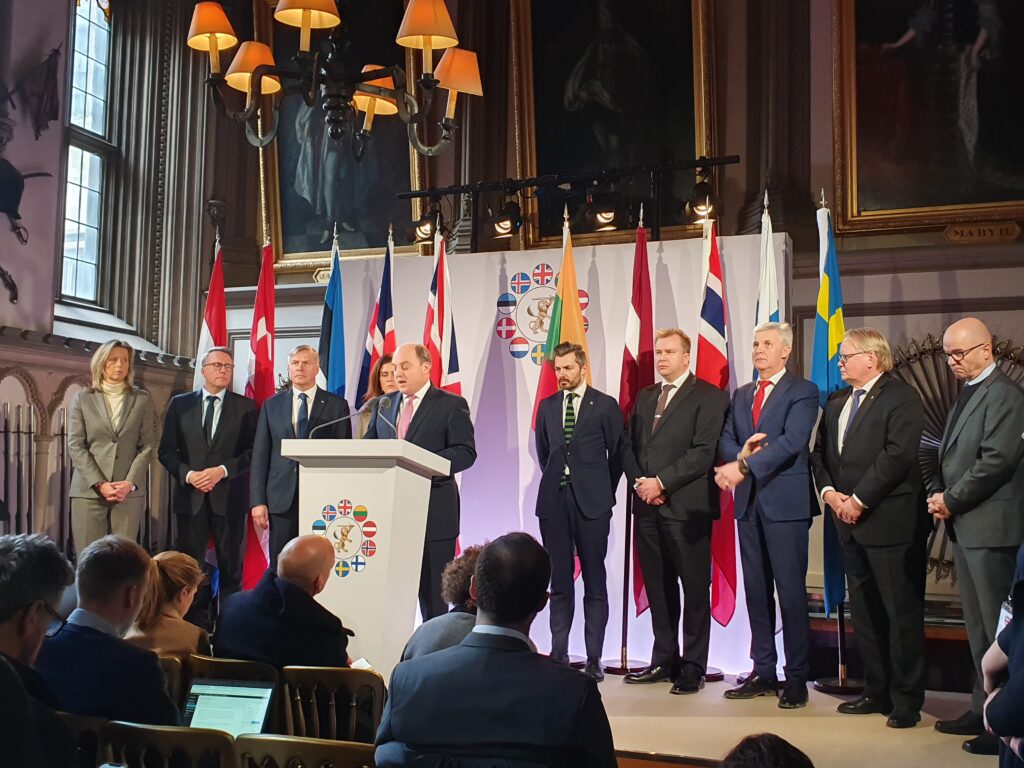
22 February 2022 – Senator Rubio: Putin can use the same argument to take the Baltics
US senator from Florida, Marco Rubio (GOP), a member of the Senate Foreign Relations Committee, told CBS on 22 February that Russian president Vladimir Putin’s argument that Ukraine was part of the Russian Empire and invented by the Bolsheviks can be used to take over the Baltic countries, too.
“If you listened that speech yesterday, the argument [Putin] used for why invading Ukraine … you can make that argument about [the] Baltic states who are now all members of NATO. Many of these Baltic states were actually part of the old Russian Empire even longer than Ukraine. You can use the same argument to take those. So [Putin] is not going to stop with Ukraine if he’s allowed. He must pay a big price for it.”
22 February 2022 – Journalist: What Putin said about Ukraine, can be said about Estonia, too
Estonian journalist and former politician, Andrei Hvostov (who until 22 February 2022 was a member of the Social Democrats) wrote in an opinion piece in the weekly Eesti Ekspress that Russian president Vladimir Putin’s declaration about Ukraine being invented by Bolshevist Russia can also be applied to Estonia. “Putin believes that Ukraine as an independent nation was set up by the Russian Bolsheviks, led by [Vladimir Ilyich] Lenin. They declared the right of independence for the nations living in the periphery of the former Russian Empire after then 1917 coup.”
Hvostov points out that Putin’s speech on 21 February was historic in the sense that he declared disowning the country’s communist past in a geopolitical sense. “Everything that happened on the Tsarist Russian Empire’s territory after the Communist coup in 1917 is somehow legally invalid.”
The journalist goes on to say that the birth document of the Republic of Estonia is the Tartu Peace Treaty that was signed by Bolshevik Adolf Joffe – who, according to Putin, is a member of the criminal gang that killed the Russian Empire. “Everything that Putin said in his history lecture about Ukraine can be, with the same persuasiveness, applied to Estonia.”
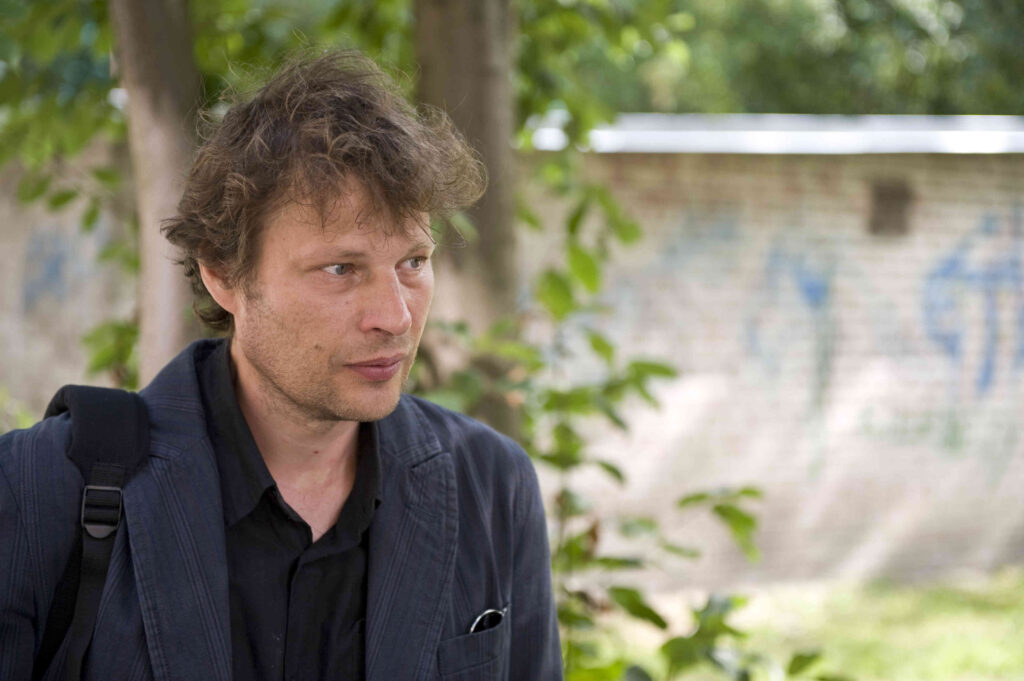
22 February 2022 – MP: The Russian economy could be wiped out, were there will
According to the Estonian MP and former foreign minister, Jürgen Ligi (Reform), Europe could “wipe out the Russian economy if there were will”. “Most of Russia’s export are energy bearers and for that money, [Russia] is buying Western technology,” Ligi said on Facebook.
“The EU only spends 1% of its GDP on buying energy from Russia. … In reality, everything depends on the amount of the West’s comfort and fragility. An aggression doesn’t cost anything for Russia, but its economy could be made perfused and incapable.”
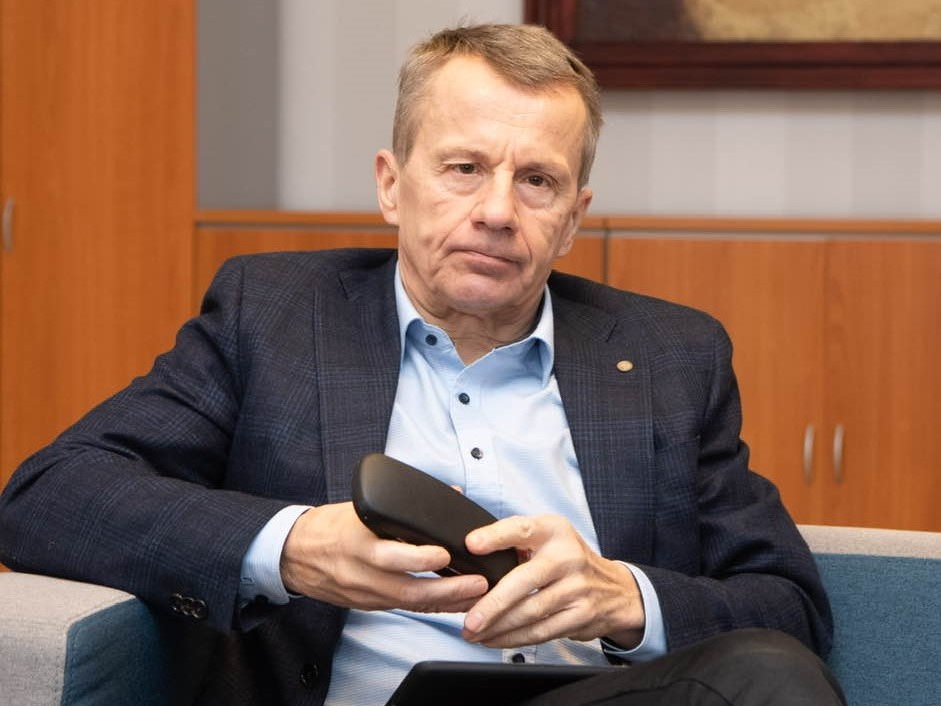
22 February 2022 – Expert: only sufficiently strong sanctions would alleviate the crisis
Kristi Raik, the director of the Estonian foreign policy institute, told Estonian Public Broadcasting that the Russian president, Vladimir Putin, who has lost the sense of reality, didn’t seem to seek a way back from the crisis and his behaviour may turn self-destructive. The chance to stop him, according to Raik, is in sufficiently strong sanctions that would signal him that going forward with the aggression will become too expensive.
Raik pointed out that the Western stances on new strong sanctions have been about one scenario – Russia’s widespread attack against Ukraine. “Now Putin has taken a step that viciously breaches the international law and Ukraine’s territorial integrity, but this is not the attack the West foresaw. To maintain unity becomes more difficult,” she told the public broadcasting.
She noted that additional sanctions against Russia will definitely come, but if they remain considerably weaker than the prepared strong sanctions, it will send a wrong signal to Putin and create disagreements among the Western states. “Right now, we really need strong countersteps, including strong sanctions.”
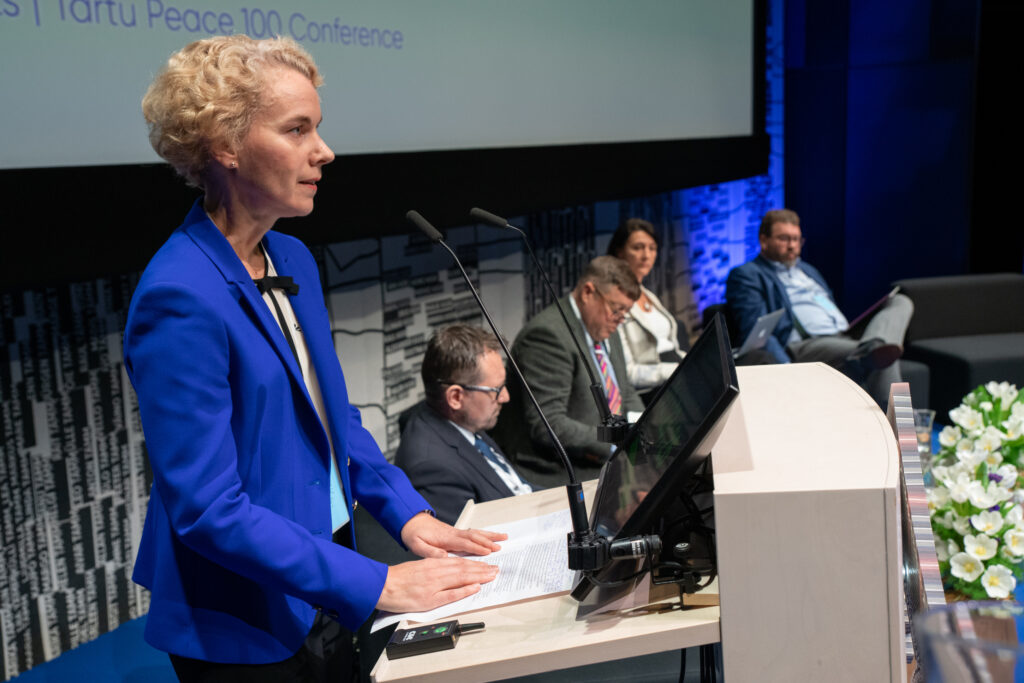
22 February 2022 – Security expert: Russia thinks the West is weak
Rainer Saks, a former chief of the Estonian foreign intelligence and a former chief of staff of the Estonian foreign ministry, said the Russian leadership thinks the Western countries are weak and therefore Russia hopes it will end Ukraine’s Western integration.
“The way Russia operates towards Ukraine comes from the fact that it regards the Western reactions essentially non-existent,” Saks said on a radio programme called “Vikerhommik”. “Russia thinks it can act and it regards the Western countries as weak. And the question is not whether the Western states actually are weak, the question is how Russia sees them.”
He said it was a paradox of a historical window that Russia’s leadership has defined the current time window as the ending of Ukraine’s integration towards the West. “And I’m not talking about stopping it, but finishing. Ending forever. That’s why this is happening.” Saks also noted on the Estonian Public Broadcasting radio programme that if the Western countries impose sanctions on Russia, then the Russian president, Vladimir Putin, is prepared to strategically suffer through them.
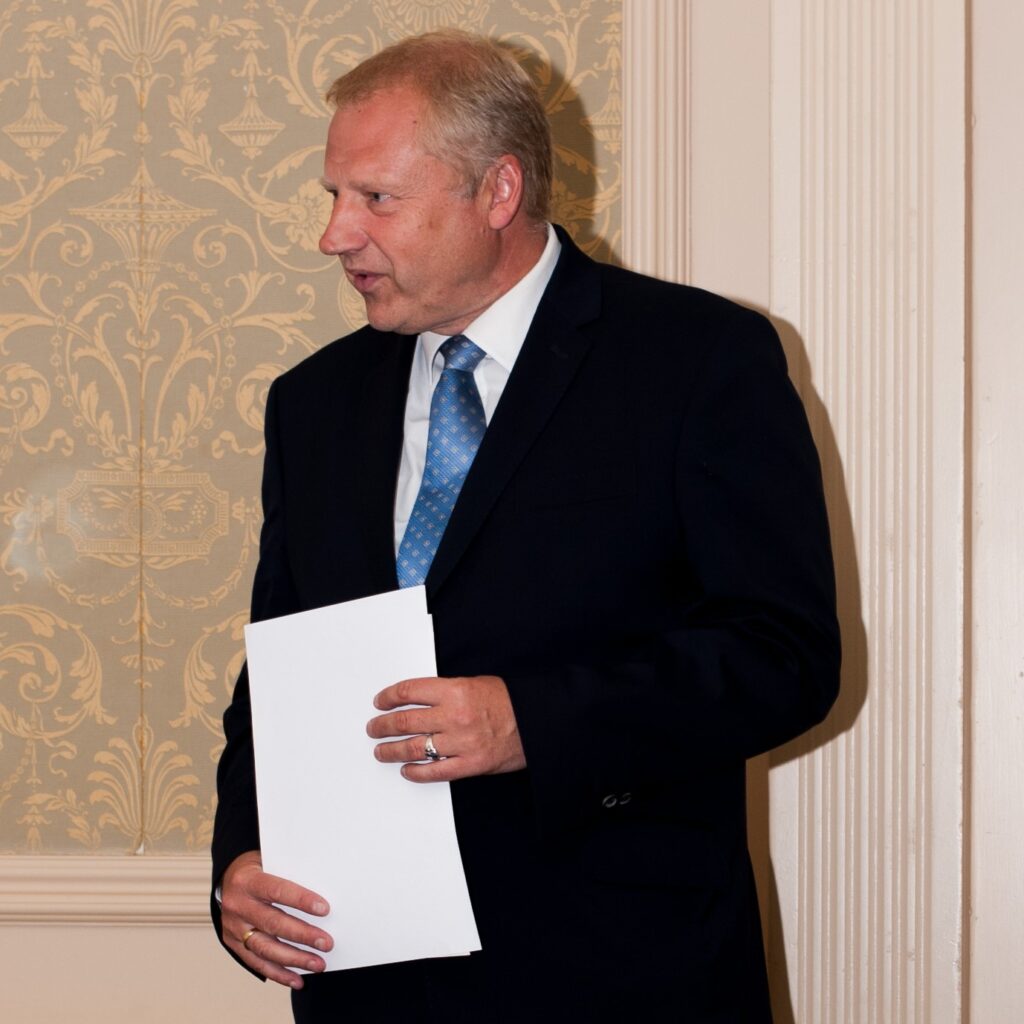
22 February 2022 – Telia and Elisa to terminate transmitting Russian TV channels
Estonian cable operators Telia and Elisa, owned by the namesake Swedish and Finnish telecommunication companies, respectively, decided to terminate cooperation with a company called Nord Print that owns the rights to transmitting 26 Russian TV channels.
Both operators will stop transmitting the channels with a two-month notice, ie at the end of April. Telia said the background of Nord Print is not compatible with the standards of responsible business; Elisa said it’s terminating the cooperation because of public interest and the expectations of the society.
The TV channels that Nord Print has rights to transmit in Estonia are: PBK Eesti, REN TV Estonia, NTV Mir Estonia, Dom Kino Baltic, Карусель, Музыка Первого, Время: далекое и близкое, Телекафе, Бобер, Дом кино Премиум HD, НТВ Сериал, НТВ Стиль, НТВ Право, О!, Поехали!, КиноМикс, Наше Новое Кино, Родное Кино, Индийское Кино, КиноКомедия, КиноСерия, КВН ТВ, М-1 Глобал, Кухня ТВ, Бокс ТВ Плюс, HD Life.

22 February 2022 – Estonian-Russian MP: Russia defends its own interests
Mikhail Stalnukhin, an ethnic Russian member of the Estonian parliament (Centre Party), told the Estonian news outlet, Delfi, that Vladimir Putin’s 21 February speech, during which he announced that Russia will recognise two areas of Ukraine that are controlled by Russian-backed separatists, was “logical and understandable”. “Message to the Russian people. I think it will go down well,” Stalnukhin noted.
He referred to Putin’s claim that “Ukraine was planning to acquire nuclear weapons” and argued that in a similar situation, “Estonia would behave in the same way [as Russia] if it had the opportunity”.
He exemplified that “the US would send in its troops if something posed a threat to their country”. “That’s how it is in world politics. To think that Russia is a friendly, small, soft and white bear – no country is like that. Every country defends its own interests, and that’s what Russia is doing now.”
Jaanus Karilaid, the leader of Centre Party’s faction in the Estonian parliament, told Delfi that Stalnukhin’s views “certainly do not represent the views of the party as such”. He stressed that the Centre Party “does not impose thought-policing”. “We are not going to use the same techniques as in Russia – persecute dissidents. If the world view is different, so be it”.
The Centre Party has 25 MPs in the 101-seat Estonian parliament and is currently in a coalition government with the Reform Party. The party has traditionally been the most popular Estonian political force among the ethnic Russians in Estonia (approximately 25% of the country’s population).
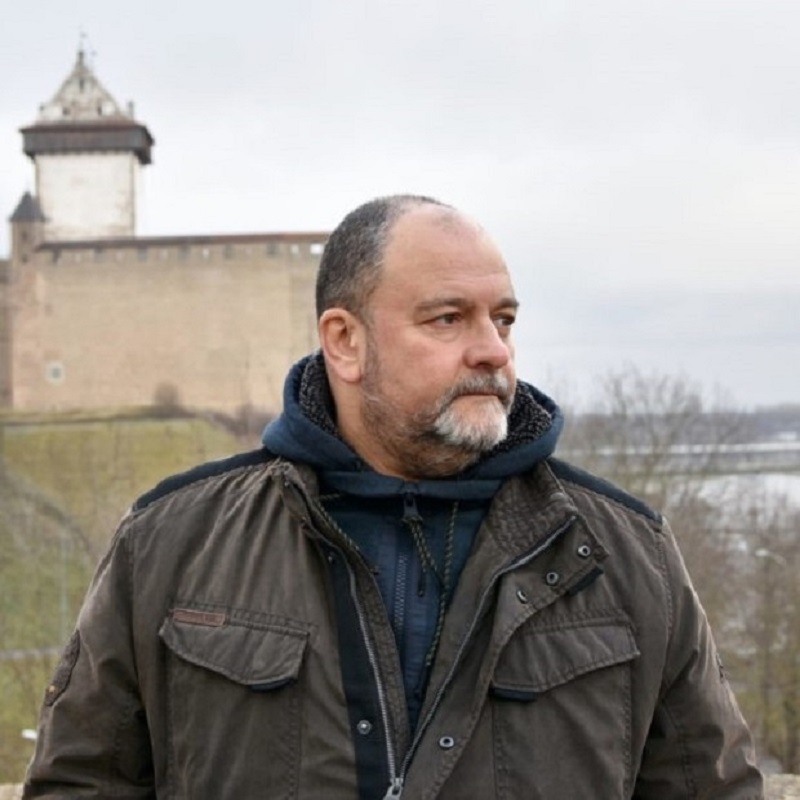
22 February 2022 – President Karis: A decisive moment in the European history
The Estonian president Alar Karis is on a visit to Kyiv today and had a meeting with his Ukrainian counterpart, Volodymyr Zelenskyy, this afternoon.
Karis described the crisis as “a decisive moment” in the European history. “President Putin will answer to the future generations, for his violent actions. Also, we, European and Western leaders, have the responsibility to step up to our values, our commitment to Europe united and at peace,” Karis noted at a press conference in Kyiv.
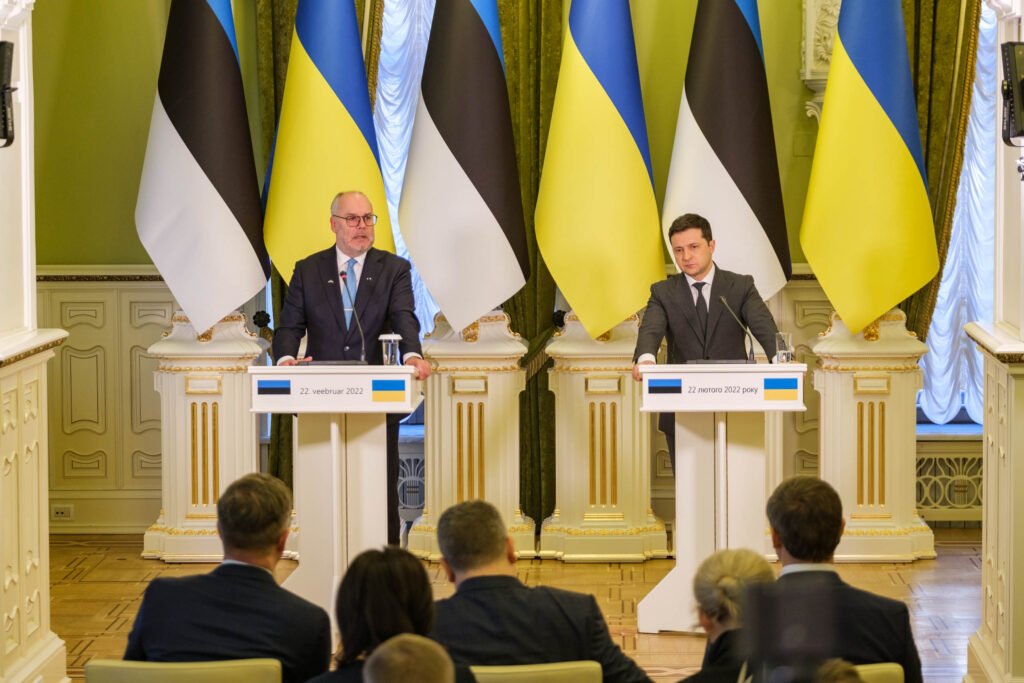
“It is our duty to protect our common values and the democracy we all helped to build. A threat to Ukraine is a threat to the security of Europe.
“The minimum we can do is to step up our practical support to Ukraine, which Estonia has done and will continue to do. In the EU, we will deliver on a massive package of sanctions and do so swiftly and decisively. But most importantly we must keep the door to EU and NATO open for Ukraine and we must have concrete next steps for further cooperation and integration”.
Karis said that Estonia “will continue to support Ukraine in every possible way” and “will continue helping to build its military capabilities to stand against the aggression”.

22 February 2022 – Foreign minister: Estonia would increase humanitarian aid to Ukraine
The Estonian foreign minister, Eva-Maria Liimets, announced that Estonia would increase humanitarian aid to Ukraine and “soon” a shipment would be dispatched to establish a camp to offer temporary shelter in case of a potential emergency.
A mobile field hospital made in Estonia was delivered recently to Ukraine in cooperation with Germany. Liimets added that Estonia was also prepared to share its expertise in strategic communication and cyber defence.
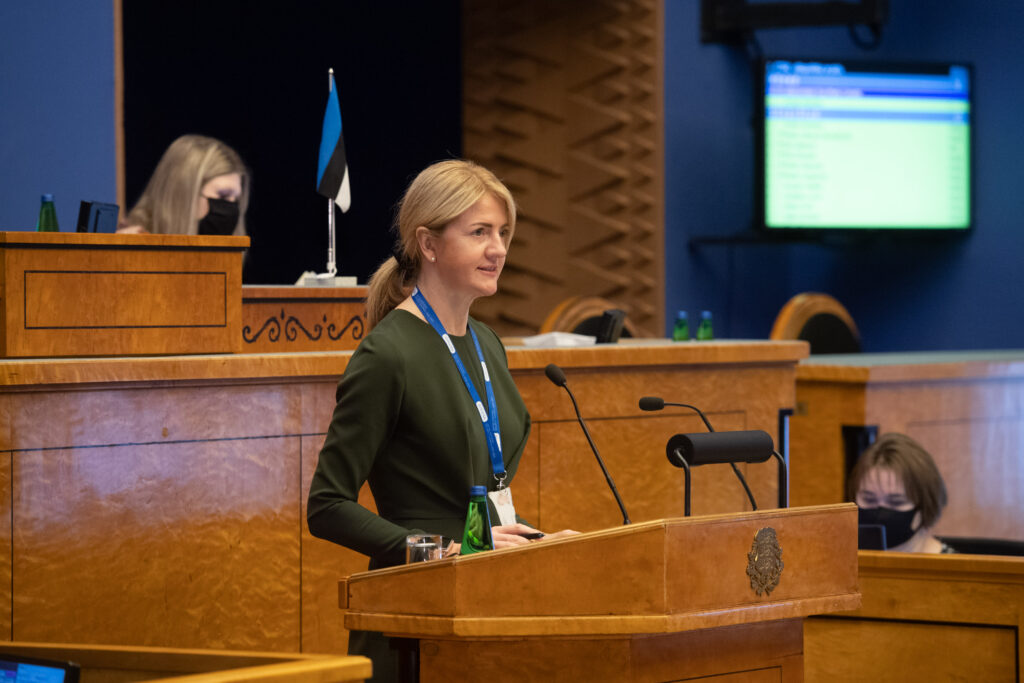
22 February 2022 – The Estonian Foreign Intelligence: Russia is ready for war
The Estonian Foreign Intelligence Service’s annual report warns that Russia has created conditions on the Ukrainian border to launch a large-scale military attack.
The war could be imminent as the military waits for the political elite to make their move. “In our assessment, the Russian Armed Forces are ready to embark a full-scale military operation against Ukraine from the second half of February. Once the military readiness has been achieved, only a political decision is required to launch the operation.”
There is no direct threat to Estonia at the moment, but the unfolding events have a great potential to destabilise the region in the future. “Although war in Ukraine would not pose an immediate military threat to Estonia or NATO, Russia’s political and military pressure on the Baltic states could increase in the long term should Russia achieve diplomatic and/or military success on the Ukraine issue,” the report notes.
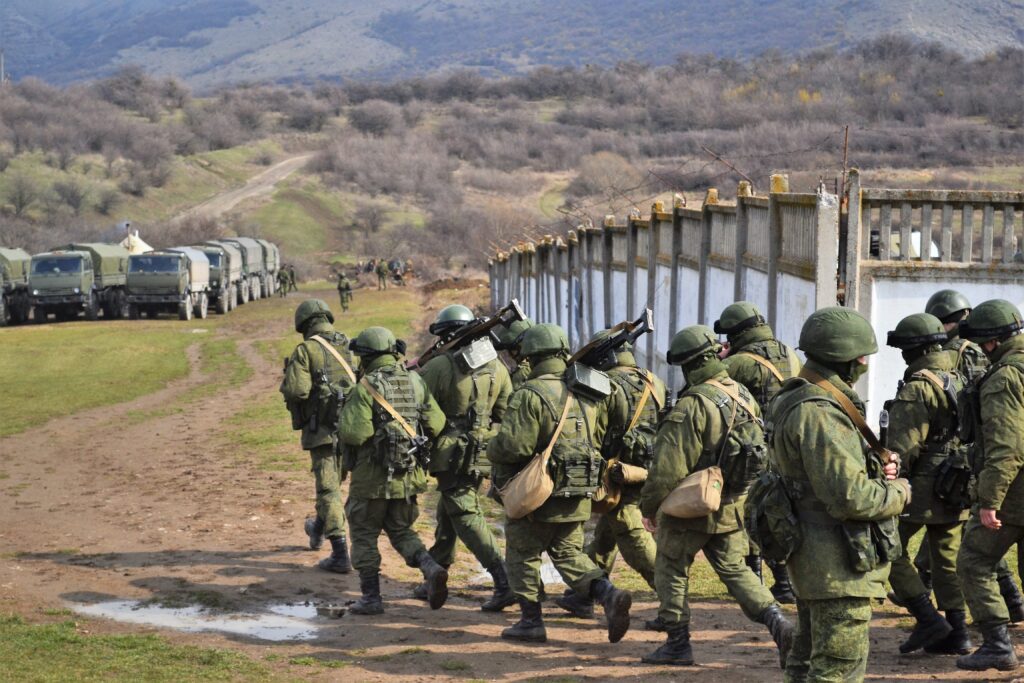
21 February 2022 – Former president Ilves: Why is Russia questioning Estonia’s independence?
Toomas Hendrik Ilves, a former president of Estonia, tweeted that “I presume in the morning, @MFAEstonia (the Estonian foreign ministry – editor) will summon the Russian ambassador and ask for an explanation about that speech and why Russia is questioning our independence” – presumably pointing to the Russian president Vladimir Putin’s earlier speech on how Ukraine was created by Bolshevist Russia and its author and architect was Vladimir Ilyich Lenin, the creator of the Soviet Union.
On can theoretically claim that also the Republic of Estonia was “created” by Bolshevist Russia in the sense that it was during the Bolshevist Russia time when Estonia declared its independence, fought its war of independence against Russia that it won and then sealed its statehood with the Tartu Peace Treaty – signed by the dignitaries of the Republic of Estonia and Bolshevist Russia.
Ilves also said, “Accepting apologies now here for all the patronizing nonsense from Western Europeans I had to listen to for 31 years telling me we Estonians were “paranoid” about Russian behavior.”
In addition, he rhetorically asked, “What recourse do Russians have now that 140 million of them just saw their president is batshit crazy?”
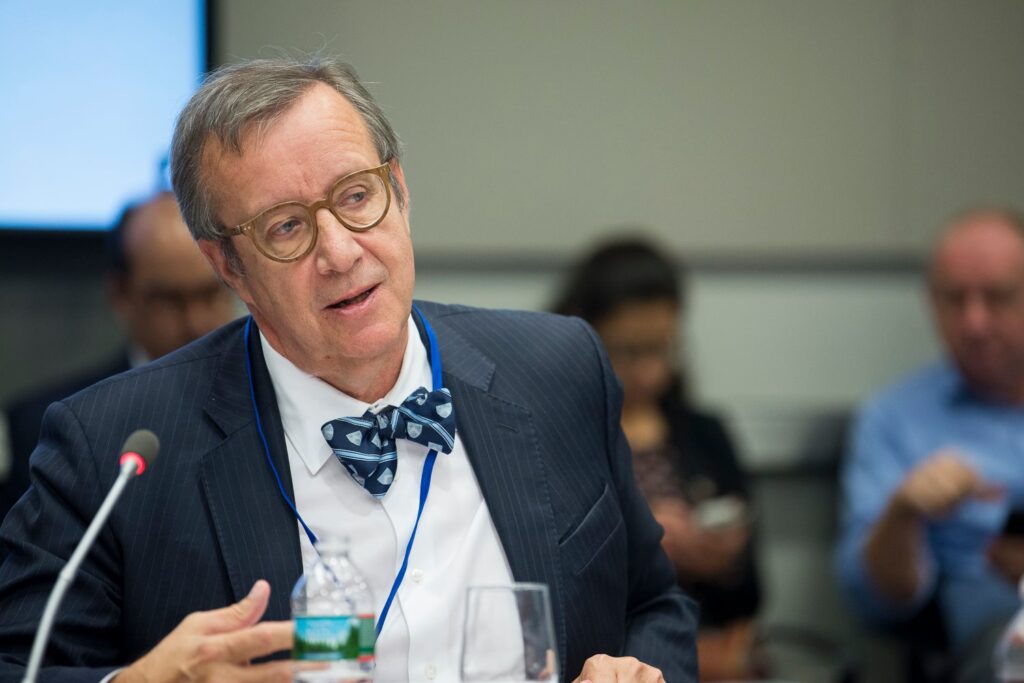
21 February 2022 – Defence minister Laanet: NATO must send more troops to eastern Europe
NATO must send thousands of additional troops to eastern Europe after Russia’s de facto annexation of Belarus, the Estonian defence minister Kalle Laanet told The Telegraph, a British daily broadsheet.
Laanet said that by keeping Russian forces in Belarus it was effectively made a vassal state of the Kremlin. He warned that being just “100 kilometres from Vilnius or from Warsaw” meant Russian troops had shortened their “readiness time” to invade.
The defence minister cautioned that if Putin did not push for an invasion in the “short term”, it would take place in the “long term,” and that Russia would keep troops on the border, possibly for years to come.
Laanet said that “Russia accepts only power” and “NATO has to strengthen the eastern flank,” adding that this could be done by sending thousands more troops and “extra capabilities” to neighbouring countries such as Latvia, Lithuania and Poland.
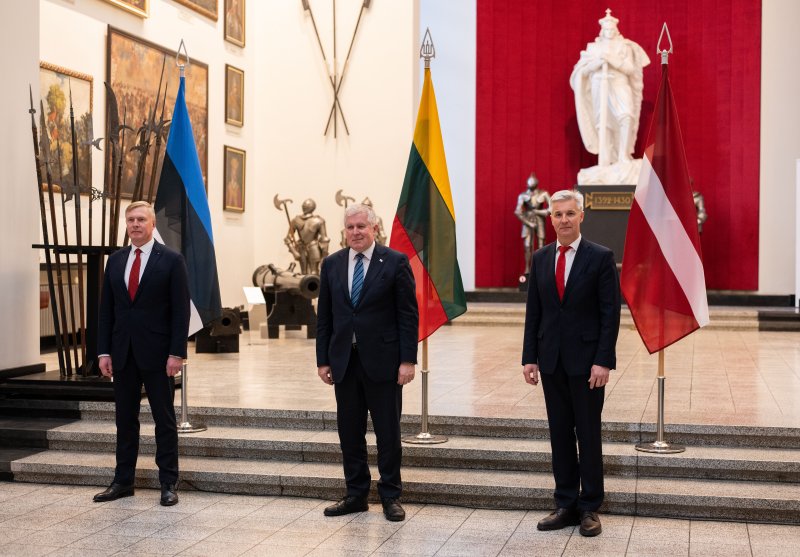
21 February 2022 – MP Reinsalu: The West needs to declare all sanctions immediately
Urmas Reinsalu, a member of the Estonian parliament and a former foreign minister, said it would be insanity if the West started to set the sanctions in separate packages – the sanctions need to be declared and applied immediately – as it was clearly promised earlier.
“All countries who have even a little conscience should tomorrow send additional weapons and supplies to Ukraine,” he noted, adding that Putin’s speech about Ukraine was “in essence a declaration of war against the entire West”.
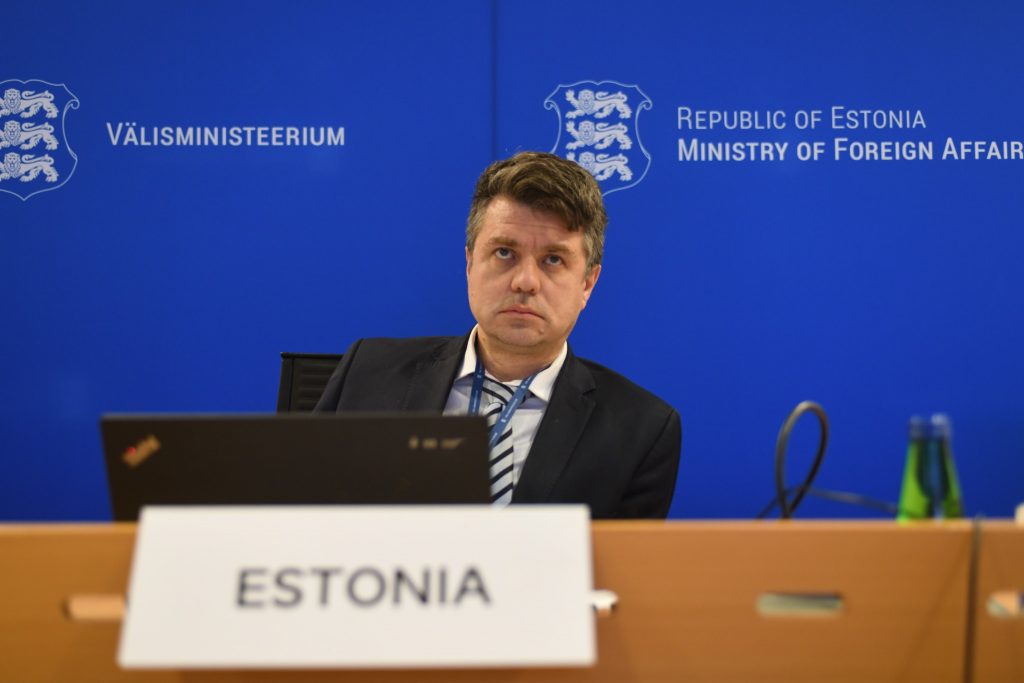
21 February 2022 – MEP Paet: Putin doesn’t care about international law
Urmas Paet, an Estonian member of the European Parliament (Reform Party) wrote on Facebook that Putin’s decision to create the people’s republics of Donetsk and Lugansk on the Ukrainian territory means solidifying the Russian occupation in Eastern Ukraine. “These obviously won’t be real countries. The people living there will be deprived of any normal chances of future, under Russian direct control, in a poor future-less province.”
“A wider problem is that [Russian president Vladimir] Putin has again shown that he doesn’t care about the international law and other countries’ standpoints. And that we should take into the account when considering any Russian plans. Putin saw that in Georgia, Syria and Ukraine, his impudence didn’t meet strong countermeasures and that has only spurred him.”
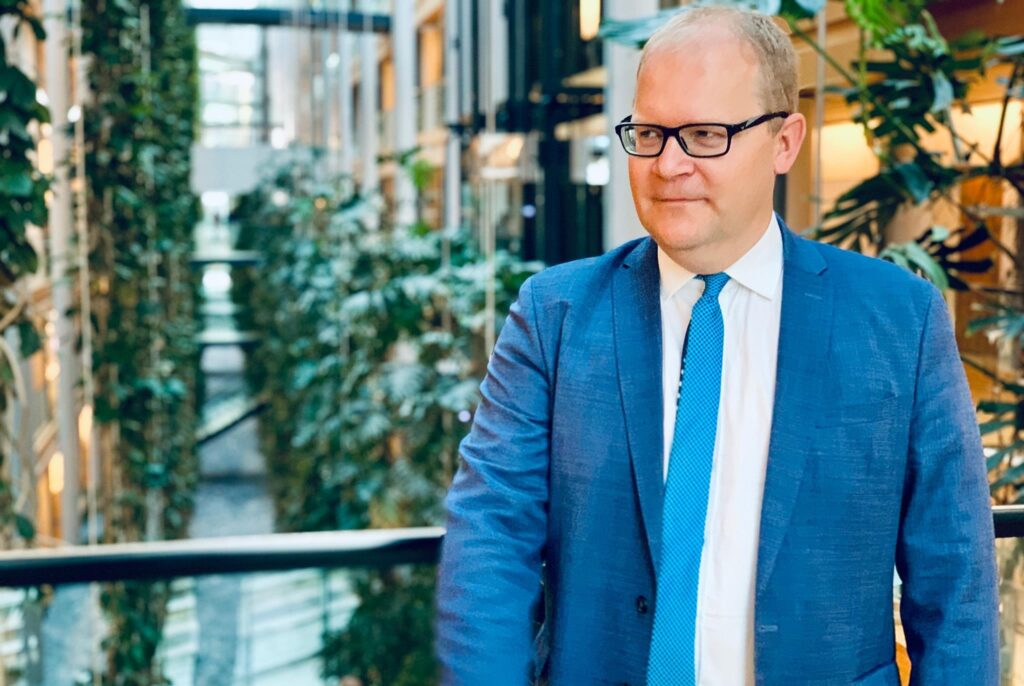
21 February 2022 – President Karis: Estonia will never recognise Putin’s decision to recognise the separatist Donetsk and Luhansk regions
“Russia tore the Minsk Agreements into pieces. This shows that Moscow’s aim is to deepen the conflict, not to solve it. President Putin’s decision to recognise the separatist Donetsk and Luhansk regions as states is gross and unjustifiable trampling on international law and Ukraine’s territorial integrity,” the Estonian president, Alar Karis, said in a statement, following Putin’s announcement.
“Estonia will never recognise this. The security crisis of the recent months has once again clearly shown who the aggressor is and who the victim is. The European Union’s response must be swift, effective and unified. This means sanctions,” Karis added.
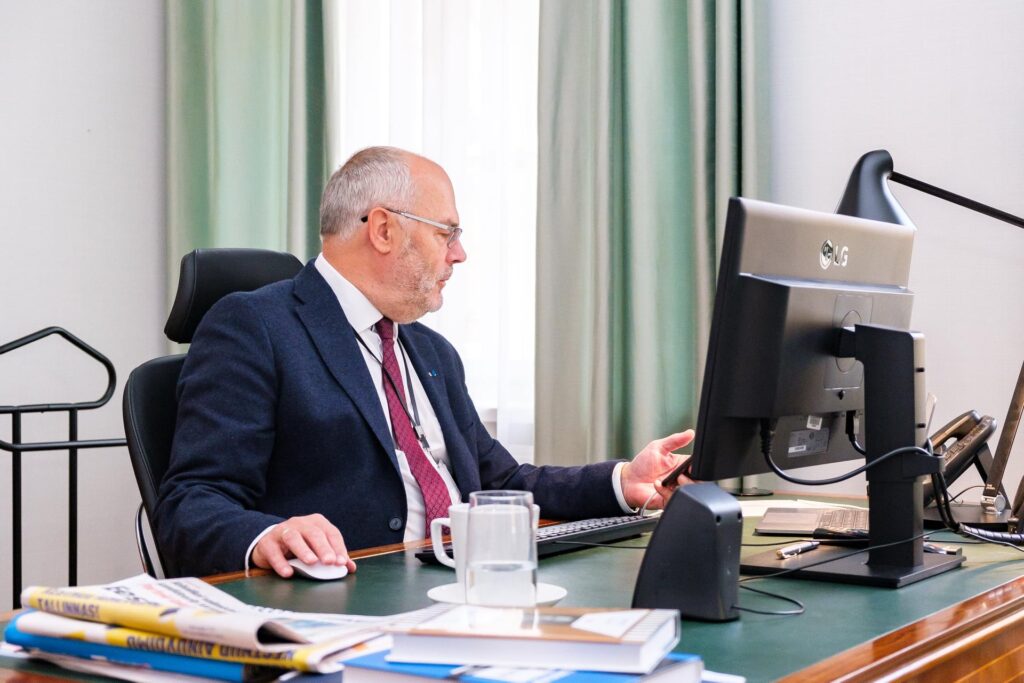
21 February 2022 – Prime minister Kallas: Strong sanctions by the European Union must follow
The Estonian prime minister, Kaja Kallas, said that the Kremlin’s decision is “a very serious infringement of the Minsk agreements and international law”.
“It also creates a pretext for expanding aggression against Ukraine. As a signatory of the Minsk agreement, the Russian Federation took a clear and direct obligation to work towards a peaceful resolution to the conflict,” Kallas noted in a statement.
“Strong sanctions by the European Union must follow the recognition of the so-called Donetsk and Luhansk republics by the Russian Federation,” the prime minister said, adding that she intended to discuss the matter with European leaders.
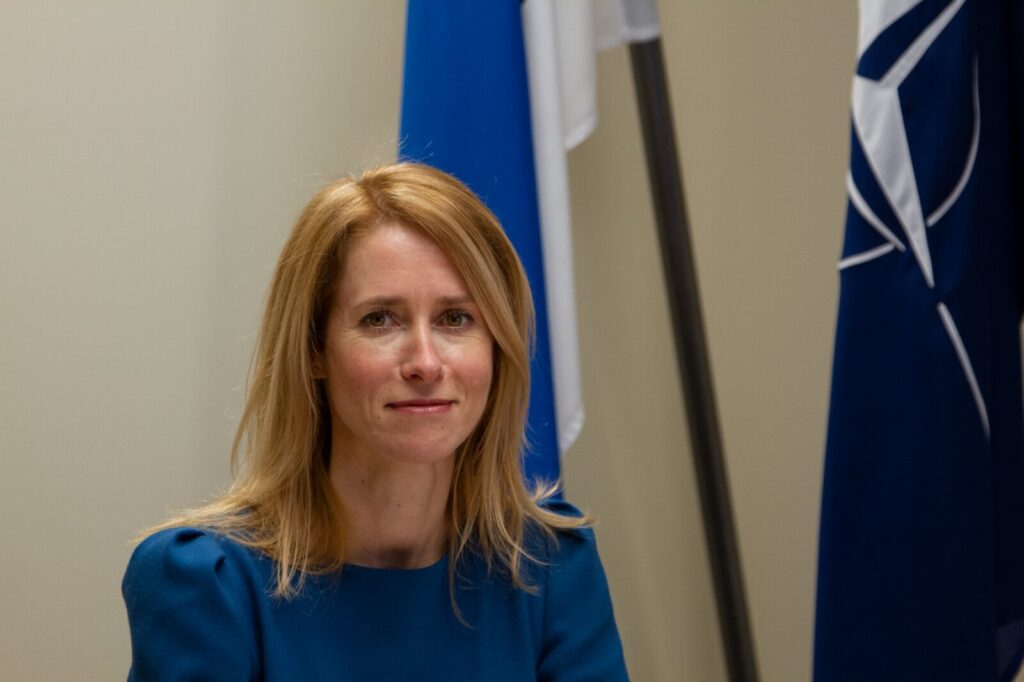
21 February 2022 – Estonia delivers anti-tank missiles to Ukraine
Missiles of anti-tank weapon system Javelin, donated by Estonian Defence Forces, arrived in Ukraine on 18 February, bolstering the country’s defensive military capabilities.
The governments of the three Baltic states – Estonia, Latvia and Lithuania – made a decision to donate the missiles in January, in the light of Russia’s military pressure in and around Ukraine.
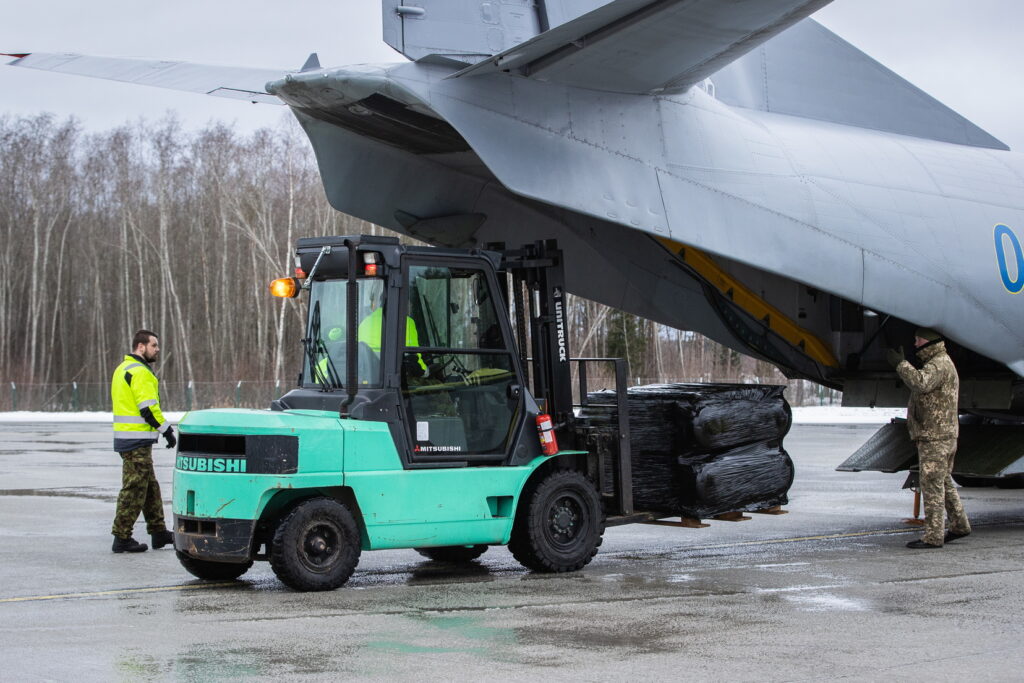
21 February 2022 – Kamala Harris in Munich: We stand with Estonia, Latvia and Lithuania
The US vice president, Kamala Harris, on 18 February in Munich, Germany, assured the leaders of Estonia, Latvia and Lithuania that the United States stood with them in the face of the possible threat from Russia, and that the US remained committed to the collective defence article of NATO.
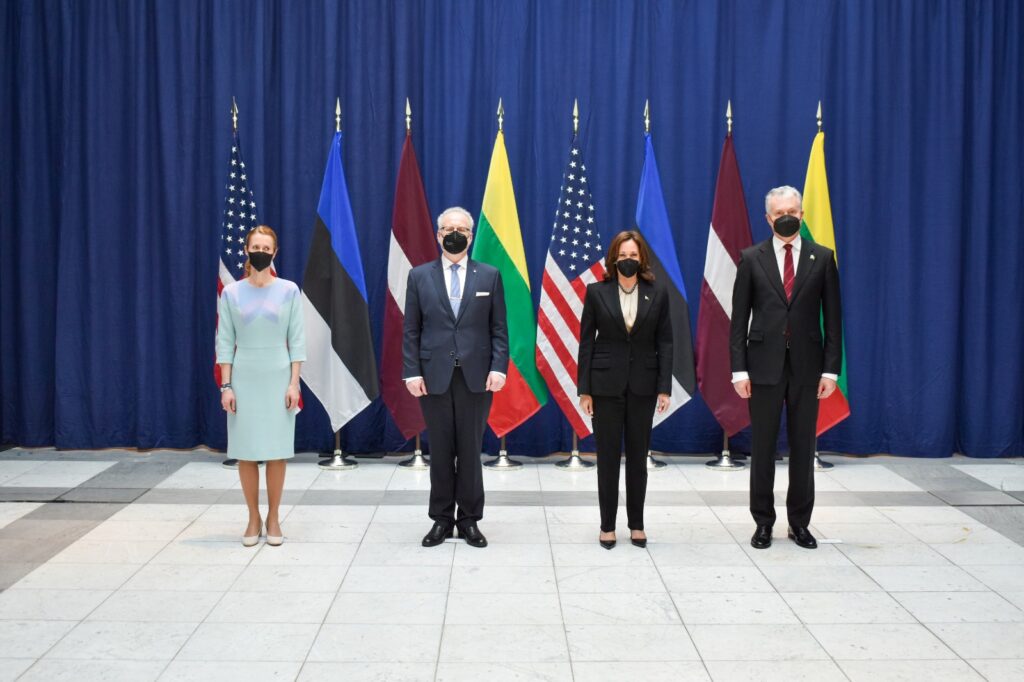
21 February 2022 – The UK to deploy 850 more soldiers to Estonia
The United Kingdom will deploy about 850 more soldiers to Estonia, in response to the Russian tensions with Ukraine and the Baltic states; the soldiers will complement the 1,200-strong British-led NATO battle group already stationed in the country.
21 February 2022 – Estonia recommends avoiding travelling to Ukraine, allocates money for Ukraine’s assistance
The Estonian foreign ministry is recommending avoiding non-essential travel to Ukraine due to the Russian threat of war against the country; it also allocated €351,700 to help the people living near the line of contact in eastern Ukraine.

21 February 2022 – US jets deployed to Estonia to bolster NATO defense against possible Russian Ukraine invasion
In late January, six American fighter jets arrived in Estonia at the Ämari Air Base to support the Baltic Air Policing Mission at a time when Russia is threatening Ukraine.

21 February 2022 – Estonia to spend an additional €380 million on national defence
Facing Kremlin’s threats, the Estonian government in January announced it will spend an additional €380 million on national defence “during the upcoming years”; the money is a significant boost to the country’s annual defence budget of about €650 million.

21 February 2022 – NATO head: There will be no armed attack against Estonia
The secretary-general of NATO, Jens Stoltenberg, said on 13 January at a press conference after meeting with the Estonian president, Alar Karis, that the purpose of the alliance’s military presence in Estonia and other countries is to send a clear message of deterrence.
“And there will be no armed attack against Estonia or any other NATO ally, just because together we represent 50% of the world’s military might. And our unity is our greatest strength and standing together is the best way to deter and aggression against any NATO ally, including Estonia,” he added.
“For the first time in our history, we have combat ready battlegroups not only in Estonia, but also in Lithuania, Latvia and Poland. We have air policing. We have more maritime presence. So there is more presence on the ground, at sea and in the air.”
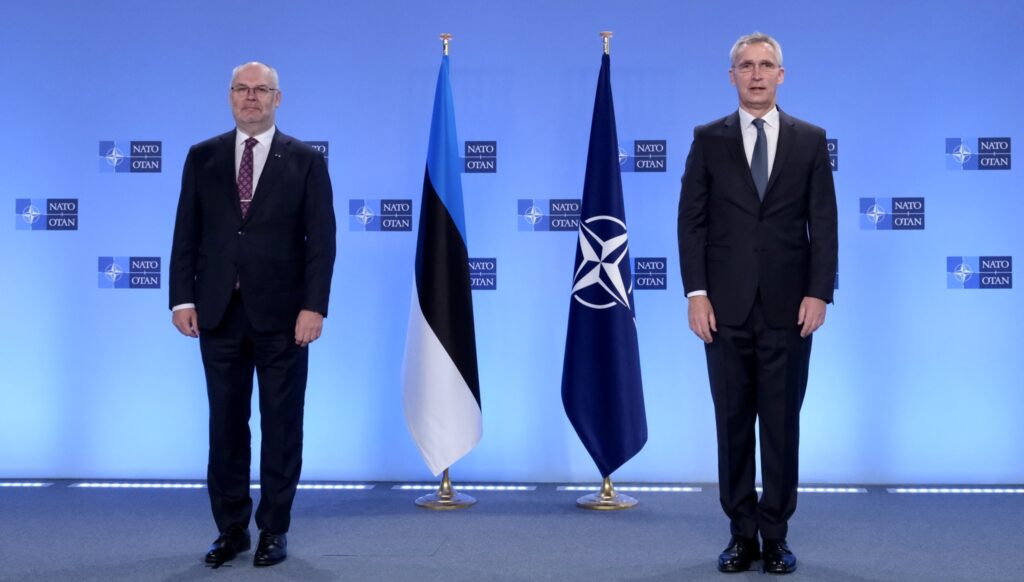
21 February 2022 – Moscow demands: No NATO troops in Estonia without Russia’s explicit permission
In December 2021, the Russian foreign ministry published two documents of its vision on how Moscow’s relationship with NATO should look like; one of the demands to the alliance is that no NATO troops can be deployed in countries that weren’t NATO members before 1997 – including Estonia – without Russia’s explicit permission.

